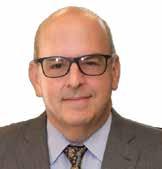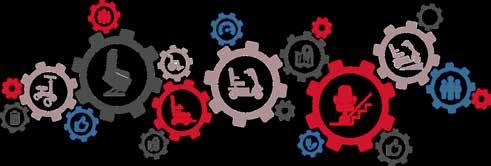

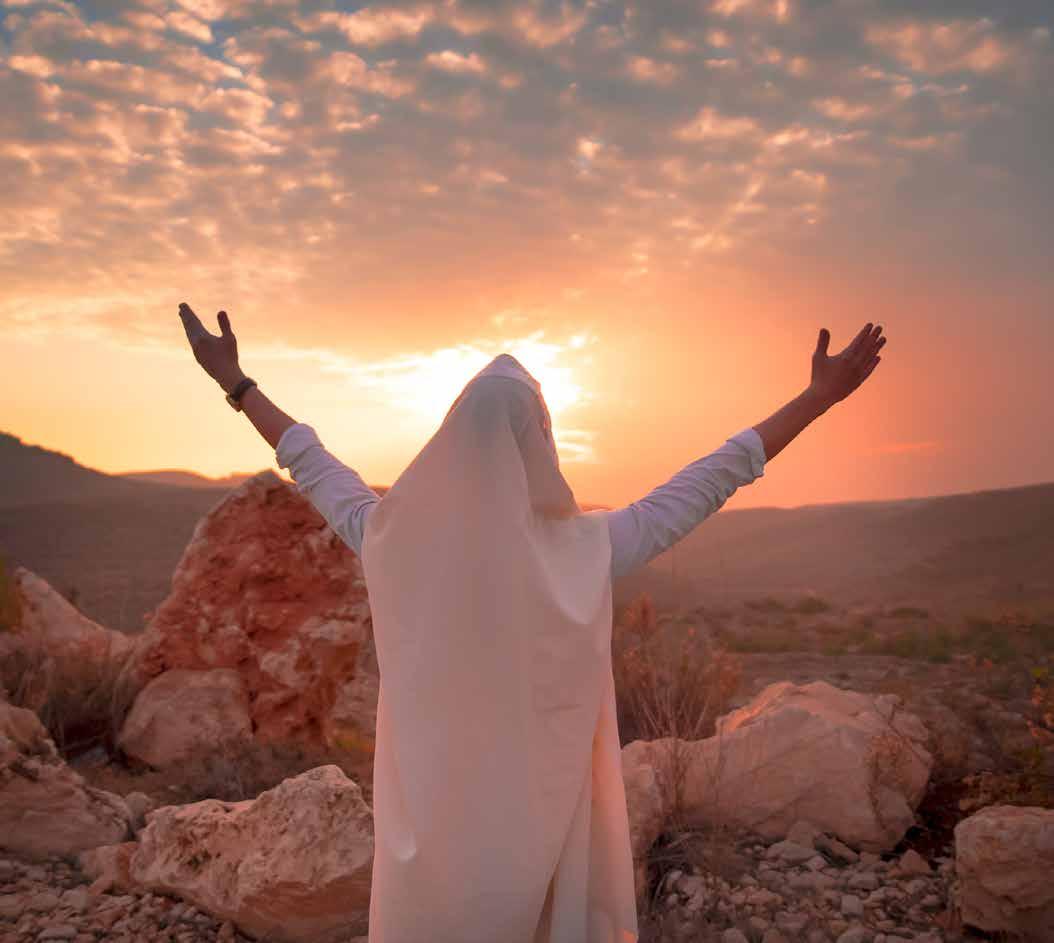
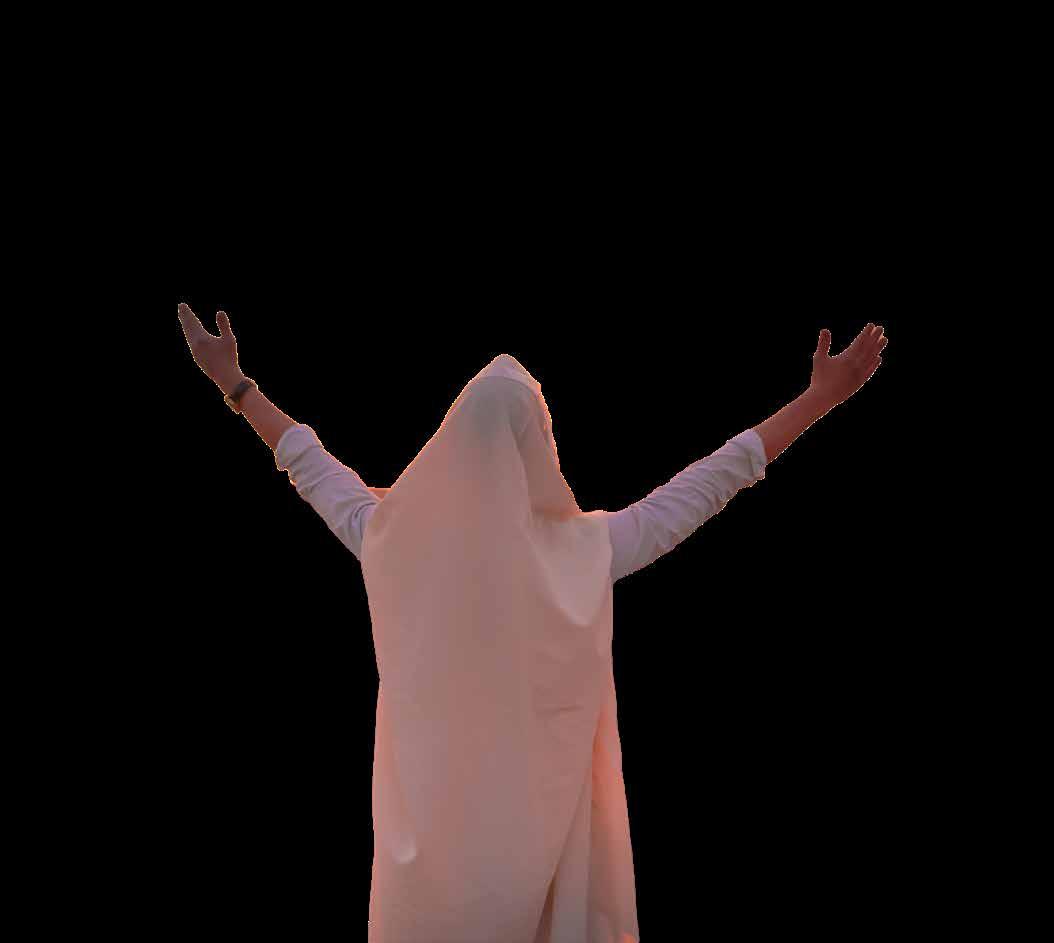







Atlanta has been part of my story since I was three months old, and nothing brings me more joy than helping others discover their place in this city I love. With almost 7,000 sellers and buyers proudly served, my team delivers results with heart, hustle, and hometown pride.
"Zac Did It Again!" speaks to our consistency and our clients' confidence. Discover for yourself why we’re Atlanta’s Favorite Real Estate Team!
Zac Pasmanick, Team Leader ZacSellsAtlanta.com 404-564-7272 | zac@zac.biz We’re Hiring! We have two open opportunities for a coachable agent with a great attitude and a strong commitment to customer service.





PUBLISHER
MICHAEL A. MORRIS michael@atljewishtimes.com
EDITOR & MANAGING PUBLISHER
KAYLENE LADINSKY kaylene@atljewishtimes.com
Execuitive Assistant
RONIT FRANCO-PINSKY ronit@atljewishtimes.com
EDITORIAL
Managing Editor
SASHA HELLER sasha@atljewishtimes.com
Staff Writer & Proofreader
FRAN PUTNEY fran@atljewishtimes.com
Interim Online Content Coordinator
ROBERT GARBER robbie@atljewishtimes.com
CONTRIBUTORS THIS ISSUE
AARON TROODLER
BOB BAHR
CHANA SHAPIRO
DAVE SCHECHTER
DAVID OSTROWSKY
MARCIA CALLER JAFFE
RABBI RICHARD BAROFF DD
ROBYN SPIZMAN GERSON STAN GARNET
ADVERTISING
Senior Account Manager & Team Supervisor
MICHAL BONELL michal@atljewishtimes.com
Account Manager
ILYSSA KLEIN ilyssa@atljewishtimes.com
CREATIVE & DESIGN
Creative Director
LILLI JENNISON lilli@atljewishtimes.com
COMMUNITY ENGAGEMENT
Events Director
JACQUELINE MORRIS jacqueline@atlantajewishlifefoundation.com
Atlanta Jewish Connector Coordinator DIANA COLE diana@atljewishtimes.com
GENERAL OFFICE
ROBIN FREEDMAN info@atljewishtimes.com 404-883-2130
Distribution Manager LOU LADINSKY lou@atljewishtimes.com



By Bob Bahr
On the Sunday evening before the beginning of Rosh Hashanah, a crowd of about a hundred people filled the firstfloor meeting room of The Dupree Building in Sandy Springs. Instead of the usual hubbub of a gathering like this, there was silence. Eyes were downcast and softly focused on an imaginary spot on the carpeted floor in front of each of them. In the quiet of the room, each focused silently on the rise and fall of their breathing.
At the front of the room, Rabbi Josh Feigelson, who leads the Institute for Jewish Spirituality, a national organization based in Philadelphia, told the group that they might want to think of their spine as more than just another body structure. It might instead remind them of the Biblical ladder that Jacob imagined in the Book of Genesis, “grounded in the earth but ascending up toward heaven. With your posture convey that you’re awake and aware.”
The silence that filled the room and the brief attempt to quiet the mind were an
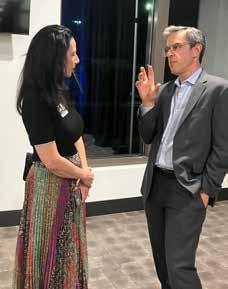

introduction to a new program being introduced by the Institute that seeks to revitalize the practice of Jewish Meditation.
Rabbi Feigelson told the gathering
that this contemplative practice of turning inward, if done consistently, could create a new relationship with the divine presence.
“The Divine is actually living in us and living through us,” Rabbi Feigelson pointed out. “When we say that we are created in the image of G-d, we’re not just

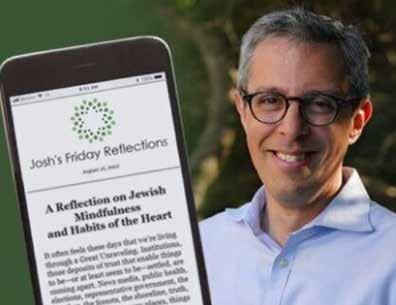
saying that, in our meditation we’re really feeling it.”
For those who signed up for the soldout event, the meditation, with its promise of more to come, signaled the launch of a 30-day program designed to carry them through the High Holidays to the observance of Sukkot and Simchat Torah that follows.
A cell phone app has been created to provide a daily reminder to reflect silently on a quote from Jewish spiritual teachings, such as the suggestion we set aside time each day to speak with G-d directly.
The app backs up the teaching with a suggestion that we spend three minutes in this “hitbodedut” or holy conversation, and jot down a single surprise that might have emerged from the practice.
The app and the communal program have the support of the Zalik Foundation, which often supports Jewish learning programs at The Dupree. The foundation’s senior program officer, Michael Fingerman, told the group the goal was personal growth.
“This short, simple practice can help shift your mindset, open your heart and deepen your gratitude. We hope that you can carry this with you throughout the day. Whatever you learn, we hope it will be something personal that will help anchor you during the spiritual reset that we hope you will experience.”
It was just such a spiritual overhaul that led Rabbi Feigelson to take the reins of the organization in 2020. He had been a Hillel leader at Northwestern University outside Chicago and later served as dean of students at the University of Chicago’s School for Divinity. He initially signed up for a three-year program at the

Institute for rabbis and cantors to help deepen their Jewish practice. Early in the program, his life changed.
“When I got home from my first retreat with the Institute,” Rabbi Feigelson pointed out, “I felt like this was the most amazing thing I’d ever done. And, if they wind up offering me the job to run this organization, I’ll take it. And that was almost six years ago.”
Altogether, almost 600 spiritual leaders have gone through the Institute’s long-term program, which claims to be “reshaping the landscape of American Judaism — one ‘mindful moment’ at a time.”
The latest cohort of the clergy leadership program includes Atlanta Rabbi Ariel Root Wolpe, who founded Ma’alot, a progressive Jewish community here. This Rosh Hashanah, the group hiked up Arabia Mountain in DeKalb County to hold a sundown service at the mountain’s summit.
Programs like this is what Rabbi Feigelson hopes to encourage here in the months ahead. The Institute provides a daily opportunity for a guided meditation online. It also provides a diverse offering of online courses and programs. This year, it has received important grants from the Jim Joseph Foundation and the Marcus Foundation to grow the Institute.
“We believe G- d is no longer this far away king or emperor who lives up there somewhere on a cloud throwing thunderbolts,” Rabbi Feigelson says. “G-d is actually in every one of us. And when the Divine is actually part of us, all of a sudden, everything we do is an opportunity to be present with a new way of living.” ì
Hunger is no way to spend their final years
As the war continues, Meir Panim is on the ground every day responding to urgent needs. Critical social services are being cut, leaving tens of thousands of Holocaust Survivors without reliable access to food, medicine, or care. The reality is that 1 in 3 Holocaust Survivors can’t meet their basic needs, and 2.6 million Israelis are facing food insecurity.
Since 2025 began, we have delivered over 600,000 hot meals and 100,000 care packages, and provided thousands of prepaid grocery cards so survivors can shop with dignity. Please give now to help them celebrate Rosh Hashanah with the dignity they deserve.
The following is a roundup of developing stories related to Israel’s ongoing conflicts with Hamas, Yemen, and Iran.
Israel launched a fresh wave of airstrikes against Hezbollah targets in southern Lebanon to prevent the terror group from rebuilding in the area.
Before the strikes, the IDF issued evacuation warnings for four sites in southern Lebanon, before later calling to clear the vicinity surrounding two additional buildings.
In the evacuation order, the IDF’s Arabic-language spokesman Col. Avichay Adraee said that the strikes had been ordered in response to Hezbollah’s “prohibited attempts to rebuild its activities in the area.”

Qatar’s Emir Sheikh Tamim bin Hamad al-Thani said that Israel had chosen war over the return of its remaining 48 hostages, and that its “treacherous” Sept. 9 attack on the Hamas leadership in Doha was an attempt to derail the Qatari-mediated Gaza hostage-ceasefire talks.
In his address to the UN General Assembly in New York, al-Thani accused Israel of genocide in Gaza and said Prime Minister Benjamin Netanyahu sees the Gaza war as “an opportunity to expand settlements.”

He published maps of the targeted buildings, calling residents and those close by to evacuate “immediately and distance yourselves from them by no less than 500 meters.”
The strikes were carried out in two main waves following evacuation warnings to residents of Mays al-Jabal, Kfar Tebnit, Dibbin, Chehabiyeh, and Burj Qalaouiyah.
Lebanon’s state-run National News Agency said roads leading out of Kfar Tebnit were full of people who had left their homes ahead of the attacks.
It said that the strikes had caused material damage to the targeted areas.
To read the full story, please visit: https://www.atlantajewishtimes.com/israelistrikes-in-lebanon-target-hezbollahs-elite-radwan-force/
Iran has begun rebuilding missile-production sites targeted by Israel during its 12-day war in June, satellite images analyzed by The Associated Press show, but a key component is likely still missing — the large mixers needed to produce solid fuel for the weapons.

Reconstituting the missile program is crucial for the Islamic Republic, which believes another round of war with Israel may happen. The missiles are one of Iran’s few military deterrents after the war decimated its air defense systems — something that Tehran long has insisted will never be included in negotiations with the West.
Missile experts told AP that obtaining the mixers is a goal for Tehran, particularly as it prepares for possible United Nations sanctions to be reimposed on the country later this month. The sanctions would penalize any development of the missile program, among other measures. Iranian President Masoud Pezeshkian is due to address the United Nations General Assembly.
To read the full story, please visit: https://www.atlantajewishtimes.com/iran-hasstarted-rebuilding-key-missile-sites-hit-by-israel/
UN Secretary General Antonio Guterres and the leaders of Jordan and Turkey also condemned Israel over its conduct in Gaza, with Jordan’s King Abdullah devoting almost his entire address to a denunciation of the government of Prime Minister Benjamin Netanyahu, which he said was not a partner for peace and whose “Greater Israel” calls threatened the sovereignty and territorial integrity of Israel’s neighbors.
In sharp contrast, the president of Indonesia — the world’s most populous Muslim nation, which has no formal relations with Israel — said the world must respect Israel’s right to security and ended his speech with the Hebrew benediction “Shalom.”
To read the full story, please visit: https://www.atlantajewishtimes.com/qatarjordan-denounce-netanyahu-as-warmonger-regional-threat/
The Israeli Air Force carried out strikes against Houthi military sites in Yemen’s capital Sanaa, in response to the Iran-backed group’s repeated attacks on Israel, including a drone attack on Eilat a day prior.
The Israel Defense Forces said it struck seven targets belonging to the Houthis’ “security and intelligence apparatus” and army, including a top military headquarters. Defense Minister Israel Katz said the “powerful” strikes killed “many dozens of Houthi terror operatives and destroyed stockpiles of UAVs and weaponry.”
Hours later, the Houthis fired a ballistic missile that set off sirens across central Israel, sending hundreds of thousands of people to bomb shelters.

The military said it successfully intercepted the missile. There were no immediate reports of impacts or injuries.
The Houthis said the strikes killed at least eight people and wounded more than 140.
To read the full story, please visit: https://www.atlantajewishtimes.com/iaf-jetsbomb-houthi-military-sites-in-yemen/ ì
While Southern hospitality and charm seem hard to find in some parts, you’ll experience them every day at Somerby Sandy Springs Senior Living. Let us take care of the daily chores while you explore the best of nearby north Atlanta. Or stay home and enjoy our beautiful, multi-lifestyle community with a recent multi-million dollar renovation. Best of all, you can enjoy engaging events, endearing neighbors, and a chef prepared meal that’ll remind you of how charming life can be at Somerby.
Experience a superior level of hospitality and attention to detail that some have all but forgotten. Call (256) 579-0001 to schedule your personal visit.
Independent & Assisted Living & Memory Care
25 Glenlake Pkwy NE, Sandy Springs, GA 30328 (256) 579-0001 | SomerbySandySprings.com



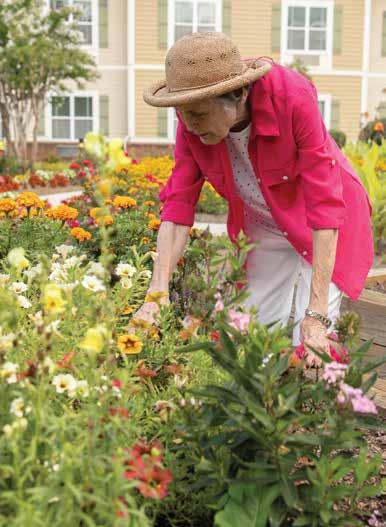

May this holy season and Yom Kippur be blessed and meaningful to you and your family.


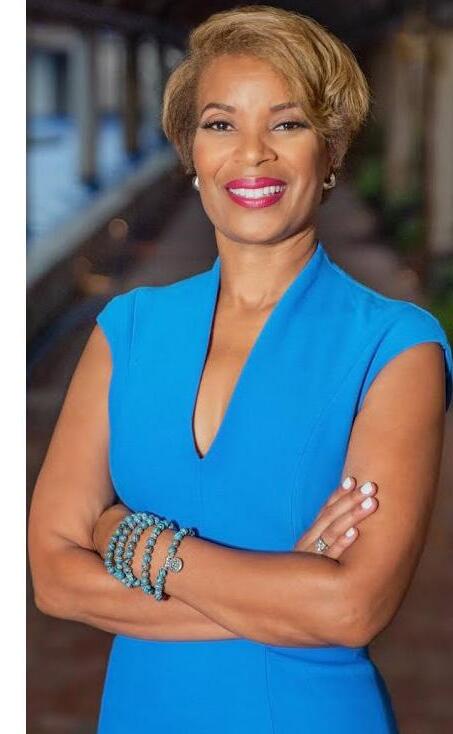



By Sasha Heller
A recent survey conducted by the Viterbi Family Center for Public Opinion and Policy Research at the Israel Democracy Institute garnered mixed results regarding the public’s outlook on Israel heading into the Jewish new year.
sample of the Israeli population aged 18 and older, with 600 Jewish and 150 Arab interviewees taking part.
The survey, conducted between Aug. 24-28, was based on a representative
According to the survey, approximately 71 percent believe that the current
Israeli national mood is fairly poor or very poor. The survey found 73 percent of Jews interviewed felt this way with 58 percent of Arabs sharing the same sentiment. The survey found that political af-



Six hundred Jews and 150 Israeli Arabs took part in the survey // Photo by Mendy Hachtman/Flash90
filiation was not a factor with the following results – Left, 93 percent; Center, 89 percent; and Right, 61 percent.
The results for personal mood were much more favorable than the national mood – for the Jewish participants, 48 percent as fairly poor or very poor, and 49.5 percent as fairly good or very good. Among Arab interviewees, the results were 39 percent as fairly poor or very poor, and 52 percent as fairly good or very good.
Breaking down for political affiliations regarding personal mood heading into the new year, the Right registered 35 percent as fairly poor or very poor, Left as 69 percent, and Center as 61 percent.
The survey notes, “We cross-tabulated the responses to both questions in the entire sample and found that among those who rate the national mood as fairly poor or very poor, the majority (62 percent) give the same assessment of their personal mood. By contrast, among those who rate the national mood as fairly good or very good, an even larger majority (89 percent) also define their personal mood positively. In other words, assessments at one level influence assessments at the other.”
The survey continues, “Our findings show a significant decline in the total
sample in the share of respondents who expect the upcoming Jewish year to be worse than the year now ending — from 42 percent last year to just 24.5 percent this year. Concurrently, we found a rise in the share of those who expect next year to be better (from 23 percent to 33 percent) and those who expect it to be similar to last year (from 22 percent to 30 percent).
“Breaking down responses in the Jewish sample by political orientation reveals that on the Left, the largest share of respondents expects the upcoming year to be worse than last year. Those in the Center are more or less evenly divided among the three possibilities, while on the Right, the largest share expects next year to be better than last.”
The survey was conducted via the Internet and by telephone (to include groups that are under-represented on the Internet) with 600 men and women interviewed in Hebrew and 150 in Arabic, constituting a nationally representative sample of the adult population in Israel aged 18 and over. The maximum sampling error was ±3.58 percent at a confidence level of 95 percent. Field work was carried out by Shiluv I2R. The full data file can be found at: https://dataisrael.idi.org.il. ì

By Marcia Caller Jaffe
Matthew Bronfman, principal and CEO of Jamestown Properties, was honored at the Anti-Defamation League (ADL) Torch of Liberty Award Dinner at Colony Square’s Politan Row, appropriately so, as one of the company’s “home turf” examples of forming desirable community spaces. On Thursday, Sept. 18, the restaurants in Politan Row “runneth over” with fare like pizza, mac and cheese, Indian samosas, and sushi, for starters, with a central open bar.
During the pre-function hour, close friends and family mingled with Bronfman’s family and inner circle, many of whom were featured later in a video shown in the more formal program. Fans were led from the food areas to a large white tent in center court where Bronfman was celebrated.
Mom Vicki Bronfman recalled that, as a child Matt wanted to go to services with his Bubbie. “He listened. We thought he was going to be a rabbi.”
Sister Shana Sinko recalled that he was a protective older brother and always had an opinion. Son, Micah, said that his dad gave advice by “breaking down risk scenarios and best options,”
Son, Sam, added, “He uplifted thousands of lives.”
Daughter, Kyra, said her father taught her the importance of details, attentiveness, and caring.
Holocaust survivor Ben Walker, Matt’s father-in-law, conveyed that Matt represents “rivers of goodness with his daily acts of kindness.”
The ceremony began with event cochair Dara Grant welcoming the crowd. Next up was ADL Southeast Regional Board Chair Lauren Estrin who began, “This is a scary time to send our kids to school as a Jewish mother” concerned about collective safety and antisemitic comments.
A particularly elucidating part of the program was a fireside chat “Why ADL? Why Now?” with George Selim, executive VP and chief engagement officer for ADL, and Jessie Rosenberg, senior VP of development and marketing, who explained the important work ADL is doing on college campuses at the forefront for confronting antisemitism.
Rosenberg explained the ADL’s “report card,” which is publicly available outlining which colleges are doing a good job. Vanderbilt University, whose president was soon to receive an award for his efforts, was mentioned as a top scor-




ing “A” school. The University of Georgia (mostly peaceful with no encampments) was also among the top.
Rosenberg said, “The important part is that colleges want to improve, and we are available to help them raise their ranking. The ADL is also planting seeds in colleges across the Gulf and Israel to find ways to work together in the wake of the Abraham Accords as a legacy project.”
Event co-chair and president of Central Atlanta progress, AJ Robinson, introduced Bronfman. He began by recognizing Bronfman’s ability to create vibrant communities like Ponce City Market and Colony Square.
“I’ve had a front row seat into Matt’s wisdom, and relentless commitment during this critical time … and why the Torch of Liberty Award is so attached to Bronfman’s leadership.”
Ever convivial, Bronfman began by saying he didn’t have a fancy bar mitzvah, and this event felt a little like a second bar mitzvah with wonderful testimonials.
“At my first bar mitzvah, I was awkward with braces. Now I’m awkward and balding and look forward to doing the ‘Hora’ and the ‘Electric Slide’ dance with my mother.”
He recognized his wife, Ronit, for being super cute and helping him question
his assumptions and re-think important concepts. He reinforced that the theme for Jamestown is to create special places as community hubs where people like to congregate.
“My ‘day job’ and hobbies are the same in that I try to build community. But since … Oct. 7, my focus has changed, and I am more aware of people trying to attack the communities I try to build. That is where ADL is so valuable given its focus on those trying to attack our communities.”
During the pre-function hour, real estate mogul Norman Radoff exclaimed, “Matt is fearless, innovative and an inspiring leader in our industry.”
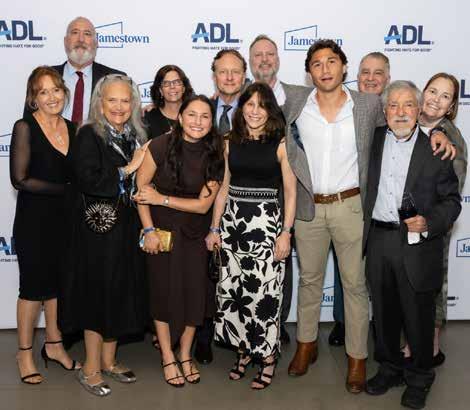
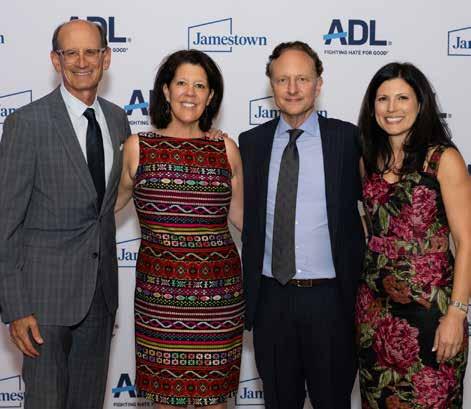
Arnie Silverman told the AJT that he supported Bronfman along with Mike Philips in their vision for the extremely
successful Ponce City Market. Buckhead Coalition president Jonathan Rodbell exclaimed, “No one in real estate does it like
Matt Bronfman!” Terri Bonoff summed it up, “When Matt was Federation Chair, I came to
appreciate his contagious enthusiasm powered by his visionary leadership - an unusual combination.” ì


By Dave Schechter
Jewish Democrat Debra Shigley was defeated Sept. 23 in her bid to represent state Senate District 21, which takes in a large portion of Cherokee County and part of northern Fulton County.
Shigley, the leading vote getter against six Republicans in an open primary Aug. 26, lost a runoff to Republican Jason Dickerson by a margin of 61.5 percent to 38.5 percent.
Voter turnout was 21 percent, with nearly 31,000 votes cast. Turnout for the primary was 14 percent.
Dickerson received 71.6 percent of the vote in Cherokee County, creating a margin large enough to withstand Shigley winning 54.7 percent of the vote in Fulton County.
“I am incredibly proud of the campaign our team ran and thankful for every single person who volunteered their time fighting for a better Georgia,” Shigley said. “In May, we got off the sidelines and stood up, offering a vision for a better future for our children and our families. Despite the results, I am both proud

and grateful for our efforts and will continue the work required to make the 21st District a better place for everyone to work and live in.”
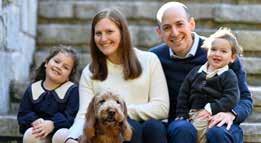
The future of Sandy Springs is on the ballot this fall, and Andrew Chinsky respectfully asks for your vote for Sandy Springs City Council District 6.
If you live near Chastain Park, Fountain Oaks, Holy Innocents, Temple Sinai, Heard’s Ferry Elementary, or Riverwood High School, chances are, you can Vote Chinsky! Early voting is available from October 14 - 31, and Election Day is November 4.
Andrew is the only Jewish candidate running for any of the City Council races, and he and his wife, Allie (Maron), have long been part of our community from day school to today. All four generations of their family living here are continuing that tradition.

Andrew holds a bachelor’s degree in public policy from the University of Michigan and a law degree from Harvard Law School which, combined with his participation in Leadership Perimeter and other community leadership programs, makes him uniquely qualified to hit the ground running from day one.
Andrew is running to bring a family perspective to City Council, because no one on City Council today has kids at home. Andrew will work to make sure the next generation of City leaders keep Sandy Springs moving forward–together.
Please visit www.andrewchinsky.com to learn more about the campaign.
Content by Chinsky For Sandy Springs
In a statement released Sept. 23, Dickerson said: “Conservatives in District 21 sent a strong message: woke liberal ideology has no place here. I’m looking forward to taking office and fulfilling their mandate to champion the America First values that make us the greatest state to live, work, and raise a family.”
The runoff was held on Rosh Hashanah, scheduling that drew the ire of the Jewish Community Relations Council of Atlanta, but that met the state election law that a runoff be held four weeks after the primary.
Shigley’s loss leaves Democratic state Rep. Esther Panitch as the only Jewish member of the Georgia General Assembly.
A single Jewish legislator accounts for 0.04 percent of the General Assembly. An estimated 1.3 percent of the state’s population is Jewish.
The 21st District seat opened in May when Republican Brandon Beach was appointed by President Donald Trump to be Treasurer of the United States. Beach, a staunch supporter of the president, had represented the district since 2013, winning re-election in 2024 with 70 percent of the vote.
Republicans currently hold a trifecta under the Gold Dome, with majorities in the House and Senate and Gov. Brian Kemp as the state’s chief executive. Republicans hold 100 of the 180 seats in the House and 33 out of 56 seats in the Senate.
State representatives and senators are paid $17,342 plus per diem annually for their part-time jobs. State Senate dis-
tricts average 191,000 residents and state House districts 59,500.
Dickerson spent approximately $750,000 of his own money in the primary and runoff races, the Atlanta Journal-Constitution reported. Shigley raised about $252,000.
Shigley had in-person campaign support from Democratic National Committee Chair Ken Martin, current Democratic gubernatorial candidates Geoff Duncan and Jason Esteves, former Democratic gubernatorial candidate Stacey Abrams, and Democratic U.S. Rep. Lucy McBath.
Dickerson’s endorsements included Republican Gov. Brian Kemp and Republican Lt. Gov. Burt Jones, who is seeking his party’s nomination to succeed Kemp.
In the primary, Shigley received 39.5 percent of the vote, trailed by Dickerson with 17.3 percent. The runoff was required because no candidate received a majority of the votes cast.
Shigley, 46, received her undergraduate degree from Harvard University and her law degree from Georgia State University. She has worked as an employment attorney and was co-founder of a company called Colour, a technologybased hair care service for women of color. She and her husband, Kevin, are the parents of five children.
In 2024, Shigley won the Democratic primary in House District 47 but was defeated in the general election by 12-term Rep. Jan Jones, the second-ranking Republican in the House, who received 62 percent of the vote. ì
By Marcia Caller Jaffe
Some called it a forum, others labeled it a debate, but on Sept. 14 at Elevate Church, four Sandy Springs mayoral candidates had a lot to “hash out” in front of 234 North Sandy Springs residents primarily from the Grogan’s Bluff subdivision.
Resident Gary Alexander served as the forum moderator. Current Mayor Rusty Paul took some heat as the challenging candidates Andy Bauman, Jody Reichel, and Dontaye Carter made points of diminishing what Paul had accomplished over his three terms, and that Sandy Springs was ripe for change. With his calming presence, Paul explained that he had the contacts, depth, and patience to accomplish goals with a steady hand.
Alexander began by cautioning candidates that they were in a House of G-d and to “watch your language.” He introduced the six districts in Sandy Springs, followed by each candidate’s opening statement.
Carter: His grandmother was a domestic in the area. His biggest concern is that “diversity” be given a seat at the table, property tax is too high, and although he believes in funding the police, each branch has limitations, and there needs to be more social services like safe places for children before police intervention. His wife, an obstetrician, has delivered close to 2,000 babies at Northside Hospital.
Bauman: Attends synagogue and walks his dog in Sandy Springs, is an attorney, has served on the City Council with experience in real estate. He felt that since the city is turning 21, it’s at an inflection point; and said Paul is more concerned about “taking credit,” and is not a mayor “for everyone. You deserve better.” Bauman’s wife is also a physician.
Paul: After the quality and safety of neighborhoods, nothing else matters for Paul. Too many rental apartments line Roswell Road and were built decades ago. He wants to create a Tax Allocation District to put money into parks and infrastructure. He successfully got water rates lowered.
Reichel: Started by saying she will be a full-, not part-time, mayor. She told of her success in getting funding for North Springs High School, and that she has hired an attorney for the formation of a Sandy Springs School District which “could save millions of dollars.” Comments came throughout the night about whether this requires a Constitutional
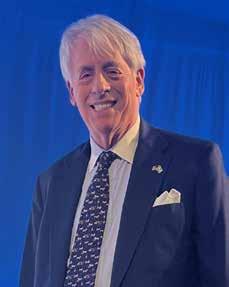


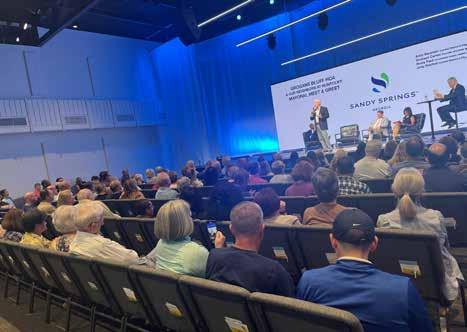
change. She stated that good schools attract families, and she will not accept “impossible.” She wants more retail and dining on the North End.
Alexander then posed a more specific topic of how to improve the North End. Carter went back to lacking diversity and introduced two Black residents in the audience. Bauman swiped at Paul for letting the City Center “suck the life out of the rest of Sandy Springs.”
Paul, who wants more apartments converted to condos, reminded the audience that it’s easy to have pipe dreams; but interest rates hurt some projects. He also felt that parent-led charter schools were a quicker way to uplift more quality
schools. Reichel accused Paul of blocking influencers from talking to her. She wants private-public partnerships to redevelop more mixed use, river trails, and “hundreds of empty housing units.”
Other swipes at Paul: Bauman said he was in seventh grade when Paul started in politics. Reichel said the studies conducted out of Pennsylvania about Sandy Springs being such a fine place to live were “fake.” She stated that Woodstock and Alpharetta were greater communities. Carter stated that Paul was shown to be vulnerable in the last election, which is why there are so many candidates now.
Grogan’s Bluff co-president Steve Feldman reignited the education is-
sue by complaining about the quality of a neighborhood public school, Ison Springs Elementary, forcing homeowners to factor private school tuition into home ownership. Reichel heralded back to getting a smaller school district. “We have 8,800 students in 10 schools. And forming a charter school is a heavy lift for parents. A lot goes into raising money and resources.”
Alexander concluded, “I was extremely encouraged by the standing room only attendance and the lively debates among the candidates. Many people in the north end of Sandy Springs didn’t know much about Andy Bauman, Jody Reichel or Dontaye Carter. Now, they do!” ì
By Marcia Caller Jaffe
Traditionally, as a pre-High Holiday event started 23 years ago by CPA and community leader Adrian Grant, Atlanta Scholars Kollel (ASK) sponsored yet another inspiring high-profile speaker at The Sinclair on Wednesday, Sept. 10.
This year’s headliner was bestselling author and international speaker Charlie Harary who has previously spoken at various venues in Atlanta. Known for his emotional delivery, Harary barely paused for air for his time upon the stage as he unwound a tale with a beginning, middle, and evolving paced end, all of which he tied into positioning for the High Holidays.
In the pre-event hour, Grant said, “I’m so proud that this event brings together Jewish people from all walks of life and levels of observance. We cherish the tradition as a kickoff for the High Holidays.”
Elaine and Larry Benuck said that they had previously seen Harary and came specifically to hear him again.
After a Mexican-style buffet by A Ko-

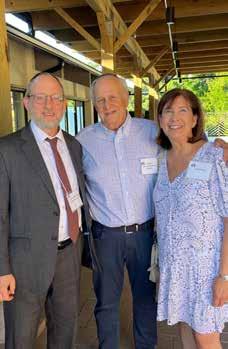

sher Touch Caterers (the Sinclair’s kosher option), Rabbi Doniel Pransky explained the uniqueness of Rosh Hashanah as the
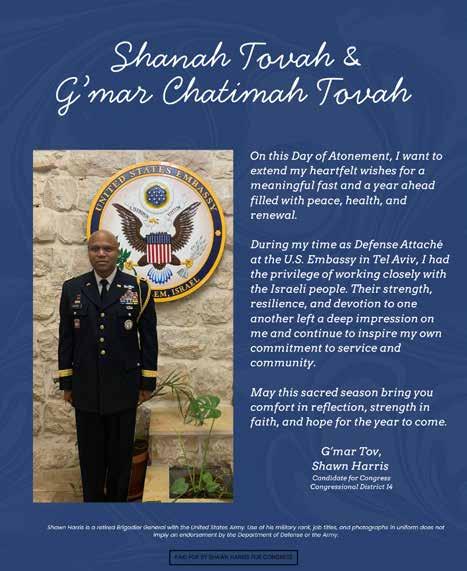
Days of Judgment for everyone, not just Jews.
“It’s an example of kindness that we are told in advance with time to prepare.”
Rabbi David Silverman, Kollel Dean, began with his appreciation for Adrian Grant and Ilene for her supporting role. Arlene Applerouth, who sponsored the event in memory of her late husband, Dr. Dan Applerouth, shared that he cared very deeply about Jewish causes and events, helping others through the practice of medicine, and his talented lighthearted parts about his singing voice and performing at an Atlanta Braves game.
Labor attorney Kenneth Winkler took the podium to introduce Harary, by saying, “Don’t let him convince you that he’s just a regular guy, he’s not.”
Harary prepared the audience to stick with his nontraditional presentation enveloped in a winding tale of a mutigenerational business founded by humble and clever Ellis Island immigrants, who built a furniture empire from the ground up, turned it over to their son at 40, then all repeated for next gen. The dilemma comes when the third-generation grandson gets stuck in the 2007 financial crisis having to face bankruptcy, letting down employees, and thinking himself a failure.
Therein lays the charge, the emotion, the denouement, when he has an intervention, or at least an imaginary inspirational intervention, that turns everything around. Harary was so emotionally intense while describing this he almost fell off the stage and so noted it. The bot-
tom line was that believing in someone is the “magic sauce,” and how our brains become negatively programmed “from mere life.”
He conjured up the image of a 3-yearold where “Sleep is his enemy. No one messes with him. He’s unstoppable: then as a teen, his mind tells him he’s ‘just not good enough.’ We become a fraction of ourselves with our brain’s schema filtering ‘relevant or dangerous.’”
Bringing this forward, Harary dissuades measuring material success to see “what’s inside … why we wrap straps (tefillin), G-d sees what’s inside (especially on Rosh Hashana). We don’t have a Judaism problem, we have a spirituality problem. The Torah is our code book. The Sabbath is a gift.”
Harary has a JD from Columbia Law School and is an investor and strategic adviser as the senior director of markets at RXR Realty, based in New York. His speeches focus on personal growth, business strategy and productivity. His weekly podcast is “The Charlie Harary Show” on the Blaze Radio Network. He also hosts “The Boardroom,” a weekly business-centered radio show and a podcast, “Unlocking Greatness,” where he interviews successful entrepreneurs, thought leaders, and change agents with perspectives on how they achieved success. He’s been featured in Forbes, U.S. News and World Report, and TechRepublic. He is a professor of management and entrepreneurship at the Syms School of Business at Yeshiva University. ì
By Marcia Caller Jaffe
Dr. Michele Melamed is not only a healer, she’s a “doer.”
Melamed is the founder and president of the relatively new Jewish Medical Professional Network (JMPN), where medical professionals across the board come for engagement, support, and learning. JMPN fosters a vibrant community guided by Jewish principles, compassion, and integrity, offering educational opportunities, social support, and professional networking to enhance members’ personal and professional lives through meaningful connections and collaborative service.”
Two previous events started with 15 attendees, grew to 30, then, on Thursday, Aug. 28, at the Toco Hills home of Dr. David Isaacs, more than 50 came to hear Rabbi Dr. Ira Bedzow's, session, “Wearing a White Coat and Star of David: Embracing Your Identity in the Workplace Amid Antisemitism.”
Past events included topics like medical ethics, and balancing a career with the demands of life. Melamed, an emergency room physician who immigrated from South Africa in 1994, made this statement to her executive board: “I’m extremely grateful for your willingness to share input and time in helping this important network fulfill its mission and expand its reach. Our core principles are founded on the basis of quality educational opportunities based on Jewish tenets, the creation of a safe, social support group, and professional networking. Through a variety of events featuring well-rounded speakers, socials, and professional marketing for its members, it’s my goal to apply these principles in an impactful way.”
Melamed has plans for future events like a comedian, concert, family outings, sports, and website development coaching on how to market practices and get patient referrals. Though the majority of the attendees were medical doctors, all health professionals are welcomed, and there are no dues. Approximately 150 are on the current list.
Rabbi Bedzow is the executive director of the Emory University Purpose Project. He is an assistant professor in the Department of Medicine, a core faculty member of Emory’s Center for Ethics, a senior fellow in the Center for the Study of Law and Religion, and the unit head International Chair in Bioethics.
He began by explaining that he doesn’t start with what’s right or wrong;

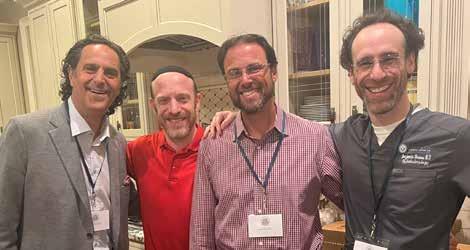
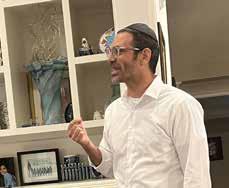
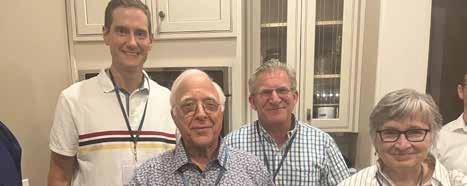
but rather looks at context, “what you care about, what you want to do, and what’s worth doing. Three is no ‘one answer’ but prioritizing how we behave.”
His example was being lactose intolerant and tasting the cheesecake, “Do I struggle or abstain? Consequences?”
He asked the group to raise their hands if they had encountered antisemitism in the workplace … hands went up!
Various physicians shared their own experiences. Dr. Paul Scheinberg, JMPN vice president, stated that a “real country Bubba” patient said, “I’m glad you are a ‘Jew’ doctor. My father said, ‘Jew docs are best.’”
Scheinberg considered it a compliment, others took offense. Another shared wearing a kippah in a suburban hospital, as someone remarked, “Why are you out here when the Jewish doctors are all at Northside?”
Melamud felt vulnerable when a patient suggested that “Palestine should take over the world.”
Rabbi Bedzow shared that he teaches non-Jews in the Candler School of Theology. “So, one dropped out of my class be-
cause I was Jewish. Is that antisemitism? Would I want to learn Torah from a nonJew? Maybe not.”
Female practitioners spoke of misogynistic harassment, “not as bad as current antisemitism. This antisemitism is different. It feels more violent … postOct. 7, antisemitism seems more real than that of post Holocaust.”
Paul Scheinberg stated, “I fully support the establishment and growth of JMPN. Much of this (antisemitism in medicine) is attributable to the change in healthcare delivery models in which doctors, nurses … are employees of large cor-
porate structures where they lost autonomy and environmental control. They are subject to bullying and offensive remarks from patients and coworkers with absent organizational support. They are also facing reduced percentage of Jewish colleagues in favor of so many foreign practitioners from countries and cultures with strong anti-Israel and anti-Jewish history.
“I hope that one of the benefits of JMPN will be increased self confidence in personal and group identity and autonomy. None of us should ever feel intimidated by anyone in our respective fields of expertise.” ì
Rabbinical Advisor: Rabbi Yossi Lerman
Quality Improvement Officer: Yehuda Jackson
Secretary: Robin Joseph
Financial Advisor-Treasurer: Casey Arundel
Legal Counsel: David Black
Recruitment-Membership: Rivkie Neuberger
Advisory Board: Dr. Ohad Kott, Dr. Joshua Winer, Dr. Jeremy Schube, Dr. Adam Levy
By Bob Bahr
The recent run of the Broadway musical, “Back to the Future” at the Fox Theater, had its earliest origins in the basement of writer Bob Gale’s childhood home.
Gale, whose parents were Jewish, grew up in University City, Mo., a prominent suburb of St. Louis. The inspiration for the film, upon which the musical is closely based, reportedly came when Gale made a trip home soon after graduating from the film writing program at the University of Southern California in the early 1980s.
While rummaging through his father’s papers in the basement, he came upon some old family photographs and found his father’s image as a teenager staring back at him across the decades. Most young people would shuffle through photographs like these without thinking much about them, but for Gale it planted the seed of an idea that would later be developed into one of the most beloved film franchises of the late 20th century.
As he looked more carefully at the photograph, he thought to himself, what if he could travel back in time to those years his father was in high school. How would that encounter develop, and what kind of relationship would they have? Perhaps, he might even meet the young woman who would later become his mother and how would he relate to her.
The intriguing question of time travel was something Gale had encountered before, as a fan of the superhero comic book tales of the early 1960s, The encounter with those fading photographs led to a conversation Gale had with director Robert Zemeckis, who had become a friend during their film study days at USC.
Together they crafted a story of a young man who travels back in time to the mid-1950s and the complications that can develop when you set yourself down in the middle of your parent’s adolescence. It wasn’t easy selling the initial idea to producers in Hollywood. They struck out in at least 35 story pitches to producers, until they caught the interest of Steven Spielberg, then basking in the astonishing success of “Jaws” a few years before. The rest, as they say, is history. The film they produced, which established Michael J. Fox as a major film star was the top grossing film of the year, and has become an enduring cult favorite.



Not only did the photographs in the basement spark his imagination, but in the film and the music that played here recently, the family drama Gale created was built largely around a man he might have imagined his father to be. In the film and the play, he’s a fearful and insecure teen, who must overcome his fear to win the love of the woman who would later become the mother of Marty McFly, the character Fox portrays.
The success of his travel back in time depends on how he can help his father stand up to a high school bully and cement the relationship that would lead to McFly’s later birth. Success for the time traveler has a very personal challenge attached to it.
In reality, Gale’s father, Mark, was
not likely to have been the insecure wimp he is portrayed to be in the comedy. His father was a veteran of World War II, who used his benefits under the GI Bill to go to law school and become a successful attorney in University City. He also served on the city council.
Nor was his father likely to be the presumably young man of an anonymous religious background that he is portrayed to be. The University City community Gale grew up in in the 1950s and 1960s was one of the most Jewish communities in America.
During this time, it was estimated that as many as 80 percent of the residents of University City were Jews. And although the three “Back to The Future” films are religiously neutral, Gale must
have encountered a few of his father’s bar mitzvah photos among those gathering dust in the basement.
One of the most important stars of the film and the stage play is the time travel machine, a converted DeLorean DMC12 automobile with its stainless steel body panels and gull wing doors that, by the mid-80s, had begun to achieve the kind of cult status that has endeared it to today’s classic car buffs.
As it is presented in the stage production that was created on the Fox Theater stage, it is a mighty impressive machine indeed. Fully capable of convincing us that it could have transported Bob Gale from his quasi-Jewish ghetto in University City, Mo., to film immortality in Hollywood. ì
By Bob Bahr
More than 115 people squeezed into the Woods Chapel BBQ in Atlanta’s Summerhill neighborhood to sample a unique pre-holiday menu created by celebrity chef Michael Twitty.
Twitty, the author of “KoshersoulThe Faith and Food Journey of an African American Jew,” created a menu reflective of his unique take on Jewish cuisine and his personal identity.
Not only was the dinner menu he recreated an interesting take on his life as a Jew of color, it provided for an interesting discussion of the many influences in his cooking.
The dinner, with its interesting mix of food, culture, and religion, was a reflection of the work of the dinner’s main sponsor, The Spring. The organization is a concerted attempt to stage events that reflect the diversity of the city’s intown neighborhoods while creating a focus that is uniquely Jewish. Barely a year old, the group’s successful dinner, which sold out quickly, caps a year of increasingly ambitious programming.
Samara Minkin, who runs the project with Dina Kimball, an experienced hand at visionary philanthropy, described the dinner as a reflection of the diversity of Atlanta’s city center.
“It was The Springs' vision of what a dinner party might be like,” Minkin said. “And people came from all over. It was very intergenerational. It was not all Jewish by a long shot. It was a very mixed crowd.”
As has been the case with other first year programs, The Spring partnered with more established organizations, the American Jewish Committee BlackJewish Coalition and The Breman Jewish Heritage Museum. Both have important connections to the urban environment The Spring hopes to shape.
The board is co-chaired by Matt Bronfman, CEO of Jamestown Properties, who is best known for his highly successful development of the Ponce City Market. His company transformed the former Sears Roebuck property on Ponce De Leon Avenue into a mixed-use development of over 2 million square feet. It had an enormous impact on the surrounding urban neighborhood. Bronfman, who has also served as the board chair of the Jewish Federation of Greater Atlanta, believes the intown community is overdue for a community center similar to the Marcus Jewish Community Center in Dunwoody.

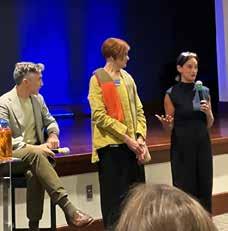
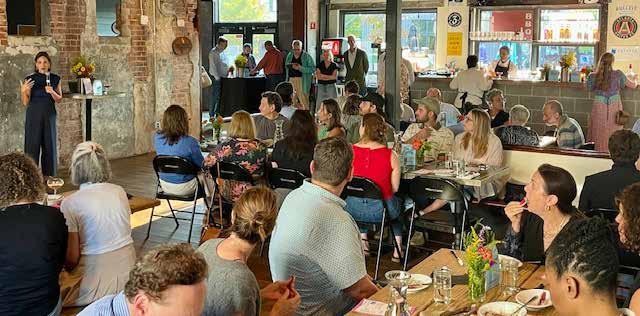
“I think a Jewish place, in town, is important for all people, but let me be clear, it’s particularly valuable for the intown community, to get them a place where they will gather.”
He points to the rapid development of Midtown and the continued attractiveness of surrounding older neighborhoods that have lured many young people. It’s also become popular with older residents, who like the cultural attractions and the lively urban environment and who also want to live closer to their children and their families in these neighborhoods.
One of the prime beneficiaries of the intown development boom has been The Temple, which has seen a lot of history since it moved to its present Midtown location on Peachtree Street in 1929. It’s the city’s largest Jewish synagogue, with
a membership of 1,800 families and a thriving preschool with a waiting list of 70.
The Temple is literally bursting at the seams and is well on its way to a major building project, the cost of which dwarfs any similar campaign by a Jewish religious institution here. It has raised more than $29 million of a $33.5 million fundraising project.
The building project will expand the pre-school and add a rooftop outdoor events facility as well as transform several other outdoor spaces on The Temple site.
The new building program is on top of a $20 million modernization program the facility underwent in the recent past.
The Temple’s senior rabbi, Peter Berg, does not underestimate the impact of The Spring on his synagogue.
“In many ways, Midtown is the center of the Jewish community. I think that more and more people have moved into the Midtown area in the last 15 years than at any point in recent memory.
"It’s really booming, and although we’re proud of what we’ve been able to accomplish, we want to make sure we have all of the programs and services available for everyone in the Midtown and Buckhead areas.”
With the Federation offices moving to Sandy Springs and the future of the Breman Museum complex uncertain, putting a plan in place for a new structure to service the community is, Bronfman’s opinion, a project whose time has come.
“I think there’s a lot of things you can debate about what goes on the inside of this new center,” Bronfman says, “but I’m firmly convinced it will happen.” ì
By Marcia Caller Jaffe
Event co-chairs Jade Blumberg Gaylis and Arielle Birenberg welcomed the pre-Rosh Hashanah crowd of “mothers and daughters, women and girls” to a unique female only concert aimed to inspire and bring the community closer.
Tuesday, Sept. 16 was the ninth stop and end of the theatre tour for songstress Devorah Schwartz. who is known for her voice technique, contemporary sound, and ability to inspire. Fan Addie Blumberg stated, “Schwartz’s voice is like that of an angel … unbelievably tremendous performer.”
Rebbetzin (Congregation Beth Tefillah) Dassi New gave the D’var Torah about the role of apples and honey for the High Holidays. First, she welcomed the rousing crowd who came from as far as Greenville, S.C., Athens, and Suwanee. She explained that honey represents the experiences in life that are unapologetically good and sweet. Love for fellow Jews -- where apples identify with love for Hashem. She spoke of the comfort of Jews in the U.S. akin to over medicating a sick person to dull the pain.
“Exile is a sickness of the soul … we need our ‘golus’ to end (Jews being conquered and taken out of the homeland.)
Holding a sparkling diamond-like microphone, Schwartz dedicated the “Mishaberah,” her first song, to IDF soldiers and hostages who “should all come home now.”
She presented her new album, “Beyond,” evoking her feelings of pushing yourself beyond what one thinks is capable. She explained, “Your first emotional reaction may not be your best reaction. Step back. Believe in yourself, push beyond.”
In her case, she was told that an allfemale audience world tour would never make it. “It may be half the (population) audience; but it’s perfect for me.” Schwartz’s songbird voice could be that of a Disney princess. But the most inspirational parts of the concert were the pre-teen and teen girls with their tricolor neon “spears” standing in front and on the stage to react to Schwartz. They jumped up and down and swayed as the words rolled out. “Am Yisreal Chai” was a crowd pleaser, which made perfect sense since the concert sponsors were Temima and Chaya Mushka day schools, in addition to Congregation Beth Tefillah, Chabad of Toco Hills, Congregation Beth Israel, and Chabad Israeli Center. The

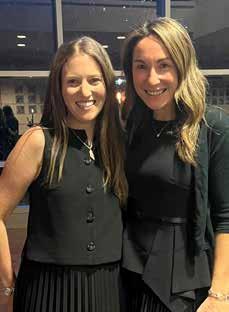
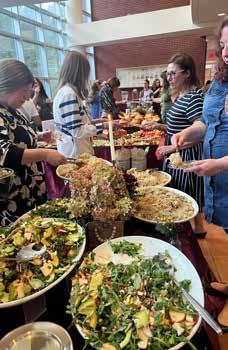
Spicy Peach supplied the door prize.
Interestingly, Schwartz earned an undergraduate pre-med degree and an MBA as well as spending 10 years of classical music training in Julliard “methodology.”
She explained that she used her knowledge of anatomy to help her students with elocution problems. Her repertoire includes contemporary and pop music in addition to the spiritual “reflections of the human experience.”
She no longer coaches students but offers an online voice course. She performed an emotional “You Raise Me Up,” a secular song made famous by Josh Groban. Schwartz shared very personally

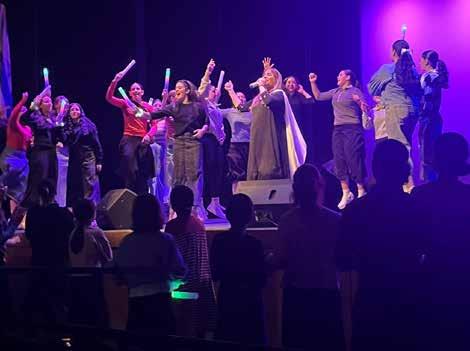
that she fell down the carpeted steps in her own home and suffered a brain bleed where upon she was in a neck brace for two months. She explained, “Then, even music hurt my ears. I had just returned from an Israeli concert where the stage bloomed bubbles that turned into smoke. I fell when I returned home for Chanukah and was most worried about making latkes when I awoke disoriented in the hospital.”
Schwartz, a mother of three, likes to discover new talent and shared the stage for one number with a young blonde clad in silver. Later in the concert, she related to the month of Elul where “we open our hearts … it’s important to daven. Thus, if
some of you cannot make it to shul, make this moment count.”
The buffet was an apple tossed green salad, coucous salad, mushroom barley soup, surrounded by a magnificent grazing table charcuterie board display by Itta Penson. Fresh fruit, cheeses, humus, vegetables, dried fruit, and stuffed dates made for a colorful display alongside several varieties of challah, onion dip, and guacamole. A few vendors displayed their wares around the food in the preconcert hour. Liora Afrah showed her passion project, Jewish-themed PJ’s made out of Pima cotton from Brazil.
Approximately 200 chanting girls certainly counted for a memorable night. ì
By Robyn Spizman Gerson
Do aches and pains bring you down? Has a recent fall knocked you off your feet? Does your back or neck ache? Sciatica nerve unbearable? Need core strengthening or posture support? Have osteopenia, osteoporosis or osteoarthritis? Or perhaps you just want to wake up, get up and go … plus feel good.
Alex Mitchell, founder of Stronger Now, an accelerated gym-like location in the heart of Sandy Springs, wants to help you weatherproof your body for life. His enthusiastic clientele raves about the alternative-gym’s strengthening, evidence-based exercise program where a like-minded community is thriving and everyone knows your name.
Visit his celebrated gym and you’ll understand why. Mitchell’s goal is to gradually push the years back as we age, improving capabilities and increasing the options you have for safe movement. Stronger Now’s team of certified experts is comprised of trainers, exercise physiologists, coaches, and biomedical physiologists. They are equipped to help the over50 crowd say farewell to pain, strain, and avoid stressing the body’s joints, with a focus on redefining declining muscle mass, flexibility, and mobility.
In celebration of Stronger Now’s fifth anniversary, they are doubling their square footage, relocating around the corner nearby to a larger space on Sandy Springs Circle. What excites Mitchell most is having the privilege of working with clients who want to take control of their health.
Clients Rave About Stronger Now
Client and advocate Bruce Morris shared, “Alex respects the limitations that older folks have and designs unique customized exercise programs for every individual. It’s not cookie cutter. His attitude is always positive, and you feel like you’ve accomplished something every time you are there. I feel much stronger, and my golf game has even improved.”
Stronger Now’s goal is a gradual steady and safe increase as we age. Mitchell explained, “We are focused on the business of reversing the pull of gravity. We make you better at dealing with forces constantly pushing you down, compressing your spine and pressing your joints together. With the 50-and-up group, you need to exercise parts of your body you want to support. I can guarantee if you give me three hours weekly, I can fundamentally change your life for



the better.”
Longtime client Barbara Mays said, “When I first met Alex, it had been years since I had worked out – let alone with the trainer. Alex immediately assessed my fitness level – a beginner. I have worked out consistently, increased my reps, improved my balance and flexibility while allowing for any accommodations due to aging. Every time I walk into the gym I hear, ‘Hi Barbara, how are you feeling today’ and the community is awesome. It’s all about progress while ensuring my safety. I’m definitely stronger now!”
Another devoted client, Fred Levick, said, “Back in July 2021, about 16 months into the pandemic, I saw a post on Nextdoor about a small boutique gym in Sandy Springs focusing on working with older adults. I decided to stop by and ended up spending an hour talking with the owner, Alex Mitchell. Looking back, that visit was one of the best decisions I’ve made for my health and how I want to age. At Stronger Now, I get workouts designed to help me build strength, flexibility, and balance while working around my own limitations, so I can stay active and healthy. Just as important, I get to work out alongside people with simi-
lar goals in a space that’s friendly, supportive, and never competitive. For me, Stronger Now isn’t just a gym. It’s a community that makes taking care of myself something I look forward to.”
Mitchell shared, “We are also dedicated to teaching clients how to prevent falls and improve their balance and stability. A common concern Stronger Now also sees is posture issues. If you start to lean forward and have pain sitting or standing for too long of time, it’s important to pay attention to why it’s happening. We want to be your fitness family and begin with a one-hour complementary initial consultation that evaluates how you move, your exercise history as well as your relevant medical history. That allows us to build a program that’s customized for you. For the next three months, we carefully work to help you strengthen what’s needed.”
Mitchell explained that there are three things older adults can improve which are exercise, nutrition and community. He said, “There are a lot of gyms, but not for this demographic. Our methods are more deliberate, education-fo-
cused, and adaptive to what your joints are like day-to-day. We watch the client and watch how they move. We aren’t doctors and we don’t give medical advice. We provide support alongside your physicians, physical therapists, and other healthcare professionals — helping you strengthen the parts of your body that support you as you age.”
He added, “We want our clients to come as often as they can. We do not have contracts and offer a week-long trial of small group training. Monthly fees include unlimited access to small group training from 6 a.m. to 8 p.m., Monday through Friday, Saturday from 9 a.m. to 5 p.m., and Sunday by appointment.
The Stronger Now family meets you where you are at and changes lives. Mitchell shared, “We welcome new clients, and the moment we meet, I am already thinking six months ahead, realistically envisioning that something good will happen. The benefits that come from getting stronger are remarkable. Our motto sums up our mission. ‘Let us grow old with you, only stronger.”
Visit www.strongernowgym.com for more information or email Alex@strongernowgym.com ì


By TOI and Agencies
Two Israeli universities — Tel Aviv University and the Technion-Israel Institute of Technology — snagged spots among the world’s top 10 academic institutions for producing the most entrepreneurs, according to financial research firm PitchBook’s 2025 ranking.
Tel Aviv University topped the Israeli universities, maintaining its seventh place in the list of the world’s undergraduate programs that produce the most venture capital-backed entrepreneurs, and is the
Sept. 30, 1957: French Prime Minister Maurice Bourgès-Maunoury backdates to today his signature on a letter of cooperation with Israel on a nuclear reactor. He actually signs the letter Oct. 1, the day he is voted out of office.
Oct. 1, 1947: Biochemist Aaron Ciechanover is born in Haifa. He becomes one of Israel’s first science Nobel laureates in 2004 when he shares the chemistry prize with Israeli Avram Hershko and American Irwin Rose.

of Ibelin surrenders Jerusalem to Saladin.
Oct. 2, 1187: Saladin, the sultan of Egypt and founder of the Ayyubid dynasty, captures Jerusalem from crusaders after a siege that began Sept. 20. Saladin is tolerant of Jews and allows them to live in the holy city again in 1190.
Oct. 3, 2018: German Chancellor Angela Merkel arrives in Jerusalem for the first time in more than four years amid growing U.S.-Europe tensions over Iran. She seeks to salvage the 2015 Iran nuclear deal, opposed by Israel.
top non-American university in the ranking. The Technion moved up six notches from last year and came in tenth.
“Technion alumni are the main economic engine of the State of Israel and are largely responsible for the creation of Israel’s ‘Startup Nation,’” said Technion president Prof. Uri Sivan.
“In recent years, the Technion has expanded and deepened entrepreneurship studies for undergraduates, supporting students and other communities in realizing their entrepreneurial ideas. These activities foster entrepreneurship within the student and research community and strengthen the bond between the Technion and industry – one of our central strategic goals today.”
Oct. 4, 1992: El Al Flight 1862, a 747 carrying cargo from New York to Tel Aviv, crashes into an apartment complex in Bijlmermeer, Netherlands, 16 minutes after taking off from Amsterdam, where the plane had stopped for a crew change.
Oct. 5, 1898: Painter Nachum Gutman is born in what is now Moldova. At 7, he moves to Ottoman Palestine. Gutman paves the way for Israeli artists, writers, painters and sculptors to move away from European influences.

A telegram from Henry Morgenthau on Aug. 31, 1914, inspired American Jews, led by Jacob Schiff and Louis Marshall, to raise $50,000 for Jews in Palestine.
Oct. 6, 1914: Gold worth $50,000, raised in two days by American Jewish leaders in response to a plea from Henry Morgenthau, arrives in Jaffa on the USS North Carolina to help the Jewish community in Palestine.
Oct. 7, 2009: Crystallographer Ada Yonath, a professor at the Weizmann Institute, becomes the first woman from the Middle East to win a science Nobel Prize when she shares the chemistry award for work on ribosomes.

By TOI and Agencies
U.S. energy giant Chevron and its partners in the Leviathan reservoir off Israel’s Mediterranean coast have inked a $610 million deal with state-owned pipeline operator Israel Natural Gas Lines for the construction of a new pipeline to bolster natural gas exports to Egypt.
Chevron, which holds a 39.66 percent
Oct. 8, 1576: Ottoman Sultan Murad III orders 1,000 “rich and prosperous” Jews in Safed to move to Famagusta, Cyprus, to spur economic development on the island. The Ottomans move 500 more Jewish families in 1577.
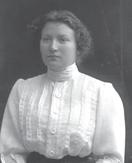
Sarah Aaronsohn killed herself with a revolver hidden in her Zichron Yaakov home when she was allowed to gather some personal items before being transferred to a prison in Nazareth.
Oct. 9, 1917: Sarah Aaronsohn, part of the Nili spy network for the British in Ottoman Palestine, dies eight days after being captured by Turkish authorities and four days after shooting herself to end her torture and interrogation.
Oct. 10, 1983: Yitzhak Shamir becomes Israel’s seventh prime minister after fellow Likud member Menachem Begin resigns. Shamir serves until an election in July 1984, then heads the government again from 1986 to 1992.
Oct. 11, 1938: Arab leaders adopt the Resolutions of the Inter-Parliamentary Congress, rejecting a British proposal for Palestine’s partition, demanding an end to Jewish immigration but offering to let Jews now in Palestine remain.
stake in Leviathan, said the engineering, procurement, and construction (EPC) contract is for a 40-mile pipeline to transport gas from the field running from Ramat Hovav in southern Israel to the Nitzana crossing on the Israeli Egyptian border. The contract is for a period of 15 years.
The Niztana export route will transport at least 600 million cubic feet of natural gas per day, once construction of the pipeline is completed in 2028. The pipeline route has the potential to increase Israel’s total export capacity to Egypt to more than 2.2 billion cubic feet per day, Chevron said.

Gavriel Salomon, the author of four books, advocates coexistence programs and education to reduce tensions between Israel’s Jews and Arabs. // Transferred by Matanya, CC BY-SA 3.0, via Wikimedia Commons
Oct. 12, 1938: Gavriel Salomon, the founder of the Center for Research on Peace Education at Haifa University and the education dean from 1993 to 1998, is born. He advocates coexistence programs and the pedagogical uses of technology.
Oct. 13, 2011: Composer Daniel Barenboim, who moved to Israel as a child, is named the musical director of La Scala Opera House in Milan, Italy. He was the Chicago Symphony Orchestra’s musical director from 1991 to 2006.
Oct. 14, 1989: Israeli intellectual Dov Sadan dies at 87. He worked in publishing and was a Hebrew University professor and led Yiddish studies from 1952 until 1970. He served in the Knesset from 1965 to 1968.
Items are provided by the Center for Israel Education (israeled.org), where you can find more details.

By TOI and Agencies
In his first public comments on the matter, U.S. President Donald Trump announced that he will not allow Israel to annex the West Bank.
“I will not allow Israel to annex the West Bank. It’s not going to happen,” Trump told reporters in the Oval Office when asked to confirm reports that he assured Arab and Muslim leaders of that stance during a multilateral meeting held on the UN General Assembly sidelines.
Trump also stressed that he spoke with Prime Minister Benjamin Netanyahu about the issue.
“I’m not allowing Israel to annex the West Bank,” Trump repeated. “There’s been enough. It’s time to stop now,” he said.
Trump made the comments as Netanyahu was arriving in New York to deliver an address to the United Nations.
France, Britain, Canada, Australia and Portugal are among the countries that have recognized a Palestinian state in the last few days in part to help keep the possibility of a two-state solution alive. Israel has condemned the moves.
A senior Israeli official told The Times of Israel that the Trump administration privately cautioned Israel against annexing the West Bank in response to the recent decisions by Western countries to recognize Palestinian statehood.
However, Jerusalem did not feel that the warning marked “an end to the discussion,” and Netanyahu planned to discuss the matter with Trump during an upcoming White House meeting, the Israeli official said.
Even if the warning had already been conveyed privately, Trump’s decision to publicly declare he will not allow the West Bank to be annexed is sure to deflate hopes among settler leaders — which reached unprecedented levels following his reelection — that Israel would finally actualize their long-held dreams of annexation.
Without U.S. support, Israel is much less likely to go ahead with the move, which would have diminished significance without backing from the world’s leading superpower and spark massive international backlash. A top Emirati official warned in an exclusive interview with The Times of Israel earlier this

month that annexation would be a “red line” that would mark the “end” of regional integration.
Trump’s announcement could also spell trouble for Netanyahu’s government, whose far-right partners have made annexation a central aim and may be more inclined to collapse the coalition if annexation is now out of reach.
Trump said that the U.S. is “close to getting some kind of deal done” in the Gaza Strip after his “great” multilateral meeting in New York with the leaders of eight Arab and Muslim countries on the issue.
Trump told reporters in the Oval Office during the public portion of his sit-down with visiting Turkish President Recep Tayyip Erdogan that “a lot was determined in that meeting,” during which Trump presented a 21-point plan for ending the war in Gaza and establishing a non-Hamas body to govern the Strip.
“I have to meet with Israel. They know what I want. I think we can get that one done. I hope we can get that done. A lot of people are dying,” Trump said.
“I’m going to have to tell Israel, ‘Let’s go,’” Trump added. ì
The following is an index of Israeli hostages with the most current information available as of press deadline.
The first phase of Israeli hostage transfers is complete. The Atlanta Jewish Times will update this hostage tracker with current news of the next round of hostage transfers. Bring Them Home.
Israeli hostages remaining:
Fifty-five more hostages are held in Gaza by Hamas and Islamic Jihad terrorists. The hostages are:
Rom Braslavski, 21
Yosef-Chaim Ohana, 24
Nimrod Cohen, 20
Matan Angrest, 22
Ziv Berman, 27
Gali Berman, 27
Maxim Herkin, 36
Segev Kalfon, 27
Bipin Joshi, 24
Elkana Bohbut, 35
Alon Ohel, 24
Ariel Cunio, 27
Bar Kupershtien, 23
Guy Gilboa-Dalal, 23
Eitan Horn, 38
Tamir Nimrodi, 20
Matan Zangauker, 25
Avinatan Or, 31
Omri Miran, 47
Eitan Mor, 24
David Cunio, 34
Eyvatar David, 24
The following hostages are either believed to be dead or their deaths have been confimed:
Amiram Cooper, 84 (murdered in captivity)
Inbar Hayman, 27 (murdered in captivity)
Asaf Hamami, 41 (murdered in captivity)
Eliyahu Margalit, 75 (murdered in captivity)
Uriel Baruch, 35 (murdered in captivity)
Tal Haimi, 41 (murdered in captivity)
Oz Daniel, 19 (murdered in captivity)
Tamir Adar, 38 (murdered in captivity)
Eitan Levy, 52 (murdered in captivity)
Ran Gvili, 24 (murdered in captivity)
Yair Yaakov, 59 (murdered in captivity)
Ronen Engel, 54 (murdered in captivity)
Sahar Baruch, 35 (murdered in captivity)
Itay Chen, 19 (murdered in captivity)
Aviv Atzili, 49 (murdered in captivity)
Dror Or, 48 (murdered in captivity)
Muhammad Al-Atrash, 39 (murdered in captivity)
Joshua Loitu Mollel, 21 (murdered in captivity)
Idan Shitvi, 28 (murdered in captivity)
Yossi Sharabi, 53 (murdered in captivity)
Arie Zalmanovich, 85 (murdered in captivity)
Daniel Peretz, 22 (murdered in captivity)
Guy Illouz, 26 (murdered in captivity)
Lior Rudaeff, 61 (murdered in captivity)
Meny Godard, 73 (murdered in captivity)
Ilan Weiss, 56 (murdered in captivity)
Hadar Goldin, 23 (murdered in 2014)
Omer Neutra, 21 (murdered in captivity)
Sonthaya Oakkharasri (murdered in captivity)
Sudthisak Rinthalak (murdered in captivity)
By Aaron Troodler
In times of crisis, having extra help can be critical and mean the difference between life and death.
For Magen David Adom, Israel’s national emergency medical response and blood services unit, crises are a routine part of its life-saving efforts, and therefore having extra hands on deck in the form of volunteers is vital to the organization’s noble mission and heroic efforts.
With several overseas volunteer programs, Magen David Adom (MDA) facilitates multiple opportunities for volunteerism and enables people to participate in meaningful and memorable activities that directly benefit Israel and its citizens.
The MDA Overseas International Volunteer Program, in which individuals get hands-on training with first responders and then spend time working on ambulances across Israel, is comprised of several distinct programs, each of which has unique offerings to accommodate a wide range of volunteers.
Whether it is the Israel Experience Program, a six-week program for people ages 18 to 30, Masa Tlalim, a four-week program for people ages 18 to 50, Destination Israel, which is a four-week program for people ages 18 to 40 sponsored by Onward Israel and based in Tel Aviv, or programs for overseas medical professionals to use their expertise treating patients in Israel, overseas volunteer opportunities through MDA abound.
For past participants of these programs, the memories created by the experience last a lifetime.
For Rachel Orloff, a New York City resident who volunteered in Israel in 2008 through MDA, it was a life-chang-
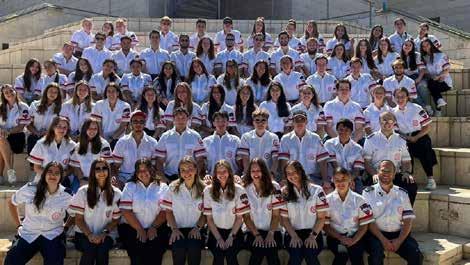

ing experience. After hearing her friend, who had volunteered the previous summer, talk about how incredible the overseas volunteer program was, Orloff was motivated to go, and she’s glad she did.
“It was very collaborative. Everyone was included. It didn’t matter how old you were, your race, your religion, your gender. Everyone was super nice and extremely welcoming,” Orloff said. “I think just being able to be immersed in another country, a different culture, a different language, it really almost forces you to be uncomfortable. And that’s how you grow.
“The memories I have are just really in my heart. … It’s a warm feeling of how I feel about the organization,” she added. “Even to this day, it’s an organization that I feel extremely proud to be a part of. … I’m really thankful for everything they’re doing for Israel.”
As a result of her experience on Magen David Adom’s overseas volunteer program, Orloff has put an emphasis on remaining connected with the organiza-
tion, and over the years she’s rolled up her sleeves to volunteer in a variety of ways.
“When I moved to New York, I was always trying to get involved with Magen David Adom,” she said as she talked about her involvement with the organization years after her volunteer experience.
“I have a 60-pound Goldendoodle who’s a trained and certified therapy dog, so I bring him with me to hospitals and visit patients and staff. … to be able to come to blood drives or do anything volunteering with Magen David Adom with my dog, that to me is the most full-circle moment ever. I’m so appreciative and grateful for my experience and being able to now give back with my dog.”
According to Yonatan Yagodovsky, director of the Fundraising and International Relations Department of Magen David Adom in Israel, the volunteer initiative is both welcoming and wideranging.
“Magen David Adom’s Overseas Vol-
unteer Program welcomes volunteers from across the world. These volunteers are exposed to the multifaceted Israeli society, meeting patients from all societies and religions,” he said.
Yagodovsky noted that the volunteers “undergo medical training that prepares them for volunteering on MDA ambulances and mobile intensive care units, assisting to save lives and change lives throughout Israel.”
He added that many participants in the MDA program are planning to work in the medical field, and this volunteer experience “presents them with an active introduction, providing them with skills, knowledge and a sense of capability that will serve them well later in life.”
Yagodovsky said that the volunteers often walk away from the experience feeling a tremendous sense of accomplishment and pride, both in terms of their efforts to help MDA and the people they serve, as well as their general contributions to the State of Israel.


“They return to their home countries having experienced Israel in a unique way, having had a positive effect on society, and become wonderful ambassadors for the State of Israel and for the incredible work of Magen David Adom,” he said.
For Dr. Larry Weiss, who recently moved from Baltimore to Florida, Magen David Adom was an opportunity to make a difference in a time of need. A retiree who has 38 years of experience in emergency medicine, Weiss was horrified by the atrocities of Oct. 7 and wanted to put his medical skills to use in an effort to help in the aftermath of the Hamas attacks.
Within five days after contacting Magen David Adom, the organization had obtained an emergency license for Weiss to practice medicine in Israel, and he was off to Israel shortly thereafter, where he served with one of Magen David Adom’s mobile intensive care units.
“I saw a lot of really sick people and I feel like I had an impact. I made a difference,” Weiss said.
“The MDA personnel in Israel are great,” he added. “I think it’s the best trained prehospital care provider in the world. I know there are other great providers, but I can’t imagine any set of providers being better. They’re extremely well-motivated, well-trained and hardworking.”
Weiss, whose volunteer experience with MDA had him working in Jerusalem and then in the Mercaz, the heavily populated area between Jerusalem and Tel Aviv, cited a specific case that he believes epitomizes the magic that is Magen David Adom.
His first case as a volunteer was assisting and treating a relatively young man suffering a cardiac arrest at a playground. The Magen David Adom first responders intubated the patient on the sidewalk, which is a very difficult procedure in that type of setting. After noting that perhaps less than 5 percent of patients survive an out-of-hospital car-
diac arrest, Weiss said that the patient survived the ordeal, which is primarily attributable to the quick response and quality medical care that was provided at the scene.
“Because we were on a mobile ICU, we saw the sickest patients, and the civilian health care system seemed a little stressed,” Weiss said. “We would go to the Kupat Cholim clinics … and we could see these poor people were inundated. They would tell us that half of their physicians and nurses were in Gaza.”
For physicians and other medical professionals, there is a unique opportunity with Magen David Adom that is coming up later this year.
The International Seminar in Emergency Response 2025, which will take place in Israel from Dec. 7 to Dec. 12, offers participants the opportunity to take part in emergency medical training from experienced first responder teams while also connecting with attendees from around the world and with the State of Israel.
With a full schedule of events and activities focusing on disaster preparedness, responding to mass casualty events, meeting with Israeli physicians and medical professionals, volunteering on ambulances and touring Magen David Adom’s facilities, participants in the seminar will gain a wealth of knowledge and a deeper understanding of what it means to be a Magen David Adom first responder on the front lines in Israel. In addition, attendees will visit several sites connected to the Oct. 7 attacks and meet with some of the heroes who survived and whose incredible efforts helped save the lives of others.
For information about the International Seminar in Emergency Response 2025, email Vicki Angel at vickia@mda. org.il.
To learn more about Magen David Adom’s volunteer programs and other ways to get involved, visit afmda.org. ì


(C)
| (O) 770-394-2131 BarocasFeldman@Gmail.com
In our new year, we hope the sounds of the shofar at open the door with GOODNESS & PEACE for you and your family.


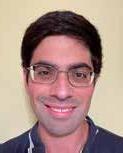
David Ostrowsky
For the first time this century — and only second time ever — Robert Kraft, the devoutly Jewish principal owner of the six-time Super Bowl champion New England Patriots, welcomed a fellow Jewish member of his organization into the Patriots Hall of Fame.
On the afternoon of Saturday Sept. 20, in front of thousands of fans and dozens of former players in attendance outside of Gillette Stadium in Foxborough, Mass., Julian Edelman (along with former Patriots head coach Bill Parcells) was inducted into the team’s Hall of Fame. A candidate for enshrinement must be four years removed from their playing/coaching career to be eligible; Edelman, who last played in 2020, was selected on his first go-round.
While global celebrity quarterback Tom Brady and tight end Rob Gronkowski were the two most recognizable stars for the Patriots 2010s dynasty, the offense was so often sparkplugged by the undersized wide receiver Edelman, whose never-say-die attitude, sheer ruggedness, and clutch postseason performances — often on rainy afternoons and bitterly cold evenings — endeared himself to legions of football fans across not just New England, but the entire country.
There were certainly faster and stronger players with more talent, but few, if any, got more out of their talent than Edelman, who was drafted out of Kent State — not as a receiver, but as a quarterback — in the seventh and final round of the 2009 NFL Draft. Indeed, Edelman over the ensuing decade contributed to the Patriots’ dynastic run (five Super Bowl appearances, including three wins) by developing into a shifty slot receiver and solid punt returner while even moonlighting for a bit as a defensive back.
During the 32-minute induction speech that was packed with the requisite shout-outs to relatives, friends, coaches, and teammates — as well as some very thoughtful remarks for the team’s equipment staff, security guards, and cafeteria workers — and infused with the careerdefining underdog theme, Edelman, currently an NFL analyst for FOX Sports, weaved in the narrative of his Judaic background. His early remarks included
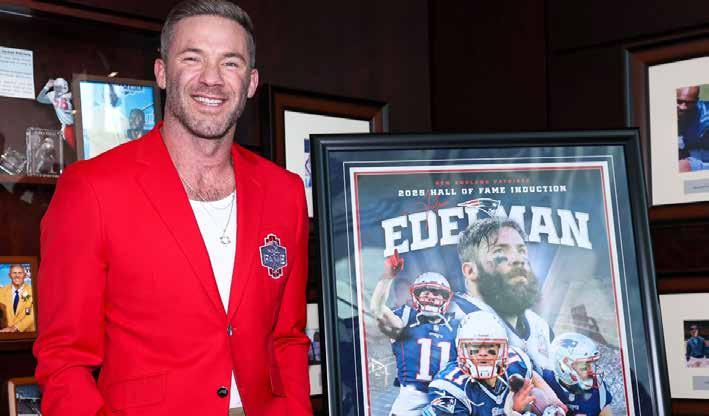
the following reference to the Jewish connection he still has to this day with the Patriots owner: “Thank you, Mr. Kraft, for all the wisdom that you gave me in the building, outside the building. I love going over our faith of Judaism together. And thank you for believing in me, for creating a culture where someone like me could find a role and thrive.”
Edelman, who grew up celebrating Chanukah, first publicly identified as being Jewish during an NFL Network interview in December 2013. Since then, he has visited Israel on multiple occasions, the first time being in 2015 with Combined Jewish Philanthropies (CJP). His Jewish ancestry stems from his father, Frank Edelman, a longtime mechanic and the owner of A-1 Auto Tech in Mountain View, Calif. And it was, in fact, Frank who received the longest tribute during his son’s big day earlier this month.
“And to my father, my first coach, you instilled so much in me growing up,” began Edelman while fighting back tears. “But most importantly, you instilled work ethic, the idea that nothing in life is given to you or fair. And all you can worry about is what’s on your plate that day. You preach do the little things and focus on what you can control. And that’s something I lived by.
“You taught me the importance of a routine. See, my dad, he would get up at 5 a.m. — he was a mechanic. He’d go
open up his shop at 6 a.m., work a 12-hour day. Then I’d see him before practice, so we could practice before practice or before a game. We did that every day. And I needed that. All those years of school, homework, school, homework, repeat, that prepared me for the NFL grind. He was tough. And these days he might be thrown in jail for how he did things, but I wouldn’t be here without him. He would always say, ‘keep your head down, no sniveling, and get to work.’
“For me, when things would start to seem impossible, memorizing a playbook, rehabbing from an injury, trying to get a call back from Tom Brady, I would remember what my dad used to tell me as a little boy. He would say, ‘Son, life is simple but hard.’ Meaning it’s simple knowing what you have to do. We all know what we have to do to be a better teacher, to be a better parent, to be a better person, to be a better worker, be a better student. But actually doing it is the hard part. I’ll always be proud to say I’m a New England Patriot and this place made me who I am today.”
Edelman’s marvelous career could very well culminate in a speech at the Pro Football Hall of Fame one day, but it was not always a pleasure cruise. There were some off-field incidents that precluded him from having a squeaky-clean reputation (the most notable occurred in 2011 when he was arrested and charged for al-
legedly groping a woman at a Halloween party, though the sex assault charges were ultimately dropped) while he suffered a season-ending right knee injury in the 2017 preseason, which preceded a fourgame suspension at the beginning of the 2018 regular season for violating the NFL’s policy on performance-enhancing substances. But just like he did after so many bone-rattling hits, Edelman bounced back from one of the most trying years of his life to ultimately be named MVP of Super Bowl LIII in February 2019.
He said, “2017, that was a hard year. Started out — injury, suspension — to go out and end it the way it did, like I said in my speech, I had an ultimate support system that was there through the rough times, that was there during the great times. I had some unbelievable teammates — we pushed each other. That was a great year for me. Would I want to go through it again? No, but it made me such a stronger person, when you’re at the bottom and you can work your way back to the top,”
As for his Jewish background, Edelman may have waited until he was an established veteran before opening up about it, but judging by his closing remarks, it was quite evident that Judaism remains an integral part of his identity:
“And I want to wish everyone a happy New Year coming up. Shanah Tovah and Foxborough forever. Thank you.” ì
By David Ostrowsky
With the 2026 World Baseball Classic (WBC) just over five months away, the Israeli national baseball team had a critical tune-up at last week’s 2025 Baseball European Championship. For Israel, which reached the quarterfinals, where it ultimately fell to the Czech Republic, 4-3, before playing out the string of final games in the 5-8 placement bracket, the weeklong tournament was far from perfect — both on and off the diamond — but there were some encouraging signs for a team looking to make a splash in Pool D play at Miami’s loanDepot Park in March.
Playing without active big leaguers Harrison Bader, Dean Kremer, and Garrett Stubbs who have committed to representing Israel at next year’s WBC, Team Israel began Group B play in the Euro tourney by pulling off an 8-4 comeback over France, a win fueled by a Robb Paller third-inning grand slam and shutdown bullpen performance featuring appearances by one-time Miami Marlin Jake Fishman and former Philadelphia Phillie Charles “Bubby” Rossman.
Paller has never played in the major leagues, but his baseball credentials are impressive nonetheless. During his senior year at Columbia University last decade, the now 32-year-old AmericanIsraeli outfielder was a first-team all-Ivy League selection before going on to compete for Team Israel at the 2020 Summer Olympics in Tokyo. For Paller, the opening victory was particularly gratifying as there were contributions on behalf of several Israeli-born players, including shortstop Nadav Machlin and leftfielder Aviad Schechter who combined for five walks. Though Team Israel continues to have a solid contingent of Americanborn players, the ballclub is starting to develop a more homegrown identity, a testament to the sport’s burgeoning popularity among Israelis.
“When I first came to bolster our baseball program, I was one of many Americans. Today, there are so many skilled and motivated Israelis who grew up playing locally — it feels like a dream come true,” Paller said after he powered Israel to the come-from-behind victory over France.
On another level, whether it’s at the WBC, Olympics, or the Baseball European Championship, there’s an understanding that a win for the blue-and-white takes on greater meaning than what’s simply captured in the box score.
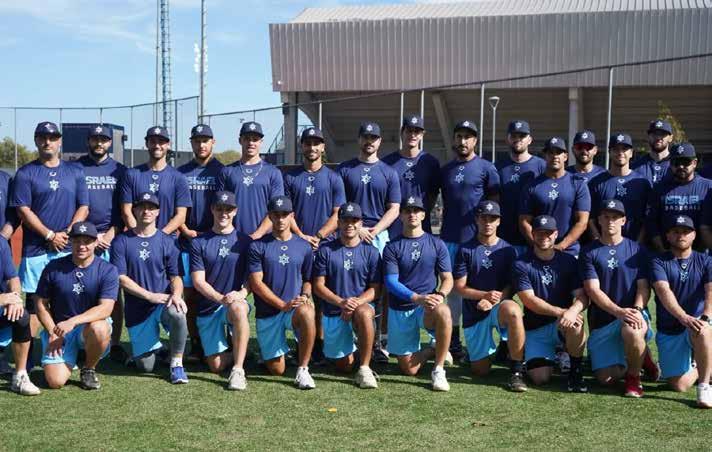
“It’s a badge of honor, and a reminder that I’m fulfilling a life-long dream: to wear a jersey with Israel displayed on my chest,” shared Israel Game 1 starting pitcher Justin Alintoff, a University of Florida alum who currently pitches in an independent league back in the States. “If we could ask her, Anne Frank would not be surprised to learn that 80 years later, Jews are still subject to hatred in Holland … but instead of a yellow star, today we proudly display a blue and white star as a symbol of the independent and powerful state of Israel.”
The dominant narrative surrounding Israel’s statement win, however, did not involve anything between the lines, but rather what transpired before the first pitch. Dozens of members of the Rotterdam Palestine Coalition Foundation, congregating outside Rotterdam’s Neptunus Stadium, tried to prevent the venue from opening by chaining themselves to fences. Reportedly, some protestors chanted “Death to the Israeli army IDF” and draped signs reading “Stop whitewashing with sports, boycott genocide” and “Zionism is Nazism, Gaza is Auschwitz,” along the stadium’s front gate. But once an over two-hour rain delay ended, the protest subsided, the gates opened to the concourses, and Israel was
able to play ball.
Although there were no such distractions during Israel’s next two games, the on-field outcome each day was nonetheless sobering: a 16-1 runaway win by Great Britain preceded a 9-1 blowout by the Netherlands tournament host team.
Despite the aggregate 25-2 deficit in Games 2-3, Israel stormed back against Switzerland on Sept. 24 with a resounding 9-1 blowout of its own to secure a spot in the quarterfinals. In his second pitching start, Alintoff was overpowering, going the distance — a rarity at any level in today’s game — while fanning seven and only yielding four hits. Afterwards, Israel’s ace pitcher, bubbling with emotion, reflected on the import of his team advancing to the quarterfinals.
“I’ve pitched in big games before, but today was special,” shared Alintoff, who fired off an immaculate inning in the fourth frame (all three batters struck out on nine pitches). “I was pitching on behalf of my people. I want to dedicate this victory to those who are under attack in their homes, as well as those who are fighting to protect us even now — and, of course, to those who have lost their lives. I hope and pray that today’s game will usher in a better New Year, one in which we may see a swift return of our
hostages.”
Against the Swiss, the offensive hero for Israel was none other than Atlanta’s own Chase Engelhard. The first baseman, who played college ball at both Tulane and Florida International University and recently received his Israeli citizenship, went 4-5 while driving in a team-leading three runs.
“Nadav [Machlin], Itai [Spinoza], Zev [Mor], and Assaf [Lowengard] all got key hits today. They’ve taught me what it means to be an Israeli and stand up against the odds,” said Engelhard.
A day later in its quarterfinal matchup against the Czech Republic, Israel fell short of advancing to the Final Four as its bats largely fell silent in the aforementioned 4-3 loss. Thanks to some terrific relief pitching — Israel manager Nate Fish went to his bullpen early after Fishman gave up a couple runs in the opening two frames — Israel was only down 4-0 in the top of the ninth, but a late three-run rally was all it could muster as pinch-hitter Jake Arnow stranded the tying run on third by grounding out to end the game.
After bowing out against the Czech Republic, Israel wrapped up the 2025 Baseball European Championship with a 10-9 loss to Germany before getting past Croatia 11-5 in the final game. ì
By Bob Bahr
The back room at Congregation Beth Tefillah in Sandy Springs usually echoes with the melodies of the daily Hasidic prayer services. However, on a recent night, the chairs were pushed back and the sounds of worship were replaced with the thwack, thwack, thwack … of leather gloves landing practice punches on a pair of punching mitts.
The mitts belong to Zahir Raheem, who, during his professional career, was known as Z-Man. He’s a former Olympian and a three-time world boxing champion.
Even though he retired over a decade ago from his career in the ring, he still retains the slender, muscular body that threw knockout punches in 21 of his 35 professional fights. He lost only 3 contests and his amateur record was even more impressive. In 213 fights, he only lost four matches, and he was a member of the 1996 USA Olympic Boxing Team.
He moves around the synagogue meeting room shouting encouragement to the small group of men, several of whom may have laced up a pair of boxing gloves for the first time. But it doesn’t matter to Raheem, who is here, tonight, for one of a short series of introductory boxing classes. The goal is maybe work up a sweat while developing a new respect for a challenging athletic skill that Raheem emphasizes, combining strength and stamina with inner emotional discipline and resilience.
“I love doing this, man, I love doing it,” he tells his quietly respectful students. They seem impressed by this 49-year-old former champ who still retains the solid muscular body and energy of a man half his age.
“When I stepped into the ring,” he continues, “I didn’t have time to think. I had to trust a higher power. And how did I do this? Preparation, meditation, praying, affirmation. It’s not just about the physical man, it about the spiritual man. Everybody is fighting for something. We all have a struggle somewhere.“
It’s a message that certainly resonates with Rabbi Ari Sollish, head of The Torah Center at Congregation Beth Tefillah, who brought his two teenage sons along for the practice.
In the Hebrew month of Elul, which just precedes the High Holy Days of Rosh Hashanah and Yom Kippur, observant Jews like those who attended the class may not often put on the gloves, but they prepare themselves, spiritually, much like this champ, the Z-Man.
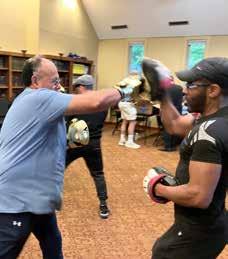


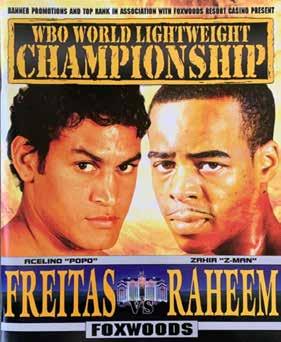
Raheem has held three world championships.
In a break from throwing several punches of his own, Rabbi Sollish adds his own spiritual message for this special time in the Jewish Year.
“We believe G-d orchestrates everything in our lives and puts us in places we need to be. Jewish spirituality teaches us that every place we’re in needs our attention. Boxing is not just throwing your arms out, it's about how we pay attention to each moment in our lives that makes what we are doing here tonight so beautiful.”
In recent years, the Chabad movement has been an inspiration for more than just a few middle-aged punchers in Sandy Springs. It helped produce boxer Yuri Foreman, who grew up in Israel but came to America to further his career. He wore a Star of David on his trunks and was a student of the famed Chabad Rabbi
in Brooklyn, DovBer Pinson. He studied Talmud and Jewish mysticism in the morning and trained in the afternoon. Foreman told one interviewer that it was a good mix.
“I needed an outlet — a spiritual backbone, so I could push myself better,” the boxer was quoted as saying, “channel my energy, be more present.”
In 2009, he went on to defeat Daniel Santos to become the World Boxing Association’s super welterweight champion, becoming the first observant Jew to hold a world title since Barney Ross did it in 1935. Seven years later, he was ordained a rabbi at the Rabbi Pinson’s IYYUN Institute in New York.
“As I was maturing, as a person and as a fighter, I realized I needed some sort of spiritual center to achieve things
physically, especially in boxing where you need to have good spiritual form and good physical form.”
Rahim Zaheer knows all about the importance of having a strong spiritual background. He literally was raising himself on the streets of North Philadelphia when he first walked into the ABC Gym there, falling in love with boxing, and turning his life around.
Today, he’s a practicing Muslim, who seems quite at home, teaching boxing in Sandy Springs, in a room filled with kippahs and an occasional tzitzit garment.
“In boxing, I found peace and love and happiness. We are all energies regardless of our faith. I don’t look at how big or small you are or the color of your skin. I only look at your energy and who you are.” ì
By Marcia Caller Jaffe
Rabbi Hirshy Minkowicz is plowing on with great strides to build a new sports field complex on six acres attached to the main North Fulton Chabad campus. These additional six acres were purchased in two parts: three acres were acquired in 2012 with a donation from Mike Leven which covered the land. The additional three acres were purchased in 2021 and were donated by the Bunzl/Wilner family.
The parcels are raw land, and now Minkowicz is on track to build a sports field complex to serve the hundreds of children who attend their summer camp. The rabbi explained, “We have already spent several hundred thousand dollars in the design, engineering, zoning, and construction permitting phase of the project. The funds needed for the actual build out is another $1.8 million. We are fortunate to have gotten a matching gift of $900,000, so when we raise $900,000 and get the match, it will give us the $1,800,000 we need.”
The new donor chose to remain anonymous. When queried about the anonymity, Rabbi Minkowicz said, “I don’t read minds; so, I don’t know the reason, but over the years we have encountered this many times. There are two schools of thought in Jewish philanthropy, and which originate in traditional Jewish sources and texts. One says it’s better to publicize donors of gifts as this may encourage others to try to emulate them and give as well, and the other thought is that modesty and privacy is virtuous. Both are beautiful and wise.”
The six acres will be converted in this first phase of construction with the new funds set to build out the full sports field complex, including baseball field, soccer field, basketball court, pickleball court, kids’ car track, water slide, nature trail, and extra parking spaces.
Rabbi Minkowicz added, “The main beneficiaries will be the campers in our summer day camp; however, having such a facility in the North Fulton area is a blessing. Overall, Chabad does not have membership - our members are every Jew whoever wants to enrich their Jewish experience by what we offer.”
In the summer session of 2025, approximately 250 children plus 50 teens attend the camp. Campers range from age 2-12, and the girls continue even longer because they can become counselors-in-training, junior counselors



The new sports complex will be for fun, friendship, and the unforgettable experiences that make summer camp special.
and counselors. The camp is inclusive in that they take all Jewish children, including those with special needs who might need extra attention and care. The goal is to have the complex used as a vehicle for bringing Jewish children and teens together throughout the year.
Construction now in progress features JK Lockwood as the general contractor which is the same concern that built the main building in 2019 and the Mikvah and Aquatic Center in 2008.
To conclude, Rabbi Minkowicz said,
“This is an incredible opportunity to dramatically enhance the camp experience and provide our children with the play areas they critically need and deserve. We are deeply grateful to our donor for this act of generosity and belief in our mission.”
Camp Director Ruthy Hertz said, “We couldn’t be more excited to break ground on our brand new sports field complex. This incredible addition will provide our campers with even more opportunities to play, grow, and connect through the power of sports and teamwork. It’s an invest-
ment in fun, friendship, and the unforgettable experiences that make summer at camp so special.
Rabbi Hirshy Minkowicz was born and raised in the Crown Heights section of Brooklyn. He related, “First time on an airplane I was 18, and spent the next many years traveling to make up for lost time.”
In 1998, he finally settled down in Alpharetta where he founded Chabad of North Fulton to serve the growing Jewish population in the northern suburbs. ì

Academy of Sports Science and Management.
The Weber School is proud to announce the naming of its signature academic program in athletic education as The Stan Kasten Academy of Sports Science and Management, in honor of one of the most accomplished and respected executives in professional sports, Stan Kasten.
This naming recognizes a generous gift from Stan and Helen Kasten and their family and celebrates Stan Kasten’s extraordinary career and enduring impact on the world of sports, Jewish life, and education. A longtime Atlanta resident and steadfast supporter of Jewish communal life, Stan Kasten is the son of Holocaust survivors, a yeshiva scholar, and a quiet but passionate advocate for Jewish values and education.
“I’m deeply honored to have my name associated with The Stan Kasten Academy of Sports Science and Management,” said Stan Kasten. “Weber’s commitment to academic excellence and character development is evident in all its academies — from STEM and the arts to entrepreneurship and Jewish leadership. I feel incredibly fortunate to join other supporters in helping Weber empower students to discover their unique niche and pursue their highest potential. My hope is that the Academy, alongside the others, will continue to distinguish Weber as a school that prepares young people not just for college and careers, but for lives of purpose and impact.”
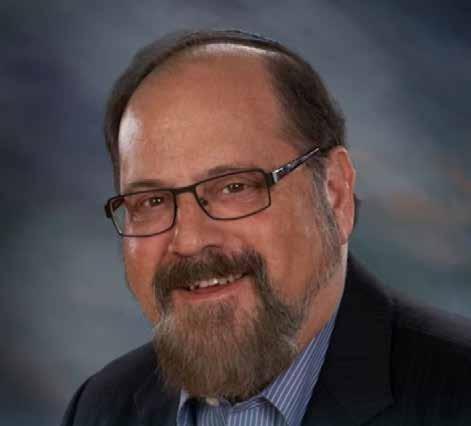
The newly named Stan Kasten Academy of Sports Science and Management will continue to offer Weber students a one-of-a-kind opportunity to explore careers in sports science, medicine, fitness, management, and business. Through specialized coursework, internships, and mentorship from industry professionals, students gain real-world experience and graduate with an Honors Diploma that sets them apart in college and beyond.
Beginning in the 2025–2026 school year, the Academy will launch a new course in Sports Media and Film, equipping students with the tools to produce and promote athletic content through digital and video platforms.
Rabbi Ed Harwitz, Head of School, expresses the appreciation and enthusiasm on the part of the entire Weber School community, noting that “graduates of The Stan Kasten Academy of Sports Science and Management will gain an education that prepares them for advanced study and professional work in college and careers through an academy that carries the name of an individual who exemplifies excellence in professional athletics and the highest values of Jewish tradition. The Kasten Academy is a powerful expression of Weber’s mission to integrate rigorous academics with meaningful character development and Jewish identity.”
Compiled by AJT Staff
The Jewish Future Promise (JFP), a global movement inspiring Jews and allies to commit at least 50 percent of their charitable giving in their estate plans to Jewish causes or the State of Israel, announced its 130,000th signer: Professor Jack Wertheimer, one of the foremost scholars of American Jewish life. JFP has united more than 130,000 promisers in a common Jewish cause, securing an extraordinary $5.25 billion in commitments. This unprecedented show of solidarity highlights the steadfast dedication of individuals, families, and family foundations worldwide to champion Jewish causes and ensure the resilience of the State of Israel.
Wertheimer, professor emeritus of American Jewish history at the Jewish Theological Seminary, is widely recognized for his groundbreaking research on Jewish identity, philanthropy, and continuity. His influential works, including, “Jewish Giving: Philanthropy and the Shaping of American Jewish Life,” have shaped communal understanding of how Jewish philanthropy sustains identity and strengthens institutions.
“Jack Wertheimer has spent his career studying the trends that shape Jewish giving and Jewish continuity,” said Mike Leven, founder of the Jewish Future Promise. “It is only fitting that he him-
self would become a promiser, reinforcing not just through his scholarship but through his personal legacy that the Jewish future must be secured.”
In signing the Promise, Wertheimer emphasized that Jewish philanthropy is more than generosity; it is responsibility: “The Jewish Future Promise is a valuable tool to educate Jews about their obligations to one another. It encourages families to talk across generations, to share values, and to commit to enriching Jewish life now and into the future.”
“Professor Wertheimer’s signature represents more than a milestone,” said Hadara Ishak, president and COO of the Jewish Future Promise. “It symbolizes the bridge between deep Jewish scholarship and lived Jewish responsibility. His commitment reminds us that the Jewish future is not guaranteed unless we act boldly together.”
The Jewish Future Promise does not receive any of the pledged funds directly. Instead, they serve as a catalyst for meaningful intergenerational dialogue, inspiring individuals to ensure that a significant portion of their estate or planned charitable giving supports the Jewish community and/or the State of Israel.
Compiled by AJT Staff

Synchronicity Theatre’s production of “The Rocket Men” will run from Oct. 10 to Nov. 2 // Photo credit by Casey Gardner Ford
Synchronicity Theatre is proud to announce its upcoming production of “The Rocket Men” by Crystal Skillman, launching Oct. 10, as part of a National New Play Network Rolling World Premiere in partnership with Phoenix Theatre Cultural Centre (Indianapolis, Ind.) and Angels Theatre Company (Lincoln, Neb).
Told with theatrical boldness and historical bite, “The Rocket Men” pulls back the curtain on a little-known corner of the American space program. In this gripping new play, six women step into the shoes of some former Nazi scientists who escaped Germany and found refuge — and power — in North Alabama. As they recount the rise of rocketry in America, the play dares us to ask: who gets written into history, and at what cost?
“As a granddaughter of a Holocaust survivor, this story shook something loose in me,” says Rachel May, Synchronicity’s artistic director and director of the production. “Crystal’s script is sharp, surprising, and full of theatrical invention. It reclaims the lost voices of women erased by war and science alike, and asks us to
reimagine what patriotism really looks like.”
This marks Synchronicity’s fifth NNPN Rolling World Premiere and continues their commitment to producing bold new work that centers women’s voices and challenges audiences to think deeper. The Breman is one of the show’s community partners.
Featuring Atlanta-based artists Laura Boston Edwards, Amelia Fischer, Imani Joseph, Gillian Rabin, Suzanne Roush, and Vallea E. Woodbury, the production will feature scenic design by Gabrielle Stephenson, costumes by Hollis Smith, lighting by Elisabeth Cooper, sound by Claudia Jenkins Martinez, projections by Amanda Sachtleben, and props by Tierney Breedlove. Swing actors include Irene Polk and Maya Kelch. Stage management by Cloud Cruz. Tickets ($25–$45) are available at synchrotheatre.com. Special “Adventurer” tickets are available for $10 for every performance. Performances at Synchronicity Theatre, One Peachtree Pointe, 1545 Peachtree Street NE, Suite 102, Atlanta, GA 30309.

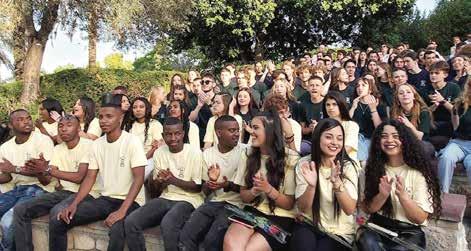
These teens in Hadassah‘s Youth Aliyah villages have already endured more than most can imagine. Hadassah wants to turn silence into song. Music becomes their lifeline.
Hadassah Greater Atlanta and the Super South Tri-Region of Hadassah proudly announce the launch of Harmony of Healing, a moving fundraising campaign to support children in Hadassah’s Youth Aliyah Villages — offering the transformative power of music as a path toward healing, connection, and hope.
These villages serve children from Ukraine, Russia, conflict-affected areas of Israel, and from lands around the world — many of whom arrive with deep emotional scars. Having lost homes, loved ones, and stability, they often face language barriers, trauma, and feelings of isolation.
But music is a universal language — and Hadassah is using it to change lives. Through Harmony of Healing, funds will provide musical instruments, professional instruction, mentorship, and therapeutic support. The campaign empowers youth to heal and grow through music, helping them find belonging and

confidence while forging friendships in harmony with others.
“These children have endured unimaginable hardships,” said Michele Rubin, national chair of Youth Aliyah. “But with your support, music can become their lifeline — a tool to play their way forward and transform trauma into triumph.”
Join Hadassah in supporting the next generation — one note at a time. Make a tax-deductible contribution today: https://bit.ly//HadassahsHarmonyofHealing
Hadassah, The Women’s Zionist Organization of America, Inc., is a volunteer organization that inspires a passion for and commitment to the land, the people, and the future of Israel. Through education, advocacy, and youth programs like Youth Aliyah, Hadassah builds bridges to brighter futures for children around the world.
Compiled by AJT Staff





By Robert Garber
Congregation Beth Shalom is celebrating the completion of renovations to their social hall, complementing the congregation’s kosher kitchen. The $50,000 overhaul, made possible by a single donation during the High Holidays in 2024, made a variety of changes. These included repainting the entire hall, adding sconces between the windows, and putting in window treatments, new chandeliers, wall hangings, and a new screen and sound system.
Beth Shalom president Fred Rich discussed how the project came about.
“We had one of our congregants donate a large amount of money, last October, actually, right after Yom Kippur, so we decided we were going to renovate the social hall,” said Rich. “We wanted to have more events booked in our social hall, so I brought in one of our congregation members, Robyn Anshell, who does interior design, and she helped me coordinate the whole program, along with Alan Kaplan, our VP of administration,
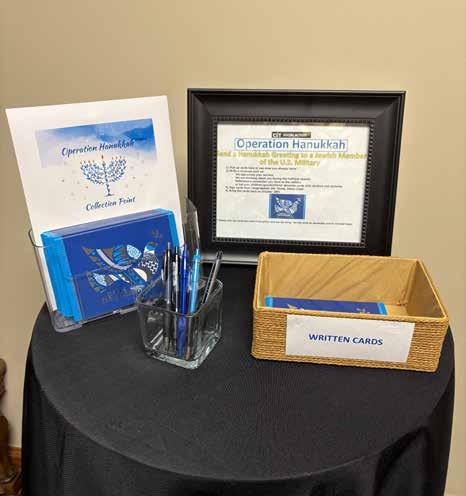
and Loli Gross, our administrator. We totally renovated the social hall. It took about three months, and it’s brand new.”
Rich hopes that the new amenities, compounded with Beth Shalom’s pre-existing ones – including the kosher kitchen – will help bring more people to rent out the space.
“We now rent the kitchen or the social hall out by the hour, or the day, or the week. We’ve got an incredible sanctuary, we’ve got classrooms, we’ve got meeting rooms, we’ve got a library,” said Rich. “We’re pretty equipped right now.”
He believes the space, which comfortably seats more than 200 guests, will be perfect for lifecycle events like weddings, bar/bat mitzvahs, baby namings, and brit milah, as well as for corporate gatherings and community celebrations.
As for how the congregants felt about the renovations – according to Rich, there were nothing but glowing reviews.
“[They] love it,” he said. “It’s brand new. It’s like coming into a new social hall.”
By Robert Garber
While Chanukah is still a few months out, now is the perfect time to partner with Congregation Dor Tamid to give Jewish American soldiers a bit of holiday cheer.
The congregation’s Operation Hanukkah, which will send Chanukah cards to soldiers, comes from the work of one of their members, Miranda Rosenblum, who has been sending out as many as 150 Chanukah cards annually by herself since 2017, when she was doing charity work with the Order of the Eastern Star.
“They’ve been doing Christmas cards for the troops for years,” said Rosenblum. “And since the rest of the Eastern Star was doing Christmas cards for the troops, to the tune of like 40,000 a year, I thought that maybe I could do the Jewish troops.”
Rosenblum, who grew up in a nonJewish military family, was inspired by something her parents did during the holiday season.
“We were a family of four, but
dad always brought home airmen that didn’t have families where we were and couldn’t get home for the holidays,” she said. “So, it’s something that I’ve always been around – the adoption, as it were, of the stragglers. When this became something that I was introduced to, I thought that was something I could do to continue what my parents had taught me.”
Now, through Congregation Dor Tamid, this mitzvah is beginning to reach more people than ever before.
“It’s become a sisterhood project,” Rosenbaum said. “They’re also letting everybody else know that they’re welcome to save my hands and write some cards as well.”
If you would like to participate, simply buy Chanukah cards that do not have glitter and are not shiny, write a message in the cards, sign them from your congregation or city (do not put your personal name), and put them in blank, unsealed envelopes. Please reach out to Miranda Rosenblum at mmallison@gmail.com for details on where to drop the cards off.
In recognition of the Atlanta Jewish Times celebrating its 100th year from its first edition in 1925, the AJT will re-publish articles from the Southern Israelite from editions dating as far back as 1929, the earliest edition available through the Digital Library of Georgia. All of the Southern Israelite editions, from 1929-1986, can be viewed at gahistoricnewspapers.galileo.usg.edu/lccn/sn78003973/
Please enjoy this retrospective of Jewish journalism in Atlanta and across Georgia, and thank you for supporting the Atlanta Jewish Times for the last 100 years.
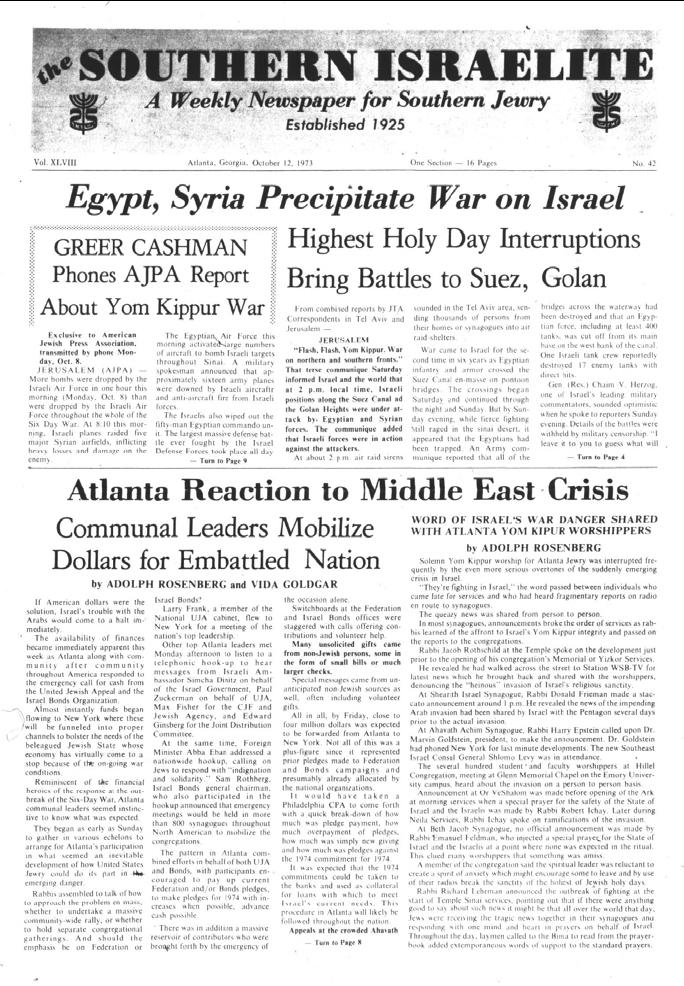

I have been rummaging through the corner of our basement storage room that I refer to as my genizah.
By definition, a genizah — “hiding place” in Hebrew — is a room for the storage of deteriorated sacred texts and ritual items invoking the name of G-d.
Mine is a more secular repository, with plastic bins, cardboard file boxes, and shoeboxes stacked on shelves.
During the Days of Awe between Rosh Hashanah and Yom Kippur, Jews are called to engage in introspection and repentance. I am engaged in a more tangible inventory, examining every item in these containers, a different version of “this is your life.”
As I handle decades-old documents, photographs, and newspapers, in a room with adequate light and a dehumidifier, I think of my great-grandfather, who spent months sifting through — and breathing the dust of — the centuries-old contents of the genizah of the Ben Ezra Synagogue in the Fustat section of Old Cairo.
Doubting the future interest of historians in such items, I have recycled a more than two-foot high pile of paper, including faded pictures of baseball players glued to the yellowed pages of a boyhood scrapbook, dry cleaning and room service bills from a hotel in Saudi Arabia, and reports that I wrote in fourth grade about Abraham Lincoln and George Washington (both received a grade of 100/A). My high school and college report cards, along with SAT and ACT score reports, went into a shredder.
I kept a notice from my high school journalism teacher informing me, mid-way through the semester, that I was failing her class; something about not turning in assigned work. I passed the course. I just wasn’t big on what I called “practice journalism.”
I disposed of rejection letters (circa 1983) from about 40 newspapers where I sought work after a layoff. The upshot was that I left newspapers for television news.
In the end, the journalism thing worked out OK, I think.
My parents gave each of their five children large envelopes of family history. Among the treasures I received was my father’s autograph collection, some obtained when he accompanied his mother as she worked at Jewish charity events in New York City. The signatures include Paul Robeson, Eddie Cantor, Benny Goodman,
combining technology and artistry to create exceptional dentistry.





Oscar Levant, FP Adams, and other luminaries.
I was surprised by a folder of handwritten correspondence between my paternal grandfather and justices of the Supreme Court of the United States, many concerning his treatise on legal protections for trademarks. Among the correspondents were Oliver Wendell Holmes, Benjamin Cardozo, and Louis Brandeis.
I found a typewritten original of “Two Minutes for Prayer,” a bitter, multi-stanza poem that my grandfather wrote after his World War I service as a U.S. Army intelligence officer. The poisonous gas he inhaled in France likely exacerbated breathing issues that led to his untimely death at age 47.
I found my draft card, which I thought was lost years ago. Draft numbers were issued for my birth year, but the last Vietnam War inductees were called up the year before. I remembered my number as being in the 300s. It turned out to be 039, which might have put me in harm’s way.
I have bins filled with decades of historic newspapers and magazines, some from well before I was born and others as recent as this year. As this collection continues to grow, I wonder: Who will want this printed history?
Stuffed into a large plastic bag and a shoe box are hundreds of baseball cards, from the 1960s and early 1970s. I need an assessment of whether any have significant monetary value.
I ached reading letters and cards from family and friends whose passing I mourned. Tucked inside a birthday card was an uncashed $10 check from my maternal grandmother. It probably kept her from balancing her checkbook.
I have at least a thousand editions of the family letter that my father wrote on manual typewriters, using carbon paper. (For those unaware, the “cc” on emails stands for carbon copy.) As my fingers caress the onion skin paper, I can see my father and hear the clatter of the keys. Just as I find online newspapers sterile, compared with newsprint I can hold, as emails these letters would have lacked the same emotional weight.
I have decades of my father’s journalism, from the newspaper at the Charleston Naval Yard that he edited in the latter stages of World War II to articles that he wrote as a lay leader in the Reform movement and as the editor and publisher of magazines in the hospitals field.
The boxes contain envelopes stuffed with my clippings, beginning with a junior high school newspaper and continuing through high school and college, and then from my first full-time job as a newspaper reporter. One tub is half-filled with articles and columns written for the AJT.
The process of sifting through the contents of my personal genizah slows as I encounter lives that impacted my own, come across reminders of my successes and regrets, and lose myself in reading accounts of the events that continue to shape the world I entered seven decades ago. My form of introspection may be less religious, but it is meaningful. ì

Michael A. Morris Publisher
I attended services at Chabad of North Fulton again this year and Rabbi Minkowicz never ceases to inspire me. This year, he began by explaining to us that as he spoke to others about this year’s sermon, he was floored by the concern and negativity, Oy. Antisemitism is rampant, the war Hamas started on Oct. 7 is now beginning its third year, hostages still remain, hate, hate crimes and vandalism are all markedly up and the antipathy for Israel does not seem to stop growing. A tremendous amount of fuel for this year’s dialogue (more Oy).
But, my rabbi thought, this is not what I want to pontificate about when I have my once-a-year opportunity to speak more closely with the largest part
of my congregation. This is not the message I want to proliferate; this is not what this past year represented to me and this is not what I believe G-d wants me to focus upon. So, with new eyes, my rabbi looked at the last year and saw something very different.
What Rabbi Minkowicz saw was a resurgence of Jewish pride, a resurgence of support for Israel, a strengthening of the bonds within our community and with Jewish organizations that support our community and Israel. Rabbi Minkowicz suggested we add a little Judaism to our Oy and this year, make it Joy. Stop kvetching for what has happened and start kvelling about our response. Look at what Israel has accomplished under duress. Look at our response to the wave of antisemitic behavior. Look at how we, as Jews, are closer today and more proud of our heritage today than we were a year ago. Look at how much more we are doing to stand up for what we believe as others feel the need to increasingly berate us.
I left the synagogue a very proud




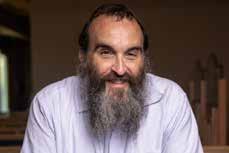
Jew. I left with a new perspective. Yes, we must report on the atrocities that are occurring around the world and within our community. But we must also see the heroism in those that stand up to this blind hatred. We must see the heroism in ourselves and the pride that is growing within ourselves and the community. I am not denying that there is more Oy today than last year, but there is Joy, too, let’s make it more Joy this year than last year.
One last thought my rabbi offered. Oct. 7 occurred on Simchas Torah in 2023. This is one of the happiest celebrations on the Jewish calendar. We celebrate a gift rather than acknowledging

something solemn. Hamas may have had many reasons for choosing this date, but one thing is now clear. Simchas Torah has a wound on it, a stain. Let’s clean this wound and remove this stain. Let’s celebrate even more this year and show the world that terrorism will not win, not today. I do not always take part in Simchas Torah celebrations, but I am going to this year. I am going to let my Jewish pride get the best of me and celebrate being Jewish with my community. I want Hamas and all the terrorists in the world to know they have not dampened my spirit and pride, and they to should consider more celebrating and less killing. ì



By Bob Bahr
Two of America’s leading religious scholars visited Emory University’s Center for Ethics to discuss how we make amends for our behavior to others and how that is shaped by modern spiritual practice.
The discussion called on issues of trust and forgiveness and how America’s leading religious traditions deal with reconciliation and the repair of human relationships. The program was called simply, “Atonement and Repentance,” and featured Lewis Newman, a leading scholar of Jewish ethics. Dr. Newman is the author of “Repentance - The Meaning and Practice of Teshuvah.”
Appearing with Dr. Newman was Teresa Morgan, who taught for a quarter-century at Oxford University before coming to the Yale School of Divinity two years ago. She is an ordained Episcopal priest and the author of the recent book “Trust in Atonement - G-d, Creation and Reconciliation.”
The interfaith program was moderated by Jonathan Crane, who is a Reform

rabbi and a scholar of bioethics and Jewish thought at the Emory Center. In his introduction, he pointed out that the issue of how to best repair human relation-

ships is approached in ways that vary with each religious tradition.
“Wrongdoing and suffering are part and parcel of the human condition,” Crane
said. “Some traditions speak of these kinds of experiences in terms of transgression and atonement, while others use language like sin, guilt and repentance.”
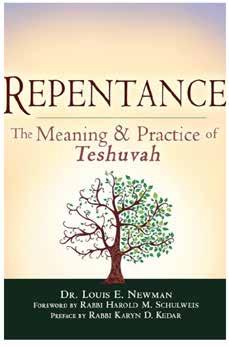
Louis Newman has written, “RepentanceThe Meaning and Practice of Teshuvah.”
According to Dr. Newman, the Jewish practice of repentance begins with teshuvah, a Hebrew word derived from a root which means “a turning or returning.” We are asked, particularly on the Day of Atonement, to return to our better selves where righteousness takes precedence over a life of transgression against moral and spiritual teachings. We are asked to return to G-d, to return to who we truly are.
“We’re not really finished with the process of repentance until we have faced our demons inside,” Newman emphasized. “We are required to make restitution and apology to the people we’ve harmed, made public confession, and finally, face a situation in which we have the opportunity to show that we have literally changed. We must show that we are not the same person we were, and we will not fall into the same mistake again.”
And, while the process of repentance against the breaking of G-d’s law, such as the violations of the Sabbath and the regulations governing kashrut or kosher living, begins and ends with G-d, violations against others we’ve offended must begin with them. So, while the Yom Kippur holiday is favored as a time of return, the possibility to repent in always present.
“If you are truly repentant,” Newman points out, “the gates of repentance are always open. So, no matter what the impediment was that seemed like it made it impossible, the tradition seems to want to come back again and again, to never give up the possibility of transformation, the possibility of repair, Because if you give that up, then you’re lost, then you are forever chained to the sins of the past.”
In commenting on those principles,
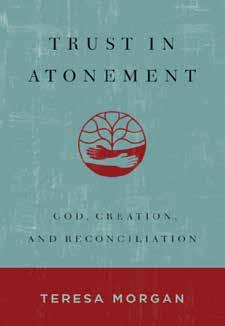
Teresa Morgan’s most recent book, “Trust In Atonement” was published in 2024.
Dr. Morgan referred to her own understanding of how the theology of trust makes repentance possible.
“The trust that G-d puts in us, I think, implicitly, is the kind of trust that says humanity is basically a good kid, you know, humanity will become good, given, as it were, time and opportunity and the gates being left open.”
But Jewish tradition emphasizes more than the role of G-d’s love and forgiveness. Teshuvah, according to Dr. Newman, cannot occur until we take responsibility for what we do to others and become accountable to them.
“Teshuvah says to me, the concept of repentance says to me, yes, I am absolutely accountable for what I did, and I have to absolutely own it and claim it. And when I do that, I can then, in fact, get the benefits of G-d’s ultimate forgiveness. And there’s a way forward. It’s not one or the other. They’re both.”
We are asked on the Day of Atonement to repair our relationship with G-d but first repair our relationship with other human beings we have hurt. We are asked to take that first step before G-d can respond to the work of teshuvah.
In summarizing his understanding of a return to righteous living, Dr. Newman pointed to a teaching from the Talmud that says that in the place where a repentant person stands is even more holy than where a perfectly righteous stands. How is that so, he asked.
“In the process of making mistakes and repairing them, we deepen our humanity. We come to appreciate the flaws in others more fully, so that we can forgive others in the same way that we recognize ourselves as flawed.” ì

FRIDAY, OCTOBER 3rd • 11:00AM
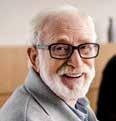


The Atlanta Jewish community is coming together to embrace interfaith families in new and powerful ways. On Aug. 19–20, six Atlanta-based Jewish organizations gathered for the launch of B’Yachad Atlanta — the largest and most diverse cohort of its kind to date. This nine-month program is aimed at helping Jewish organizations increase belonging for interfaith couples and families.
Led by 18Doors — the only national organization dedicated to fostering inclusion of interfaith families in Jewish communities across North America — B’Yachad Atlanta is a partnership with the Jewish Federation of Greater Atlanta, which is not only convening and co-funding this cohort but also participating as one of the organizational teams. The cohort brings together synagogues and organizations representing a wide crosssection of Jewish life: Congregation Dor Tamid (Reform), Temple Kol Emeth (Reform), Congregation Or Hadash (Conservative), the Jewish Federation of Greater Atlanta, URJ Camp Coleman, and the Jewish Fertility Foundation.
“As someone who grew up in an in-

terfaith family myself, I want to build a community of true belonging at Or Hadash for every single person who wants

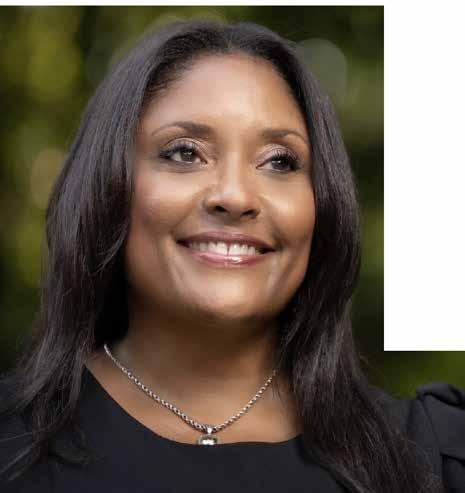

to make this their spiritual home — especially our folks from interfaith families,” said Rabbi Lauren Henderson of
Congregation Or Hadash. “We want to help people move from being welcomed to being fully integrated and empowered


members, and I know through B’Yachad we’ll get the support and resources to make this shift.”
B’Yachad builds on findings from the 2023 study conducted by 18Doors and the Jewish Federation of Greater Atlanta, The Future of Interfaith Inclusion in the Atlanta Jewish Community survey, which recommended creating a “think tank of rabbis and community professionals to dream and experiment with different interfaith initiatives.” Through this program, professionals from participating organizations will collaborate, share ideas, and develop innovative ways to strengthen inclusion for interfaith families across the greater Atlanta area.
Over the next nine months, these organizations will develop personalized action plans to create more inclusive spaces for interfaith couples and families. The program will include ongoing professional development seminars, oneon-one coaching sessions, and training in organizational change, helping guide each organization through meaningful and sustainable change. The B’Yachad curriculum, inspired in part by Keshet’s Shivyon project, covers key topics such as the fundamentals of interfaith inclusion, how to market successfully to interfaith couples and families, current research on this demographic, effective and sensitive communication with interfaith couples and parents, and the importance of inclusion and intersectionality.
Samantha Kurgan, vice president of community engagement at Federation, adds: “By investing in and partnering with organizations like 18Doors, Federation helps strengthen the broader Jewish
ecosystem supporting efforts to create communities where interfaith families and couples feel not only welcomed, but truly seen, valued, and empowered to belong. We are excited for and deeply appreciative of the important work this cohort will undertake over the next nine months to help build a more inclusive, vibrant Atlanta Jewish community.”
Atlanta joins a growing list of communities participating in 18Doors’ B’Yachad. The Houston cohort concluded in June 2025, and the Chicago cohort is currently underway, marking a period of exciting momentum for this national initiative.
“As a resident of Atlanta, I am proud of 18Doors and the local leadership for working to build a welcoming and inclusive community. We deeply appreciate the partnership with the Federation and local agencies and congregations in our work. I look forward to working with other locally based and national organizations who are committed to the idea of belonging. Atlanta is fortunate to have deeply committed lay leadership as well as professionals who share our commitment and values,” said Mike Wise, CEO of 18Doors.
B’Yachad Atlanta aims not only to deepen the work of each individual organization but also to strengthen collaboration across the community. Together, participants are setting the stage for a more vibrant, inclusive, and welcoming Jewish Atlanta.
For more information about B’Yachad and 18Doors, please visit 18doors.org/interfaithinclusionproject/ ì
Compiled by AJT Staff


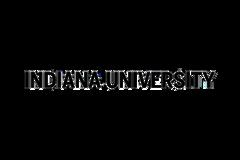

● Combine a Jewish Studies major with 250+ minors/ certificates or double major Robust career services Israel-supportive campus World-renowned faculty
*$20,000/year for 4 years

By Marcia Caller Jaffe
As his three-year-old Chabad center The Buckhead Shul grows by leaps and bounds, Rabbi Yisrael New is using his relatability to stage a series of intimate parlor meetings at some of Buckhead’s most well-heeled addresses.
With no mention of fundraising, Rabbi New has gathered disparate eager listeners to hear his approach to community and the ease with which the Chabad philosophy approaches inclusion with deep layers of purpose, laced with fun activities and sociability. The 90-minute sessions so far have been held at Park Place, The Gallery, The St. Regis, and Park Avenue. Note that all are along Peachtree Road with easy access to Rabbi New’s shul on East Wesley.
The most recent event at The Gallery, on Thursday night, Sept. 4, was arranged by Josh Ahlzadeh with whom Rabbi New credits for using his real estate sechel to find the current building after exiting a smaller space on Pharr Road. Rabbi New hinted that they might soon even out-
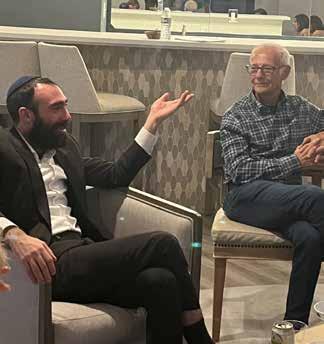
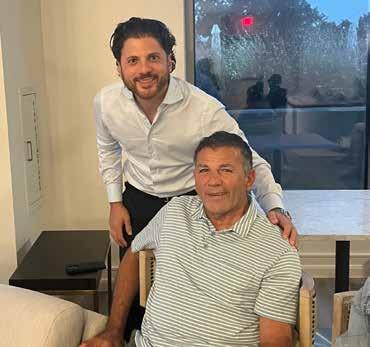
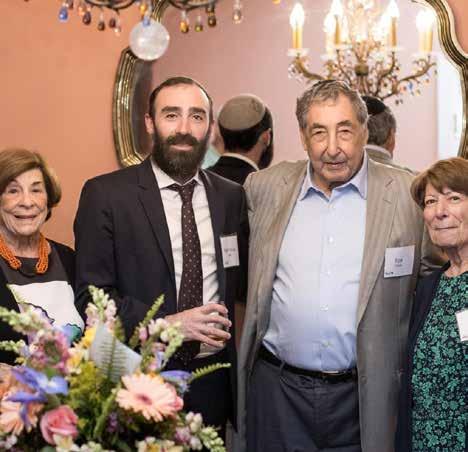
as being “even more blatant. We do need to be thankful that we are in the U.S.”
Rabbi New’s main message was, “We have to be strong, stand tall and not break. Be flexible like a candle … in storms, we grow tougher. Jews bend and spread light with unity.”
He recalled that the late Sen. Jessie Helms was notoriously anti-Israel, yet his North Carolina Chabad chose to honor him. Over Alan Dershowitz’s objections to it, Helms ultimately became a supporter.”
Rabbi New concluded, “Our mission is to use a higher standard using reality and showing morality.”
He explained that his shul’s original “sweet spot” was the younger generation, and he’s now putting more effort into multi-generations with abundant programming. Most impressive was their Tu Baav Day “for finding love” attracting 400 younger singles on Aug. 6, which sprang from 75 just a few years ago.
Rabbi New fascinatingly explained his family dynamics where seven of the siblings are Chabad-related rabbis, mostly in Atlanta, one in Seattle and one in Florida … then one in real estate and one a kosher caterer locally. Also, he referred to his “Hollywood style” sister’s husband who has started a sizable Chabad in Cumming.
“We thought he might be nuts, but he made it a reality!”
Some were fascinated by Rabbi New’s sharing of many of the remote thriving Chabads from Bangkok to India


… just about everywhere but Iran, Afghanistan, Iraq and Yemen … even Saudi Arabia has thriving a Chabad. Rabbi New made a point of explaining how pivotal the rabbi’s wife’s role is in building, thriving, education … “sometimes most important.”
Chabad fan Joyce Shlesinger cosponsored one of the earlier meetings with Kitty and Judge Ezra Cohen in Park Place Condominiums. She recalled, “This first meeting had upwards of 30 folks, mostly from our Park Place building. Our goal was to introduce a new group of Jewish people to Chabad. The best part was the open Q & A where everyone was made to feel comfortable.”
Some had suspicions about whether there was a strict nature, which Rabbi New was clear about the role of acceptance, while some areas of tradition would not be compromised.
Co-hosts Kitty and Ezra Cohen spoke of Chabad’s magic in offering traditional Jewish learning without judgment as an outreach to all Jews. Recently, Judge Cohen served as the judge in a Shavous panel where various issues were debated, like, “What’s the best way to find a Jewish mate? And “Should Haredi Jews have to serve in the IDF?”
Rabbi New closed by sharing events like Tashlich at the nearby Duck Pond, mah jong and poker games, a pickleball tournament, delicious Shabbos and holiday dinners, and his plan to put up a huge menorah. ì





Gorgeous sunroom,great
family room, offices-you name it
Active Swim/tennis neighborhood close to everything
By Chana Shapiro
We know that increasing numbers of Jewish university students are studying Yiddish. That’s no surprise; however, one does not expect to find a Catholic, first-generation Vietnamese American from Atlanta in a Yiddish class at Yale University, and after graduating studying the mamma loshen at the prestigious Steiner Summer Yiddish Program.
Meet 25-year-old Peter Tran.
The seven-week Steiner Summer Yiddish Program at the Yiddish Book Center in Amherst, Mass., accepts motivated students who come to immerse themselves in Yiddish language and culture. Students practice with renowned scholars and dorm in a communal residential setting. This summer, there were 17 students in the program, including Tran and an international Chinese student from England.
Tran notes, “I never expected to find myself studying Yiddish for an entire summer in rural western Massachusetts, but G-d works in mysterious ways. To
Him, I am forever grateful for putting into my life such dedicated Yiddish instructors and a supportive community of budding Yiddishists. I enjoyed having a small part in the revitalization of Yiddish.”
Tran fully celebrated Shabbat with his classmates; Shabbat observance was a cultural and educational experience more than an exclusively religious one, thereby accommodating the range of religious observance of everyone. The group recited Netiilat Yadaim, Kiddush, and Hamotzi, and they celebrated Havdalah together Saturday evening. The group attended Yiddish language classes and seminars, had homework, and enjoyed extra-curricular events like song and dance workshops. During the school day, only Yiddish was spoken.
The Steiner experience included Yiddish-related internships. For his internship, Tran separated existing large Yiddish audio files into smaller, more accessible units. Then, he located the original sources and matched them to the new corresponding units. The process,

which Tran welcomed, was challenging, to say the least.
When asked about spending his summer studying and socializing with Jews, Tran smiled, “I learned new things about Jews. For example, I didn’t know such a thing as Jewish geography even existed, but I saw it in action when one of my Steiner classmates found out that I had chatted with one of his cousins during Yale’s Commencement Weekend.”
Tran was personally affected. He says, “Seeing young Ashkenazic Jews so invested in learning a deeply rooted Jewish language reinvigorated my own goal of reaching a high level of proficiency in Vietnamese, which I speak conversationally with my parents at home. And I can understand where the wry and cynical Jewish mindset comes from. This characteristic found throughout Jewish humor would help Jews cope with and survive hostile environments. Jews perhaps found some levity in satirizing the absurdities they witnessed and endured.”
Tran’s introduction to Yiddish occurred at his local library’s annual book
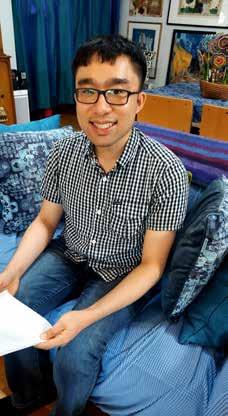


give-away when he purchased the classic 1968 compendium, “The Joys of Yinglish,” by Leo Rosten. Although Tran had been intrigued and curious enough to select the book, which humorously explores “Yinglish,” common words that have made their way into American English due to the influence of American Ashkenazic Jews, he didn’t delve into its contents until he spent a lot of time reading during the pandemic. The book, by Rosten, the famous Jewish raconteur, novelist and social scientist, that Tran bought as a curiosity along with a stack of other books, turned out to be the catalyst for his further exploration and study. Tran was both intellectually and emotionally drawn to the world of Yiddishkeit.
Tran explains this attraction, smoothly using Yiddish as he speaks, “Yiddish presents a history of tragedy and at the same time resilience. I could already notice the similarities between the Jewish and Vietnamese immigrant experiences. Stories of fleeing the alte haym [homeland] were not unlike those from my own family. Moreover, the high regard Jews have for learning deeply resonated with me as well. Not having college degrees certainly didn’t stop my parents from nurturing in me a devotion to learning from an early age. Getting down to tachlis [the bottom line], I was drawn to learning Yiddish because first, I wanted to learn for the sake of learning, and second, it may have been a fortuitous outgrowth of my affinity for thinking and seeing the world, well, Jewishly.”
In his senior year at Yale, Tran decided to take advantage of the Yiddish class with professor Joshua Price that was offered. “Once I knew that Yale offered Yiddish, I jumped at the opportunity to learn it, especially with Dr. Price, since I wanted to make my senior year that much more memorable,” he explains. He learned to read the Hebrew letters, enabling him to study Yiddish. There were four students in the class.
Now that he has graduated, Tran is returning to the same law firm in which he had interned during 2021-22, one of his two gap years during college. That year, he also took some classes at Georgia State as a guest student. During his second Yale gap year of 2023-24, he worked part-time at the National Center for Civil and Human Rights.
Yiddish isn’t the only language in which Tran has proficiency: he studied Latin throughout high school and Vietnamese and Korean at college. He plans to study at least one more Southeast Asian language, and he’s keen to learn Farsi and Hebrew. His university degree is in anthropology; however, he is also interested in history, ethnography, and
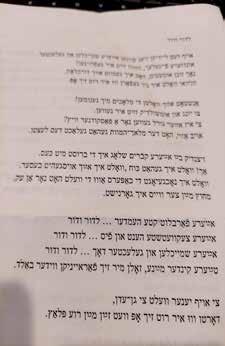
international relations, all fields which can utilize knowing anthropology and speaking many languages. Tran enjoys reading, listening to all kinds of music, journaling, and writing poetry.
The translation of two stanzas of one of Tran’s poems, which he originally composed in Yiddish, follows. There is a backstory to the poem. Among the Yiddish films the Steiner students had watched, one was the post-Holocaust 1948 Yiddish film, “Our Children,” in which two Polish Jewish comedians visited an orphanage of children who had survived the Holocaust. The comedians were trying to entertain these children. Tran says, “My immense grief and anger while watching that film directly inspired me to write this Yiddish poem.”
If only the angels had taken me instead of all of you!
Too young and blameless you all were. Is your destiny nothing but a sick joke? If so, the Angel of Death has gotten the last laugh.
Sitting by your graves, I beat my chest in anger.
Oh, were I to have the strength, I would have protected all of you better. To the end of the Earth would I have chased down your killers.
I know nothing else beyond my grief.
Tran, who is now working in an Atlanta law office, is eager to meet people in Atlanta who speak Yiddish, so he can further his conversational ability. If you would like to speak Yiddish with him, please email him at Federalistpaper10@gmail.com. ì



OCTOBER 24 & 25 | 6-10PM
OCTOBER 26 | 5-9PM
Embrace the spirit of the season and join CNC for flexible hikes, a bar, food truck, and good old-fashioned family fun! In addition to our traditional non-scary hike, visitors can now experience The Haunted Quest scavenger hunt.



Compiled by AJT Staff
The AJT asked a panel of local realtors to discuss the current state of the metro Atlanta real estate market. Topics included key challenges in the current residential market, emerging trends, and advice for both buyers and sellers. Read on to find out about Atlanta’s current real estate market.
What are some key challenges in the current residential real estate market?
A primary challenge in the current residential real estate market is the continued sparsity of existing housing at affordable prices. Inventory at the $300,000 to $400,000 market is desperately needed. The second challenge is high interest rates. Although interest rates are still high, they are expected to come down. The effect will be enormous. A buyer that could only afford $300,000 a year ago, should soon be able to afford from $400,000 to $500,000.
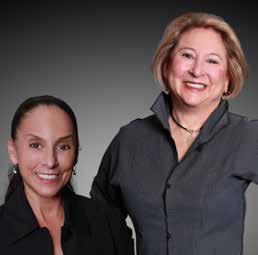
The sweet spot for interest rates is 5.25 percent. At that point, there should be a balance between a buyer’s market and a seller’s market, so if interest rates do come down, the buyer’s market will strengthen. A much sweeter spot for interest rates would be anything below 5 percent.
Are there any emerging trends in today’s market?
An important trend in today’s market is Atlanta’s strong relocation sector. Atlanta’s lower cost of living, its moderate climate, quality of life and strong business base are all factors in the decision-making process for relocating buyers. Age 55-plus relocating buyers continue to be a strong element in the suburban sectors of Atlanta where less expensive land can be found to develop 55-plus communities. Second trend, as housing prices increase, more buyers are going to attached townhomes and small lot subdivisions in the suburbs.
Can you give any specific advice to potential homeowners looking to buy this year?
Don’t wait for the interest rates to drop. The pandemic rates aren’t coming back, but affordable rates are. However, when rates do drop, prices will increase. A potential drop is expected in the fourth quarter of this year, so if a buyer has a property under contract, they are in a great position to take advantage of any interest drop. Second, know your budget and finances. Get a credit pre-approval from a lender before you are under contract. A pre-approval will make your offer look stronger and will increase your confidence and decision making. Last, while we all want everything in our new home, buyers should prioritize what they really need vs. what they want and stay flexible. This is especially important to the first-time homebuyer.
Conversely, any advice for those looking to sell?
First, choose an experienced listing agent that knows your market and knows how to market it both online and off. Price it right so it sells quickly. The longer a property stays on the market, the more questions a potential buyer will have. Make your home show ready. Enhance its curb appeal with seasonal landscaping and fresh paint. Stage it by eliminating clutter, removing personal items, and cleaning it thoroughly. Consider a professional stager if your interiors are dated. Make repairs before your property goes on the market. You want buyers to be able to visualize themselves living in the space, while minimizing anything negative.
What are some key challenges in the current residential real estate market?
Affordability and availability are huge challenges for homebuyers in our current market. Values of homes have continued to rise but rates are still higher than they were several years ago. The number of properties on the market in the Atlanta area are at the lowest they have been in years.
Are there any emerging trends in today’s market?
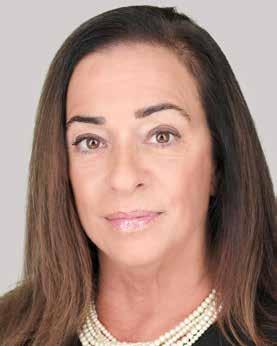
A new trend that Coldwell Banker is providing is offering sellers to do home improvements and repairs prior to listing their home. The must have for most homebuyers is an updated kitchen, upgraded bathrooms and updated paint. The program lets sellers do the improvements they need before listing with no minimum or maximum housing price to enroll and no minimum project cost. The cost of the improvements comes out of the seller’s net proceeds at closing. The benefit of this program is that there is no interest or fees, nor are there any credit checks of pre-qualifications.
Can you give any specific advice to potential homebuyers looking to buy this year?
The greatest source of wealth building is home ownership. Over the past 20 years, the median sales price in Atlanta, even taking into account the great recession, has increased by more than 150 percent. Rents continue to increase, and they afford no equity or tax benefits. The key for first time homeowners is to buy as soon as possible. Interest rates fluctuate and there are options to obtain a lower rate initially and to refinance as rates decline. For existing homeowners looking to sell and then buy, realize that if you do not recoup as much as you envision (and most sellers don’t), it is likely that you will not pay as much for your new home as you might otherwise.
Conversely, any advice for those looking to sell?
The first step when contemplating selling your home is contacting your real estate agent. The next step should be to meet with the agent to understand your motivation in selling and to begin the process of getting the home ready to put on the market. This may entail decluttering and organizing your home so it will show in the best possible light. Have your agent make you aware of the market conditions in your area and be realistic of your pricing, understanding that the longer a home stays on the market, the less it will bring. Trust your real estate agent.

What are some key challenges in the current residential real estate market?
One of the biggest challenges today is the combination of high interest rates and low inventory. Many homeowners are holding onto their low-rate mortgages, limiting new listings. Meanwhile, buyers are facing affordability concerns with both home prices and borrowing costs on the rise.
At The Zac Team, we’ve seen how this creates a gap in expectations — sellers want top dollar, while buyers are cautious. With over 40 years in the Atlanta market, we guide our clients with the experience and clarity needed to make smart decisions in uncertain times.
Are there any trends in today’s market?
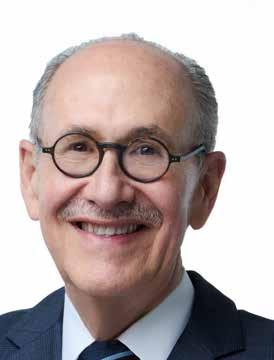
Yes, we’re seeing several key trends:
A growing demand for suburban and more affordable areas, especially among remote or hybrid workers.
More informed buyers, who do their research and lean on experienced agents for insight.
Increased use of creative financing — including seller concessions, rate buydowns, and assumable mortgages — to make deals happen.
At The Zac Team, we stay ahead of these trends by continually analyzing the market and adapting our strategies. Being proactive, not reactive, is the key to success in today’s climate.
What advice would you give to potential homeowners looking to buy this year?
Be financially prepared and partner with the right team. Get pre-approved and know exactly what you can afford with current rates.
We’ve helped almost 7,000 buyers and sellers in all kinds of markets. We know how to spot opportunities, avoid pitfalls, and make the process smooth from start to finish. Whether it’s negotiating the right terms or identifying the best neighborhoods, we’re in your corner every step of the way. And always remember: You marry the house, but you date the rate. If interest rates drop later, refinancing is an option — but buying a great home in the right location is a long-term win.
What advice would you give to those looking to sell this year?
Today’s market rewards preparation and smart pricing. Buyers are more selective, so homes need to be priced right and presented well to stand out.
The Zac Team delivers a full-service listing experience — including staging advice, professional photography, and customized marketing. We know what local buyers are looking for, and we help sellers present their home in the best possible light.
Flexibility is also important. With rates affecting affordability, some buyers may request seller-paid closing costs or rate buy-downs. Sellers who are open to creative solutions often close faster and with better outcomes.

The Atlanta residential real estate market continues to evolve, presenting both challenges and opportunities for buyers and sellers alike. According to Peggy Feldman of the Barocas & Feldman Team, understanding current trends and adapting strategies is key to success.
What are some key challenges in the current residential real estate market?
Inventory remains tight in many desirable neighborhoods, and while interest rates have stabilized somewhat, affordability continues to be a concern for many buyers. Sellers are also facing increased competition, making it more important than ever to stand out with proper pricing and beautiful showing condition.
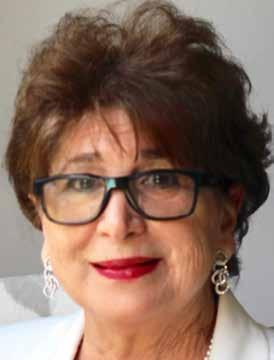
Are there any trends in today’s market?
Buyers are becoming more strategic, often looking for homes that offer value and flexibility. There’s a noticeable uptick in requests for seller concessions—particularly toward closing costs—as buyers seek ways to offset financial pressures. Meanwhile, homes that are move-in ready and priced competitively are seeing the most activity.
What advice would you give to potential homeowners looking to buy this year?
Peggy recommends that buyers work closely with experienced agents to identify opportunities and negotiate effectively. “Don’t hesitate to ask for concessions,” they advise. “In today’s market, many sellers are willing to contribute toward closing costs or make other accommodations to close the deal.”
What advice would you give to those looking to sell this year?
For sellers, presentation is everything. “Homes must be in exceptional showing condition,” says the team. “And pricing needs to be compelling — buyers are savvy and won’t overpay. A well-prepared home with a strong marketing strategy will always attract attention.”
With over 75 years of combined experience, Peggy Feldman of The Barocas & Feldman Team continues to guide our clients like family through the complexities of the Atlanta market with insight, integrity, and results. ì

By Marcia Caller Jaffe
One of Atlanta’s most visible amateur pickleball players, Dr. Ross Greenberg, might be at the Marcus Jewish Community Center of Atlanta (MJCCA) one week in his notorious orange shorts, then in a dashing cruise ship officer’s uniform as the physician for the Norwegian Cruise Line’s (NCL) Pride of America’s Hawaiian route, the next week.
Then again, Greenberg, a boardcertified emergency medicine physician, might be chumming with top notch acts like the Rolling Stones at arenas or at Atlanta Braves games, assuring that the acts and players are hydrated, as he is on call for “whatever.” All this and being officially retired, the dashing Greenberg, a widower, is open to finding a “cabin mate” with whom to share life. He said, “Being a good athlete and pickleball player would be a nice start.”
Serving as a ship’s physician comes with a lot of responsibility. In addition to tending to 2,200 passengers, another 900 crew, and there are no days off. He usu-

ally does two-week shifts, as one-week, back-to-back tours, but takes off months in between.
“As glamorous as it sounds, I won’t do 10 weeks at a time,” he stated. Dr. Greenberg also has an onboard staff of
three nurses and one administrator to run the medical department. Looking at the practicality of emergencies, Greenberg chose this route because it’s the only U.S.-based ship that has American hospitals at each port, each day, which means that acutely sick people, perhaps suffering on-board strokes, are not cared for in long segments on the ship. Make no mistake, a cruise doctor sees the whole gamut of illness and must evaluate and treat or not, on the spot.
He stated, “Basically it’s fun work. If the body is warm, it means they [passengers] are not dead,” he joked tongue in cheek. In terms of rank, Greenberg’s uniform sports 3.5 bars, close to the “top of the chain” with the captain who wears four bars.
Greenberg reports, “Medical care is available 24 hours a day. Quality of the care can vary from ship to ship, but for the most common issues, most ships do a fine job.” What are some common ailments to treat on board? Typically, viruses, states Greenberg, including COVID, Norovirus, Influenza, high fever, dehydration,
Decatur’s Jewish community thrives on connection, safety, and now, a new enclave built with peace of mind at its core
For Jewish families in Atlanta, safety and community have always gone hand in hand. From strengthening synagogue security to creating neighborhood watch groups, there has never been a time when protecting our families and traditions felt more important.
In recent years, Atlanta’s Jewish community has responded to new challenges with resilience. Institutions like Congregation Beth Jacob and others across the city have invested in strong security measures, ensuring daily services, youth programs, and holiday gatherings can continue with confidence. But beyond our synagogues and schools, families increasingly ask the same question: where do we live that provides us both community and peace of mind?
Decatur: Stability and Community Together
For many, the answer has been Decatur. Known as one of metro Atlanta’s safest and most family-friendly areas, Decatur offers not only security but also connection. Families here are minutes from Beth Jacob

and the wider Jewish life of Toco Hills, close to kosher shopping and dining, and part of a neighborhood where faith and tradition remain central.
Decatur is also practical. It is near Emory, CHOA, the CDC, and Northside, making it ideal for physicians and researchers. Executives benefit from its short commutes to Midtown and Buckhead. Families enjoy excellent schools and a true sense of neighborhood. It’s no surprise that Decatur continues to attract both long-time Atlantans and newcomers relocating for work and community.
Highgrove Court: A New Enclave for a New Era
Building on this foundation, Highgrove Court introduces something rare: a boutique enclave of just five executive homes in Decatur’s 30345 zip code. Here, security is not an
afterthought — it is part of the design.
Each home features video surveillance, perimeter lighting, and secure entries. With HOA approval, the neighborhood may also become a gated community, offering an added layer of protection in uncertain times. For Jewish families, this brings the reassurance that home is not only beautiful but also safe.
“In today’s world, safety isn’t optional — it’s essential.”
The homes themselves are designed for family life: six to seven bedrooms, six baths, and dual primary suites for multigenerational living. Kitchens, equipped with Wolf and Cove appliances, can be further customized to include a kosher second kitchen or prep area. Covered porches with fireplaces invite gatherings year-round, while optional finished basements provide space for guest suites, media rooms, or additional kitchens.
The Right Time to Join Highgrove Court is still in its early stages, which means early buyers have the opportunity to personalize finishes and layouts. Two homes are already nearing completion, and three more will soon break ground — making this the perfect time to secure a place in the community before it is fully built out. With only five homes available, opportunities are limited. For those seeking the security of Decatur’s Jewish community paired with the privacy of a boutique, gated enclave, Highgrove Court offers a timely and compelling option.
If you, or families you know, are considering a move within Atlanta or relocating to join our community, now is the time. Schedule a private tour today at HighgroveCourtHomes.com and see how Highgrove Court can provide the safety, community, and home your family deserves.
“In uncertain times, peace of mind begins at home — and for Jewish families, Highgrove Court offers exactly that.”
www.highgrovecourthomes.com

cough, sore throat, nasal congestion, nausea, vomiting, and diarrhea. If someone reports to the medical center, they will be tested, and if found positive, they will be isolated.
Greenberg shared some steps to reduce the risk of contagion: Buy the cruise medical insurance and check the coverage before sailing. Wash hands frequently, avoid overly crowded areas in confined spaces. Use clean utensils when at the buffet. Avoid undercooked foods. Pack common medication to treat fever and diarrhea. Then, watch out for slips and fall, lacerations, bumps, bruises. Wear nonslip shoes when walking around the ship, especially when the boat is moving. Take care during excursions, as cuts, scrapes and falls are very common. Use common sense: like wearing sunscreen, sunglasses, hats. Stay hydrated and avoid excessive alcohol intake.
With a long career in emergency medicine, Greenberg 71, has treated and
traveled with Army Rangers and served as an FAA flight examiner and medical review officer. He’s worked at Atlanta Veterans Administration Medical Center; Piedmont Newnan Hospital, Savannah (Level 1 Trauma); Doctors Hospital, Augusta; Florida Hospital Waterman, Eustis, Fla.; Minnie G. Boswell Hospital, Greensboro; Morgan County Hospital, Madison; Upson Regional Medical Center, Thomaston; Walton County Hospital, Monroe; Gwinnett Medical Center, Lawrenceville, after serving as assistant professor, Department of Emergency Medicine, Emory University, and Grady Memorial Hospital.
Greenberg has a vision to give back and hopes to volunteer in Ukraine or in similar dangerous frontline work. He has two adult children in New York City and considers traveling the world a passion. He is off to Australia in December.
Plan not to get sick on board, but if you do, you will be in very good hands. ì
Joined the Fir m, 2009; West Highland Terrier; Specialist in Strategic Napping, Lobby Security, and Midday Snack Negotiations

Hi there,
It’s me, Henry! As the leaves change and the air gets crisp, I’ve been thinking about what matters most: home, family, and making sure everyone and everything is looked after
Just like raking leaves, estate planning is one of those things that’s easy to put off But trust me, it feels so much better when it’s done Whether you ’ re updating your will, setting up a trust, or planning for future care, now is the paw-fect season to get things squared away
You can sniff out more infor mation on our website anytime. While you ’ re there, don’t miss the chance to sign up for our free educational webinars and monthly newsletter The humans are great at explaining the serious stuff, and I make sure they don’t bury the lead or the treats Give us a call at 770-229-5729 to fetch yourself an appointment to give you and your family some peace of mind this fall.
Tail wags and treats, Henry Goldberg Chief Love Off icer & Proud Leaf Chaser
By Marcia Caller Jaffe
Now retired, Stephen Silver, PhD might be seen playing pickleball at the JCC. Not long ago, he was a business professor at the very elite Citadel Military College in Charleston - despite his lack of business experience.
What he lacked as a “biz whiz” was augmented by his peripatetic life of travel. Silver grew up in Washington, D.C. before moving to Ankara, Turkey, and then Seoul, Korea, where his father worked for ICA, the precursor of USAID. After those four years, he returned home to complete high school in Philadelphia. After high school, he joined the Peace Corps and spent two years teaching in a bush secondary school in Kenya.
He relates that this was the most formative two years of his life. First, because he was on his own, and second, because the volunteers were taught Swahili, which allowed him to communicate with the locals. After returning home and completing a master’s in economics, he took a job with the United Nations Development Program in Chad, then did a stint as an economic advisor to USAID in Cambodia. It was a short stint because in April 1975, the Khmer Republic came to an end, and he was evacuated from Phnom Penh.
He explained, “I realized that I would need the PhD to be considered a ‘real’ economist. After completing that, I taught at three colleges: Bentley in Waltham, Mass., VMI in Lexington, Va., and finally at The Citadel. My teaching assignments were mostly non-

economics courses: statistics, finance, international business and operations management. Understand, while I was teaching in business disciplines, I had no business experience to speak of. The only reason they entrusted me with teaching international business is because of my overseas background. As for finance, I learned it sitting in on my colleagues’ courses at The Citadel.”
During his tenure there, he witnessed much change. Having started there in 1990, he noted

that women were admitted in 1996. He recalled very few Jewish students. He estimates 20 and commented, “I can’t say that Jewish faculty experienced discrimination; and to the best of my knowledge, neither did Jewish students. I had two brothers who were Conservative, observant, Jews. They didn’t experience overt discrimination, and accommodations were made for them. And the same can be said of the Bahraini students - during Ramadan, for example, they were provided meals outside the normal hours.”
Silver jokes that one of his biggest claims to fame is teaching Nancy Mace as she was in his senior level production and operations management course. Mace went to UGA and is a U.S. Representative from South Carolina. He recalled, “While she did well in the course, I didn’t get to know her as she was not popular with her classmates and didn’t participate. Other cadets barely spoke to her, in part because her father was the Commandant of Cadets. That was a very trying period for the institution and as with the service academies, it was extremely challenging for them to recruit women. None of the military schools exceeded 10 percent women for a long time. This has changed in recent years. The service academies now average about 25 percent."
The Citadel is a historic public military college and one of the six U.S. senior military colleges. Students in the Corps of Cadets live under a strict military system. Daily life is highly regimented, with uniforms, formations, inspections, and leadership training. About onethird of graduates typically earn commissions as officers in the U.S. armed forces, though commissioning isn’t mandatory.
Silver added, “Faculty wear Army uniforms or that of their prior service if their rank equals or exceeds the rank based on their academic rank, to wit: colonel for full professor, LTC for associate prof and major for assistant professor. Freshmen are called ‘knobs’ for their shaved heads. Graduates need not serve in the military, and only about 30 percent do. The 11:1 studentfaculty ratio is low compared with most other undergraduate programs; El Cid is the teaching college which has master’s programs in business, engineering, and education."
Silver enjoys golf in addition to pickleball and is fluent in French and Spanish and does OK in Chinese. ì


“Eydie took care of us as though we were her own children. We had a horrible experience with another agent, and Eydie not only found our dream home but made the entire process feel seamless and hassle-free. Eydie is thorough, informative, savvy and effective. Anything we needed, Eydie was able to assist immediately. We never thought buying a home could be so smooth.”
- RECENT HOMEBUYERS
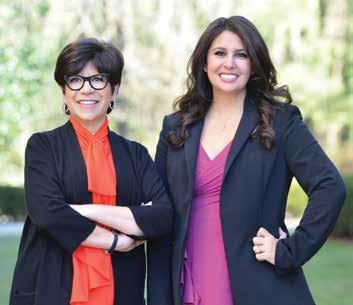




“Pailey was the ideal person to work with! She made every part of the process smooth and stress-free and went out of her way to find the right place for us. I would recommend Pailey to anyone looking for a place to live that wants A+ customer service.”
- RECENT HOMEBUYERS
By Marcia Caller Jaffe
Cobb County native Lindsay Gardner is someone you don’t want to meet - professionally. Her prior experience as a prosecutor revolved around putting away drug dealers, rapists, and the like.
Now, as senior managing attorney at the Georgia Bureau of Investigation, she assists the Investigative Division, Division of Forensic Sciences, Medical Examiner’s Office, and the Georgia Crime Information Center. She is also attached to the Gang Task Force, works with the policy and accreditation team, researches case law, teaches and trains law enforcement, and supervises employees.
She shared, “Attorneys at the GBI are similar to in-house counsel. The Attorney General’s Office represents the GBI in court, and we are the liaisons between the AG’s office and the GBI, gathering documentation and evidence, and walking our special agents and employees through the legal process.”
Curious about Gardner handling high profile cases? “I’ve found truth is far stranger than fiction. Just when you
think you’ve seen it all, there’s a crazier, more outrageous case. My specialty as a prosecutor was SVU (Special Victims Unit) cases – crimes against children and sex crimes.”
She’s had a serial rapist on the witness stand essentially admit to raping two women, convicted a man of an armed robbery after he got into a shootout in another county for committing another armed robbery of the exact same nature. She summarized, “Most of all, I’ve been honored to fight for justice for victims and survivors of crime from all walks of life.”
When asked to summarize her conviction rate, she said, “The most important aspect of being a prosecutor is the pursuit of truth and justice. Truth and justice may be a conviction, a plea to a lesser offense, or even a dismissal if there is a violation of a defendant’s constitutional rights.”
She harkens back to her childhood for her grounding. “My grandmother captivated me with stories of her own childhood, and in turn, arguing to a jury or teaching includes communicat-


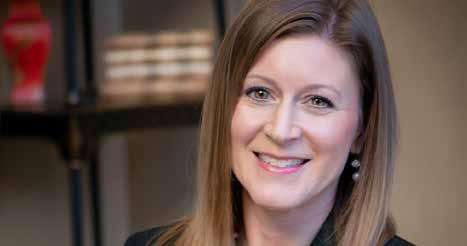
ing and describing events and concepts in a way people can relate to and understand. It’s also important to stand up for what’s right. We have a saying at the GBI – it’s about ‘doing the right things at the right time for the right reason.’”
Gardner earned a bachelor’s degree at the University of Georgia and her Juris Doctor at Southwestern Law School in Los Angeles. She recalled, “I had grand plans. I wanted to practice media and entertainment law, representing stars and athletes. That didn’t happen. It was partially due to my dad, whose employees stole from him. I gathered evidence for his case and turned it over to the District Attorney’s Office. Before I took one criminal law course, the prosecutor on my dad’s case pronounced I was going to be a prosecutor. I didn’t believe him, but when I interned in the Hardcore Gang Unit of the Los Angeles District Attorney’s Office, I quickly learned I found criminal law more intriguing than reading and writing contracts all day.”
For more than a decade after law
school, she prosecuted felony cases in two major metro Atlanta counties: Gwinnett County and then Cobb County. As an assistant district attorney, she tried felony cases from drugs and armed robberies to rapes, child molestations, and murders. She also coached mock trial at Emory Law School and taught at Emory’s Trial Techniques program.
Outside of her career, you can find Gardner training for a half-Ironman competition or “making a fool out of herself” for good causes: like dressing up in an adult spelling bee or playing a role in a murder mystery to raise money for children. She also served on the Dave Krache Foundation Board, a 501(c)(3) dedicated to raising money for youth to play sports. She is a Leadership Cobb graduate, and in 2022, was the recipient of the 22nd Annual Justice Robert Benham Award for Community Service.
On a lighter note, Gardner finds a perk of the job is being able to occasionally wear 511s, the “tactical pants for law enforcement personnel.” ì

By Marcia Caller Jaffe
Artificial Intelligence (AI) can cause head scratching alongside comments that it’s the “greatest current gift to humanity” vs. something to fear? So, we turn to experts to advise on how we harness it to use for good and with wisdom.
Atlanta native Mark Michelson, CEO of Stitches AI Training Solutions and Threads Strategic Research, has jumped all in to learn the industry and consult on its best practices to help avoid AI abuse.
His advice for businesses specifically begins, “Start with clearly defined problems, not solutions looking for problems. Ensure data quality — garbage in, garbage out. Begin with pilot programs before scaling. Invest in training your people, as AI amplifies human capability. Measure real business impact, not tech metrics.”
More importantly, he cautions against “implementing AI without understanding current processes well enough to know what needs improvement. Also, against ‘AI washing’—rebranding existing software with AI terminology without delivering real capabilities.”
Michelson teaches these business no-no’s: “Don’t automate broken processes — fix them first. Don’t replace human judgment entirely; AI should augment critical thinking. Don’t ignore privacy and security. Don’t expect immediate ROI, as implementation takes time. Don’t underestimate change management.”
For individuals, Michelson warns against sharing sensitive personal or financial information with AI platforms. And not making important decisions based solely on AI output — without verifying. “AI can be confidently wrong, so maintain healthy skepticism. Watch for investment scams promising guaranteed
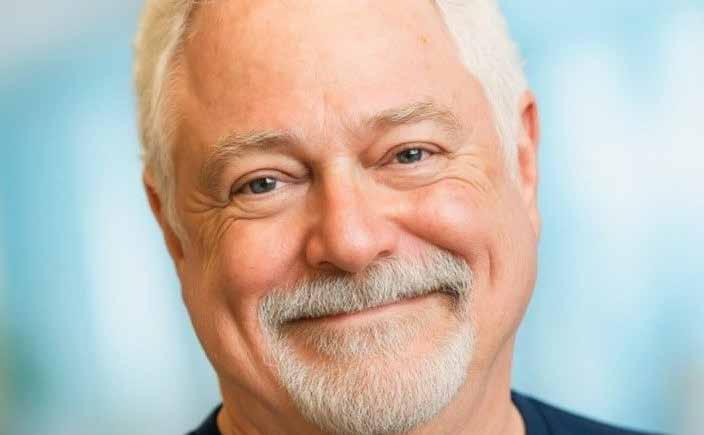
returns through ‘AI trading systems.’ Fake AI content services charging premium prices for basic automation. Phishing schemes using AI-generated voices or images to impersonate trusted individuals are all red flags.”
His custom training sessions offer four formats: two-day skill courses with online learning, homework, then sharing what’s been built. Five-day workshops meet weekly to create workflow agents with one-day “hackathon” classes where teams solve real problems.
Michelson has been entrepreneurial since childhood. After graduating from University of Georgia’s Grady College of Journalism in 1984, he started The Ad Shop at age 22. After a few years, he was drawn toward marketing research: focus groups, surveys, mystery shopping operations worldwide. He visited 73 countries and worked in 22 of them. When asked how one enters a new technology

and trends, which translates perfectly to understanding how technology works.”
Looking ahead, should workers be afraid of AI taking their jobs? Not so, says Michelson, “AI will create more jobs than it eliminates. Every major technological shift sparked job displacement fears, but what happens is transformation and new job categories. We’ll see roles in AI management, human-AI collaboration, and creative problem-solving we can’t imagine yet.”
field like AI at age 60, he replied, “The key is never stopping learning. I was an early adopter back in the days of punch cards, then the Commodore 64, TRS-80, and the Macintosh. My research background taught me to analyze patterns

In his spare time, Michelson shares a musical talent with sister, Jeni, who plays keyboard with her trio at many Jewish mitzvahs. Michelson is into monthly guitar jams at Steve Grossman’s Steve’s Live Music, where he conducts 25-30 musicians performing tributes to The Beatles, Eagles, Dylan, and Pink Floyd. He related, “Music keeps me grounded and balances the analytical work. Whether teaching AI strategy or jamming with friends, it’s about bringing people together and creating something meaningful. Technology changes, but human connections remain constant.” ì
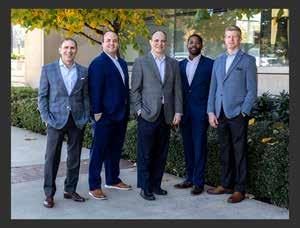
S u i t e o f S e r v i c e s
F a m i l y O f f i c e S e r v i c e s
l y s t r i v e t o p r o v i d e
v a l u e t o o u r c l i e n t s b y
a p p r o a c h i n g e a c h r e l a t i o n s h i p
w i t h a p r o f o u n d s e n s e o f p u r p o s e ,
f a m i l y c o n n e c t i v i t y , a n d e d u c a t i o n
W i t h a h i g h l y c r e d e n t i a l e d t e a m
w i t h o v e r 7 5 y e a r s o f i n v e s t m e n t
m a n a g e m e n t , e s t a t e , t a x , a n d
w e a l t h p l a n n i n g e x p e r i e nc e , w e
w o u l d b e h o n o r e d t o b e c o m e a
p a r t o f y o u r f a m i l y w h i l e
w e l c o m i n g y o u i n t o o u r s I n v e s t m e n t M a n a g e m e n t
W e a l t h & F i n a n c i a l P l a n n i n g
E s t a t e a n d T a x P l a n n i n g
B u s i n e s s S u c c e s s i o n
P l a n n i n g
L i f e s t y l e M a n a g e m e n t
C o n t a c t U s
Raanan Pritzker, CFA raanan pritzker@lplfinancial com pbfamprivatewealth com
Office: (404) 418-4444
5555 Glenridge Connector Suite 1075 Atlanta, GA 30342
By Fran Putney
Attorney Dax López believes in second chances. During his 11 years as a judge in DeKalb County, he always felt that everyone has the potential to turn around if given the chance. Today, as a personal injury attorney, López strives to give his clients, many from marginalized circumstances, the fairest outcomes he can obtain.
Despite more than a decade on the bench, becoming a judge wasn’t exactly on López’s career radar after earning both his undergraduate and law school degrees at Vanderbilt University. The idea started percolating when his friend and mentor, Tony DelCampo, reached out to López to see if he would be interested in succeeding him at the state court in DeKalb if he was selected for a federal position.
López, who was then a corporate lawyer and serving as president of the Georgia Hispanic Bar Association, recalls that he was surprised at the request, but decided to go for it. DelCampo ended up not leaving the court then, but it wasn’t long before another vacancy revived the opportunity. In 2010, at age 35, López became one of the youngest judges, and only the second Latino, after DelCampo, to serve in a Georgia court.
During his interview, when Gov. Sonny Perdue asked López, who was then a Republican, how he thought he would get elected in heavily Democratic DeKalb County when his appointed term ended, López said: “Well, governor, I’m a Puerto Rican Jew. Most people think I’m a Democrat.”
For his part, DelCampo encouraged López because, he said, “I found him to be an inquisitive and thoughtful young attorney with an excellent educational pedigree. When I was being considered for a position on the Federal Bench, I believed we needed to continue to have diversity on the trial bench.” He added, “I knew he had the personal and intellectual qualities to be an excellent jurist.”
“I loved it,” said López. “I thought I brought a different perspective to the court.” But being in a position to potentially change the trajectory of people’s lives was what motivated his work.
He explained: “I ran the Spanishspeaking [DUI] court that I inherited from Tony … I had several programs that help youth. I felt like I had a lot of freedom to … help people because in the misdemeanor world, sometimes called ‘the court of stupid mistakes,’ you have
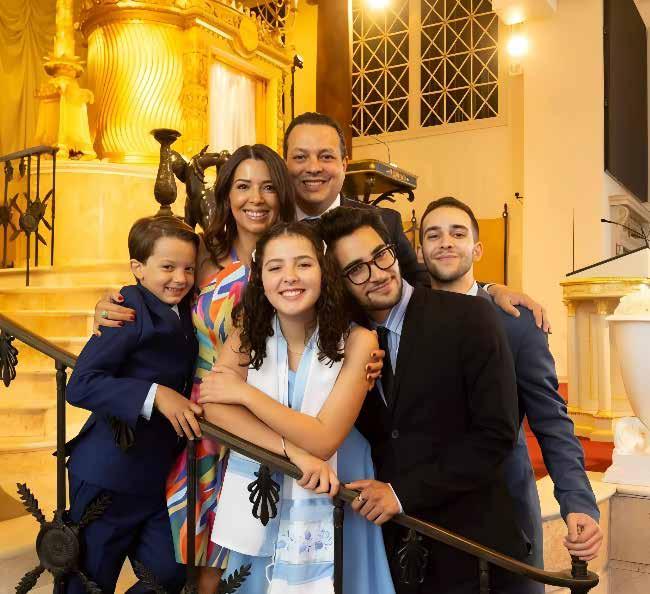
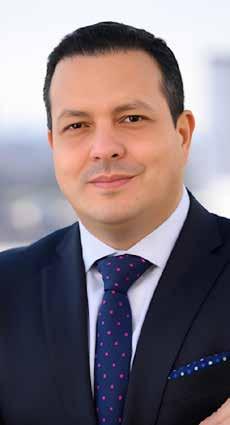
options. We don’t have to send you to jail. We can send you to treatment, or we can send you to do other things that aren’t jail-oriented.”
López’s journey to Judaism was also unconventional. Born into a Catholic family in Puerto Rico, López’s parents were already exploring other religious paths when his family moved to Augusta, Ga., in 1981 and Dax was 6 years old. Through a new Jewish friend, his mom and dad became interested in Judaism, although they couldn’t understand why the man never tried to bring them to his synagogue or convert them.
López tells the hilarious story about his family’s first attempt at a Passover seder when he was 12 and his brother was just 8. Long before YouTube, they used a VHS tape playing on a TV near their table, following everything the recorded family was doing, including the four cups of wine, not realizing that the children on the video were probably drinking grape juice. So, it was at the hands of his parents and in the name of Judaism that Dax and his brother first got drunk, López quipped.
When his father’s work as an engineer took them to Birmingham, Ala., the family had been studying and adopting Jewish practices for many years. But it took not three, but four, requests before
his parents could convince the Birmingham Conservative rabbi they were quite serious about undertaking conversion.
By the time Dax got to college, he had already long identified as Jewish, but it was his fraternity brothers who took him to a synagogue for the first time. López made his formal conversion at the end of his college sophomore year.
López left the DeKalb court in 2021 and joined DelCampo in his law firm, now called DelCampo Grayson López. Because their practice accepts only catastrophic cases, they work on cases involving severe injuries or death. Many of their clients are Spanish-speaking and some are undocumented, which has made it increasingly difficult to get justice because they are more afraid than ever of putting their name on a legal document.
López and his partners have obtained some remarkably high awards for clients, including a medical malpractice verdict that, at $77.5 million, was the largest in Georgia history. Another trial resulted in a $31 million verdict in a case involving the death of an undocumented father of three who was shot and killed in his mobile home complex while trying to stop his car from being stolen.
“The benefit we have here of being a low-volume shop is that I know all my clients. I know about their families. I know
I can work their cases out. I can spend real time strategizing and getting ready for their trials,” said López.
The work is very emotional, he added. Unlike court work, “Now you’re advocating for the family of someone who lost a family member. Or how many parents we’ve sat with who lost a child and are crying. But you have to be emotionally involved with your clients to some degree to make it work. You’ve got to care, otherwise it’s not worth doing.”
According to DelCampo, not only does López possess the legal acumen and what he calls “cultural competence” to well represent their clients, but Dax “has a heart for his community,” citing López’s service on the State Bar of Georgia’s Board of Governors and the hearing panel of the Judicial Qualifications Commission. López is also on the regional boards of Jewish organizations like American Jewish Committee and Anti-Defamation League.
López, who is an avid soccer fan eagerly awaiting the World Cup games next year, is married to Zulma López, an immigration lawyer who served as a state representative from 2021–23. The couple, who now live in Dunwoody, have two adult children and two schoolage children, and are members of The Temple. ì


At Canterbury Court senior living community, you can enjoy the company of extended family from all backgrounds. Whether you take advantage of the many scheduled social events or decide to stay in, you’ll enjoy a new, elegantly finished apartment home and enhanced amenities and services. All with the peace of mind of a continuum of care, if ever needed. With all this awaiting you, what are you waiting for?

To learn more and to schedule a personal tour, contact us today at 404-737-2639, visit CanterburyCourt.org/Mishpucha, or scan the QR code.
By Stan Garnet
Fall is just around the corner. The drop in the blistering heat of the summer is a good indicator of our seasonal change. As homeowners, we begin to shift our focus from keeping cool to staying warm. This seasonal change is the perfect time to check off your home’s safety tasks and ensure your furnace and fire safety systems are in top shape before the cooler months approach. From furnace inspections to testing fire detectors, initiative-taking steps now can help you avoid costly repairs and dangerous situations later
Let us consider the importance of inspecting your gas furnace for potential hazards, including cracked heat exchangers, and understand the role fire sensors play in protecting your home as temperatures drop. Here are some essential seasonal safety habits that every homeowner should adopt.
With the change in temperatures as fall and winter approaches, we begin to think of sitting in front of the fireplace and adjusting the thermostat to keep the house warm. Before you turn on that furnace, it is important to verify it functions correctly. A furnace in poor condition does not just lead to inefficient heating, it can also present serious health risks, including carbon monoxide poisoning.
One of the most common yet dangerous issues with gas furnaces is a cracked heat exchanger. This critical part of the furnace transfers heat from the combustion process to the air circulating in your home. When a heat exchanger cracks, it can allow carbon monoxide to leak into your living space. Since carbon monoxide is odorless, colorless, and tasteless, it can be impossible to detect without proper sensors. Exposure to even small amounts of carbon monoxide can be fatal, which is why furnace inspection should be a priority.
If you notice any strange noises, smells, or uneven heating, your furnace could be malfunctioning.
It is always best to hire a licensed HVAC technician to inspect your furnace at least once a year. They can identify cracks or other issues that may not be obvious to the untrained eye. Now is the best time for this inspection so when the cold snap arrives you are ready and safe.
By getting your furnace inspected, you are not only ensuring your home will be warm during the winter months but also protecting your family from the dangers of carbon monoxide poisoning.



It is common knowledge that most people tend to overlook their fire sensors. As the weather cools, we tend to rely more on gas appliances, space heaters, and other heating sources. With this increased use comes a greater risk of fire, so ensuring your home is equipped with working fire sensors is essential.
Smoke detectors are your first line of defense against fires. They should be installed on every level of your home, inside each bedroom, and in hallways leading to sleeping areas. To make sure they are working properly, test each detector monthly, and replace the batteries at least once a year, especially in the fall, when you are already doing other home maintenance tasks. If your smoke detectors are more than 10 years old, consider replacing them. If your smoke detectors only run off batteries, consider replacing them with hard wired detectors that communicate with each other.
Homes with gas-powered appliances, including furnaces, need carbon monoxide detectors. Just like smoke detectors, carbon monoxide detectors should
be placed near bedrooms and in hallways where the sound can be heard during the night. If you have a multi-level home, you should install one detector on each floor.
In order to stay on top of fire safety, create a routine to:
* Test your smoke and carbon monoxide detectors regularly.
* Change the batteries annually (or more often if the alarm sounds weak).
* Replace old detectors that may not function properly.
In addition to furnace inspections and fire sensor checks, there are a few more seasonal tasks that can keep your home safe during the colder months. Dirty or clogged ducts can reduce your furnace’s efficiency, making it work harder to heat your home. They can also cause a buildup of dangerous gases like carbon monoxide if the system is not properly vented. Ensure all vents and ducts are clear of debris and dust.
If your home has a fireplace, now is the time to clean and inspect the chimney. Buildup of creosote or soot can cause chimney fires. If you have not already done so,
hire a professional chimney sweep to remove debris and check for any potential blockages or damage. If you notice your furnace is running irregularly or not maintaining a consistent temperature, the thermostat might be faulty. A malfunctioning thermostat can lead to an uncomfortable home and inefficient heating, which could also drive up your energy bills.
Taking the time to inspect your furnace, check fire detectors, and complete other seasonal maintenance tasks is essential for keeping your home safe and warm as the temperatures drop. With these simple steps, you can prevent potential disasters and enjoy a worry-free winter.
Now is the perfect time to prioritize your home’s safety as the fall weather settles in. Do not wait until something goes wrong, schedule a furnace inspection, test your fire sensors, service your fireplace, and take steps to ensure your home is ready for the colder months ahead. A few initiative-taking checks today can help protect your family and your property all season long. ì

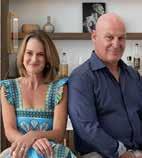


By Marcia Caller Jaffe
You may need to wait a bit to land a table at one of Sandy Springs’ hottest new pizza spots just across from Flower Child in the City Springs complex. Mister O1, the Miami-born artisanal pizza concept, opened this location in spring of 2025.
Recently named the No. 1 Most Popular Independent Pizzeria in America by PMQ Pizza Magazine’s 2025 Pizza Power Report, Mister O1 has a story to tell and distances itself from the “pizza joint” herd. Most of the ingredients are sourced directly from Italy or trusted local vendors, ensuring a fresh and authentic experience.
The concept was founded by Master Pizza Chef Renato Viola, who developed a passion for cooking as a child in Southern Italy. By age 11, Viola was apprenticing under some of Italy’s finest chefs. In 2014, he moved to Miami under an O1 Visa (a visa category reserved for individuals with “extraordinary artistic ability” and opened the first Mister O1 location. Today, the brand has expanded to more than 20 locations, earning praise including being named “Best Pizza in Florida” by Food & Wine in 2021.
“Mister O1 is all about delivering an extraordinary dining experience, and we’re excited to bring that to Sandy Springs,” said Viola. “This new location will introduce our signature pizzas and passion for quality to even more guests.”
Mister O1’s menu pizzas are known for their thin crust and light dough, which is prepared before resting for a minimum of 72 hours. The menu includes both classic and signature pizzas shaped like stars. Maybe it’s gimmicky, but it is a conversation piece; and above all, the staff is very accommodating. We substituted ingredients (took off meats, added veggies), one wanted gluten-free, another wanted all white, another insisted on extra crispy crust.
Our favorite pizza was the Star Michele ($19.99) with ricotta cheese, mozzarella, Italian tomato sauce, spinach, zucchini and fresh roasted pepper puree, the latter of which was smooth and rich. More than one commented that the star points were akin to hamantaschen. The gluten-free crust was thinner and traditionally round (the round styles start at and got high marks for the GF).
An enticing one to try would be Ginger Lilliam: Italian tomato sauce, fresh
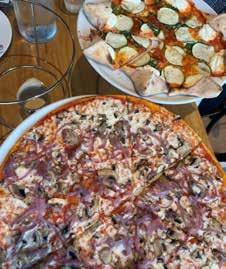



burrata, stracciatella cheese, black pepper, organic ginger. Who has ever had ginger on a pizza? Then, there’s Coffee Paolo: Italian tomato sauce, mozzarella, gorgonzola blue cheese, natural honey, coffee, and spicy salami calabrese (optional).
The menu also includes calzones, salads, antipasti, and dessert pizzas, paired with a curated selection of Italian wines and beer. Pizza yes, but the HUGE salads are also part of the experience -sharable for a table of four. We had the romaine Caesar ($10.99) with focaccia croutons and tangy dressing. Could have used some anchovies! Also, the Greek salad, Greta ($12.99), had the requisite feta, ka-
lamata olives, both enough for leftovers. There is a Create Your Own Salad option. Even more fun is the Mister O1 olive and truffle oils, and balsamic vinegar in bottles starting at $15.99 (as a to go gift, no charge for having tableside with meal).
There’s one outrageous bottle: Spicy Italian EEOV $15.99. Yowzer, it’s HOT!
For dessert, we had the Nutella and banana calzone ($13.99) with large segments to share.
The Sandy Springs location has a modern, trendy, 3,100-square-foot space, seating 30 indoors and an additional 30 on the patio. The white umbrellas add a European touch. The overall design is casual, yet sophisticated. The wine
and “sparkling” and beer menu is well matched. Glasses are $14.95 with ales at $8.95. A bottle of Chianti Grati is $47.95. Only the Prosecco Clara C is $2 more. Couldn’t help but notice a private room labeled “Pizza School,” which is currently scheduled once a year - November (sold out) and November 2026 (dated TBD). The class is offered at majority of the Mister O1 locations. All Mister O1’s have the same menu with one or two special variations based on regional preferences.
For more info, please visit www.mistero1.com. They don’t host events or take reservations - everything is first come, first served. ì

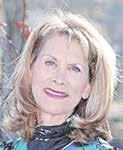
Georgia Brown and Dr. Alan Gardner have more than a medical profession in common … especially if one likes inspirational awardwinning photography of Carolina swamps, countrysides in Cornwall and cascading waterfalls. Brown, a registered cardio invasive specialist and IR technologist, saw the “light” when she was matched up with Dr. Gardner, a Marietta dermatologist, as a photo buddy.
All that bloomed into romance and romantic scenery in their Old-World charming manse scoring a lot of “Bests in Class.” The site-specific home has a traditional bent without unnecessary formality resulting in clarity of light with the empowerment of photography making for an artful setting. Collectables like original maps from the 1600s lend an air of intrigue alongside their own photography that just might be interpreted as paintings.
Take the tour of the scenery and the shots of scenery.
Marcia: Describe the history of the house.
Alan: It was built in 1992. Three years ago, we had a major renovation with builder Joey Miller. We have 7,500 square feet and used David Incorporated for some of the décor like the dramatic alcove off the foyer with the Moroccan urn. There also is one of my photos taken in England. Allan Struletz, landscape architect, designed the backyard panorama based on a photo I saw of a European villa with a back terrace.
Georgia: We love our outdoor space and enjoy sitting on the patio watching the deer, birds, and an occasional bear. It’s also relaxing during thunderstorms.
Marcia: Many “collected” things are assembled here.
Alan: The main rug is a 100-year-old antique Persian from the area of Sultanabad. We have decorative plates from Italy, tapestry pillows from Belgium, and an antique Tiffany-style horse. In the living room is my father’s favorite: Steuben Glass’s “Arctic Fisherman.”
Georgia: I selected the perfect chandelier. We waited eight months postpandemic for its arrival. I collect natural stone spheres from travels. Alan commis-
sioned a painting over the fireplace by Patrice Marchal. The other main “painting” in the formal living room is actually one of Alan’s photos of an Irish castle ruin.
Marcia: Lot of history in the dining room.
Alan: The painting is of my mother in 1945. My uncle was in the Army during World War II; and as he entered Germany from Italy, he came upon a starving German civilian. After feeding him, the artist painted my mother’s portrait from a photo that my uncle carried with him. The other portrait is of my father, a marine in World War II.
Marcia: Your library is a treasure trove of …
Alan: I have an antique (early 1900s) NCR cash register next to a whale I carved out of pink marble. My photo is of a Cypress Lake during autumn along Georgia’s coast. The photo by the cash register was taken in the ACE basin estuary, part of an old Southern rice plantation in South Carolina Low Country.
Marcia: Share the provenance of your maps.
Alan: I collect rare antiquarian world maps from the Dutch Golden Age
of cartography. These are original maps dated 1630. I actually went to New York trying to find some old pirate buried treasure maps with “X marks the spot” and learned that pirates did not make these. Instead, I came home with these world maps.
Marcia: Georgia, how did you two build this photography life together?
Georgia: We met through a mutual physician friend who matched us as “photo buddies.” Fifteen years later, we are happily married. Photographically, my aesthetic is moody, intimate landscapes and subjects with a touch of drama. I’m most proud of my waterfalls in New Hampshire and tulips from Amsterdam. We’ve had wonderful experiences photographing together in Iceland, Italy, England, Ireland, Canada, Holland, Belgium and coast to coast in the U.S. and Hawaii.
Marcia: How did photography become your passion?
Alan: As I began hanging the photographs in my office, I noticed that many patients spent time viewing my art. It allowed for a relaxed dialogue, creating a special patient/doctor bond. Patients started to take a special interest in my art and wanting to know our next


destination and were excited to see future photographs. Photography to me is the “art of seeing.” It incorporates light, tells a story, and allows me to be artistically and emotionally creative. It expresses an idea and rewards the viewer. I put my personality in the photo.
Marcia: You are known for gold leaf.
Alan: “National Geographic” magazine awarded one of my photos as a Top Photo of The Year/ Gold Medal Winner. I also won Prix de La Photograph de Paris, Gold Medal Nature Category with my “Great Egret,” and also “Autumn Reflections.” My printer is a wide format 44-inch Cannon Pro 4000 which allows large printing and fantastic detail. I create a particular style of black and white photos using Photoshop. Then, on some special types of art papers, I apply 24K gold leaves to the photograph resulting in a gold toned piece of art.
Marcia: Magic in the kitchen?
Georgia: I prepare Ina Garten’s lemon skillet chicken as an easy yet elegant dish for company. My “claim to fame” is my universally loved Sloppy Joe’s, which I prepared for Alton Brown, who declared them “the world’s best.” Alan is famous for his Duck a l’Orange and “Brownie Pie.” ì




Top Left: Alan’s
of Cypress Lake won a gold medal in the landscape category in the PX-3 Prix de La Photograph de Paris.
Top Right: The dining room has Kindle furniture and a portrait of Alan’s mother, 97, who lives in Walterboro, S.C.
Below: The photo of these egrets won Dr. Gardner a gold medal in the prestigious PX-3 Prix de La Photograph de Paris world photography competition
Left: The dramatic foyer boasts Asian antiques as Georgia and Alan look on.

Yom Kippur in Gainesville, GA – 7 to 8 p.m. At Chabad of Hall County, it doesn’t matter what your Jewish background or beliefs are. It doesn’t matter how often you’ve stepped foot in a synagogue — or even if never at all. We’ll take great strides to ensure your High Holidays are meaningful, inspiring, and filled with joy. We take joy seriously at Chabad. It’s at the heart of everything we do. We worship with joy. We kibbitz with joy. Even the price of admission will put a smile on your face. It’s free. Advanced RSVP at https://tinyurl.com/ybspnryz is required.
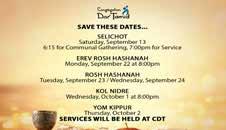
High Holidays at Congregation Dor Tamid – 8 p.m. Join Congregation Dor Tamid for Kol Nidre. Learn more at https://tinyurl.com/yhyj84m9.

High Holidays at Congregation Ner Tamid (West Cobb) – 8 to 10 p.m. Join Congregation Ner Tamid (West Cobb) for Kol Nidre. Register at https://tinyurl.com/3t24hh9k.
Thursday, October 2
Yom Kippur in Gainesville, GA – 9:30 a.m. to 1 p.m. At Chabad of Hall County, it doesn’t matter what your Jewish background or beliefs are. It doesn’t matter how often you’ve stepped foot in a synagogue—or even if never at all. We’ll take great strides to ensure your High Holidays are meaningful, inspiring, and filled with joy. We take joy seriously at Chabad. It’s at the heart of everything we do. We worship with joy. We kibbitz with joy. Even the price of admission will put a smile on your face. It’s free. Advanced RSVP at https://tinyurl.com/ybspnryz is required.

High Holidays at Congregation Ner Tamid (West Cobb) – 10 a.m. to 6 p.m. Join Congregation Ner Tamid (West Cobb) for Yom Kippur. Register at https://tinyurl.com/3t24hh9k.
High Holidays at Congregation Dor Tamid – 10 a.m. to 7 p.m. Join Congregation Dor Tamid for Yom Kippur. Learn more at https://tinyurl.com/ yhyj84m9.

Taste Brookhaven 2025 – 5 to 9 p.m.
Join Explore Brookhaven for an unforgettable evening at Brookhaven City Centre, where the city’s vibrant food scene comes together for Taste Brookhaven, a one-night, all-inclusive celebration of flavor, art, music, and community. Reserve tickets at https:// tinyurl.com/v9fktp99.
Friday, October 3
Kabbalat Panim Shabbat Service5:45 to 8 p.m. Once a month at Congregation Dor Tamid will gather for a Kabbalat Panim, an Oneg Shabbat before services at 5:45 p.m. We will then move to the sanctuary to welcome in Shabbat together at 6:15 p.m. Find out more at https://tinyurl.com/47rs4bt3.
Yom Kippur in Gainesville, GA – 6 to 7 p.m. At Chabad of Hall County, it doesn’t matter what your Jewish background or beliefs are. It doesn’t matter how often you’ve stepped foot in a synagogue—or even if never at all. We’ll take great strides to ensure your High Holidays are meaningful, inspiring, and filled with joy. We take joy seriously at Chabad. It’s at the heart of everything we do. We worship with joy. We kibbitz with joy. Even the price of admission will put a smile on your face. It’s free. Advanced RSVP at https://tinyurl.com/ybspnryz is required.
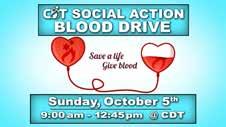
Sunday, October 5
Blood Drive – 9 a.m. to 12:45 p.m. Do a Mitzvah and donate blood at Congregation Dor Tamid! Sign up at https:// tinyurl.com/4dwcwjdn.

Play Tamid - 9:15 to 11 a.m. Play Tamid is led by Rabbi Jordan and is open to the public (Members and non-members of Congregation Dor Tamid). Enjoy crafts, songs, fun activities, and more for children under 4 (parent/ guardian must attend). RSVP at https://tinyurl. com/3farjzrc.

Hadassah Ketura Cooking Demo – 2 to 5 p.m. Hadassah Greater Atlanta’s Ketura Group cordially invites you to attend a special cooking demonstration by Michele Weiner-Merbaum who will demonstrate how to prepare a few easy, elegant handheld tidbits - perfect for appetizers or a charcuterie board. Location revealed at registration. To register go to https://tinyurl.com/yj2jduuj.

Harvesting Connection: A Sukkot Salad Workshop with Tal Baum –3 to 4:30 p.m. Celebrate the joy of Sukkot with a hands-on, family-friendly cooking experience! Join renowned chef Tal Baum for a festive Sukkot Salad Workshop, where parents and children (Kindergarten–4th grade) will team up to create delicious, seasonal salads together. Visit https://tinyurl. com/4vc7tbxw to RSVP.

Community October 7th Commemoration - 5 to 7 p.m. 730 days have passed, but the pain and loss remain ever present. The attack was not only on Israel or the Jewish people — it was an attack on humanity. Two years later, we continue to grieve, to honor the lives lost, and to demand the safe return of the hostages. At the same time, we stand resilient, united in memory and in our shared commitment to a future of strength and hope. We invite the entire Atlanta community — of all faiths and backgrounds—to join us in commemoration of October 7. Together, we remember. Together, we heal. Together, we stand as one. Registration is available at https://tinyurl.com/vt9nbzwt.

Texas Hold ‘em Poker – 7 to 10 p.m. Come one. Come All. Texas Hold Em Poker is NOW ONCE A MONTH! Men and Ladies, you are all invited to join Congregation Beth Shalom for an evening of Texas Hold Em Poker. Find out more at https://tinyurl.com/5n8bvkfv.
Monday, October 6
Mensches in the Kitchen – 9:30 to 10:30 a.m. Mensches in the Kitchen is a joyful, hands-on series where toddlers explore Jewish values through food and play. Each week, little ones will engage in taste-safe sensory activities, simple cooking and sharing, and interactive storytelling — all designed to nurture kindness, gratitude, and care for the world around us. Grown-ups will take home easy ideas and blessings to bring Jewish learning into the kitchen and everyday life. Let’s raise kind, curious mensches—one sweet moment at a time. Register at https:// tinyurl.com/47rurahm.
Yom Kippur
Wednesday, October 1 Light Holiday Candles at 7:03 PM
Thursday, October 2 Holiday Ends at 7:57 p.m.
Torah Reading: Ha’azinu
Friday, October 3 Light Shabbat Candles: 7:01 PM
Saturday, October 4 Shabbat Ends: 7:54 PM
Sukkot
Monday, October 6 Light Holiday Candles at 6:57 PM
Tuersday, October 7 Light Holiday Candles after 7:50 PM (from a pre-existing flame)
Wednesday, October 8 Holiday Ends at 7:49 PM
Shabbat, Intermediate Days of Sukkot
Friday, October 10 Light Shabbat Candles: 6:51 PM
Saturday, October 11 Shabbat Ends: 7:45 PM
Shemini Atzeret
Monday, October 13Light Holiday Candles at 6:48 PM
Tuersday, October 14 Light Holiday Candles after 7:42 PM (from a pre-existing flame)
Wednesday, October 15 Holiday Ends at 7:40 PM

High Holidays at Congregation Dor Tamid – 6 p.m. Join Congregation Dor Tamid for Erev Sukkot. Learn more at https://tinyurl.com/yhyj84m9.

Tuesday October 7
Women’s Torah and Tea – 8 to 9 p.m. Join the Chabad of Fulton for a weekly women’s in-depth and fascinating exploration of the Chassidus book of Tanya. Find out more at https://tinyurl. com/2998zcfy.

Wednesday, October 8
School’s Out: Sukkot in the Garden – 10:30 a.m. to 12 p.m. Celebrate the joy of Sukkot with a special nature-based morning! Join us in the beautiful nature sanctuary for School’s Out: Sukkot in the Garden, featuring hands-on Sukkot-themed activities, joyful music, and plenty of outdoor play. Families will explore the meaning of the holiday through nature, creativity, and community connection. Find out more at https://tinyurl.com/58yuzrh8.
JBaby Connecting the Expecting7:30 to 9 p.m. Join JBaby’s 3-part virtual series designed for expecting parents to connect with one another, gain expert insights, and explore both traditional and modern Jewish ways to welcome a new baby. Each session is virtual and includes an educator, and time to connect with other participants. Partners are encouraged to attend. Whether you’re looking for community, guidance, or new ways to celebrate this exciting chapter, this series is for you. Sign up at https://tinyurl.com/3rvm5nvy.
Women’s Philanthropy High Holiday POP Up- 10:30 a.m. to 12 p.m. Come together with JWCA for a morning of connection, inspiration, and learning as we celebrate the High Holidays and explore how Federation fuels Jewish life, strengthens community, and supports meaningful impact—right here in Atlanta and beyond. Register at https://tinyurl. com/3jdwhu3k.
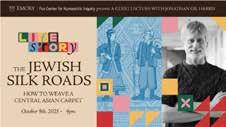
“The Jewish Silk Roads” with Jonathan Gil Harris – 4 to 5:30 p.m. Join the Fox Center for Humanistic Inquiry for a special guest lecture on “The Jewish Silk Roads: How to Weave a Central Asian Carpet,” featuring Jonathan Gil Harris, PhD, Professor of English at Ashoka University. RSVP at https://tinyurl.com/mprz734k.

Sukkot Celebration – Fall ’25 – 5 to 7 p.m. Celebrate Sukkot, the Festival of Booths, with a fun gathering at the MJCCA Sukkah in the new front courtyard. Delicious kosher food (available for purchase). Live Music. Eat in the JCC Sukkah. Activities & Crafts Free and Open to the Community. Learn more at https://tinyurl.com/2zvpcmcw.

Sisters in the Sukkot – 6 p.m. and 7 p.m. Join JWC Atlanta to Celebrate Sukkot. Register at https://tinyurl.com/ yupmyx4u.
Men’s Club Steak and Scotch Dinner in the Sukkah – 6:30 to 8:30 p.m. Everyone (Men and Women) are invited for a festive night in the Sukkah at Congregation Beth Shalom enjoying Steak, great Scotch, camaraderie, and ruach. Open to Adults 21 and older. Learn more at https://tinyurl.com/ jnytj4k9.
Atlanta Pride 2025 with SOJOURN!
- Please join our Jewish community in celebrating Atlanta Pride 2025! It’s one of Sojourn’s biggest joys every year to gather Atlanta’s Jewish community in support of Pride. Atlanta Pride 2025 is scheduled for October 10-12, and we’re thrilled to return to a full weekend of Jewish and LGBTQ+ excitement! Atlanta Jewish organizations and communities can sign up as Pride Partners to participate at https://tinyurl. com/4rhrdzp5.

Music and Play – 11 a.m. to 1 p.m. Let’s spark joy and curiosity through the magic of music and play! Jumpstart your morning with an upbeat, interactive music and movement class led by Here We Grow, where little ones can dance, wiggle, and sing their hearts out. Afterward, Nurture invites children into a world of themed sensory play and hands-on adventures — perfect for curious minds and messy fingers. Come ready to move, create, and make memories together! Learn more at https://tinyurl.com/2hjtnj9a.


M&M Family Shabbat at Etz Chaim – 6 p.m. Congregation Etz Chaim invites you to join us for our signature family-friendly Shabbat Service and fun! All are welcome. Please register at https://tinyurl.com/5y5kz8vk.

Tot Shabbat - 6 to 8 p.m. Tot Shabbat from Congregation Dor Tamid is a Shabbat Program geared for children (second grade and younger) to laugh, meet new children, make new friends, and explore the wonders of Judaism in an exciting fun way! The service is filled with songs, prayers, blessings, stories, snacks, and a place where a kid can be a kid when they pray to God. This service meets on selected Friday nights throughout the year at 6:00 pm. Each service is followed by a pot-luck Shabbat dinner. Parents are encouraged to model the behavior they would like to see in their own children. So remember: Come to Tot Shabbat ready to dance, sing, pray, and have fun. Tot Shabbat is geared toward children 4 and under. Learn more at https://tinyurl.com/w94ra3de.


Atlanta Pride 2025 with SOJOURN!
- Please join our Jewish community in celebrating Atlanta Pride 2025! It’s one of Sojourn’s biggest joys every year to gather Atlanta’s Jewish community in support of Pride. Atlanta Pride 2025 is scheduled for October 10-12, and we’re thrilled to return to a full weekend of Jewish and LGBTQ+ excitement! Atlanta Jewish organizations and communities can sign up as Pride Partners to participate at https://tinyurl. com/4rhrdzp5.

An Evening with Eli Sharabi – 8 to 10 p.m. In this raw and unflinching memoir, Eli Sharabi, a survivor of 491 days in Hamas captivity, recounts at the MJCCA the harrowing ordeal of his abduction from Kibbutz Be’eri on October 7th, 2023, the loss of his wife and daughters, and his unyielding resolve to survive. Purchase tickets at https:// tinyurl.com/3w5yf85p.

Sunday, October 12
Atlanta Pride 2025 with SOJOURN!
- Please join our Jewish community in celebrating Atlanta Pride 2025! It’s one of Sojourn’s biggest joys every year to gather Atlanta’s Jewish community in support of Pride. Atlanta Pride 2025 is scheduled for October 10-12, and we’re thrilled to return to a full weekend of Jewish and LGBTQ+ excitement! Atlanta Jewish organizations and communities can sign up as Pride Partners to participate at https://tinyurl. com/4rhrdzp5.

Sisters in the Sukkot – 6 p.m. Join JWC Atlanta to Celebrate Sukkot. Register at https://tinyurl.com/yupmyx4u.

Monday, October 13
Mensches in the Kitchen – 9:30 to 10:30 a.m. Mensches in the Kitchen is a joyful, hands-on series where toddlers explore Jewish values through food and play. Each week, little ones will engage in taste-safe sensory activities, simple cooking and sharing, and interactive storytelling — all designed to nurture kindness, gratitude, and care for the world around us. Grown-ups will take home easy ideas and blessings to bring Jewish learning into the kitchen and everyday life. Let’s raise kind, curious mensches—one sweet moment at a time. Register at https:// tinyurl.com/47rurahm.
High Holidays at Congregation Dor Tamid – 6 p.m. Join Congregation Dor Tamid for Erev Sukkot. Learn more at https://tinyurl.com/yhyj84m9.
Tuesday, October 14
High Holidays at Congregation Dor Tamid – 9 a.m. Join Congregation Dor Tamid for Sh’mini Atzeret/Simchat Torah Festival Morning Services and Yizkor. Learn more at https://tinyurl.com/ yhyj84m9.
Simchat Torah Dinner and Celebration – 6 to 9 p.m. Join Congregation Beth Shalom for a complimentary dairy dinner followed by singing and dancing with friends to celebrate Simchat Torah and the end of the High Holiday Season. Find out more at https://tinyurl.com/3st5vyum.

ATLANTA SYMPHONY HALL • PROGRAM 8:00 PM
PRESENTED IN PARTNERSHIP WITH MONDAY, OCTOBER 20, 2025


Ingredients
Salad
5 ounces arugula
1/2 cup cooked Pereg Quinoa
1 Persian cucumber, sliced into half moons
1 ounce Ta’amti Feta Cheese
1/4 red onion, thinly sliced
1 tablespoon sunflower seeds
Dressing
juice of 1 fresh lemon
3 tablespoons Gefen Olive Oil
2 cloves garlic, crushed or 2 cubes Gefen Frozen Garlic
1/2 teaspoon dried oregano, such as Gefen
1/2 teaspoon salt
Directions
1. Place arugula in a bowl. Top with quinoa. Grate feta cheese directly on top of salad. Add cucumbers, red onion and sunflower seeds.
2. Whisk together all dressing ingredients. Toss with salad.
Photo by James Stefiuk
Recipe by Victoria Dwek kosher.com


Freda and Mona were on a park bench enjoying the sunshine. They had been meeting in the park every sunny day for 12 years.
On this day, Freda turns to Mona and says, “Please don’t be angry with me, dear, but I am embarrassed, after all these years … what is your name? I am trying to remember but I just can’t.”
Mona stares at Freda, looking very distressed, and says nothing for two full minutes. Finally, with tearful eyes, she says, “How soon do you need to know?”
Adj. The quality of a person who wears worn out or old clothes as a fashion statement.
“There goes Hilda in her ripped jeans looking oh-sovoguish. I hear she buys them new and then has her maid rip them with pinking shears. Schmatta-chic!”
“Schmatta” is Yiddish for “rag.”

By: Yoni Glatt, koshercrosswords@gmail.com
Difficulty Level: Challenging

1. The book of Exodus, e.g.
5. The seventh day, for short
8. Son of Adam
12. Bracha follower
13. Words with dime or diet
14. It’s a cow
15. After G-d told Yonah to go to Nineveh he was ___ (1986 Billy Crystal) to a ship at Yaffo...
18. Not bright
19. Like a .295 batting average
20. Crosswords’ favorite pirate
22. ...while Yonah was sailing away, G-d sent ___ (2000 George Clooney) to stop him...
25. Starter of James Bond’s car?
26. The holy might have them
27. ...in order to save themselves the sailors threw Yonah ___ (1987 Goldie Hawn)
33. Code letters
36. Liberal, slangily
37. Scuffle
41. Take advantage of
42. ...it was then that Yonah was swallowed by a ___(2003 Ewan McGregor)...
44. More than stretch the truth
45. Prefix meaning “many”
47. Not kosher
49. ...ultimately Yonah went to Nineveh
and relayed ___ (1995 Christopher Walken) as instructed...
55. ...the people repented, fasted and received ___ (1972 Jon Voight) from G-d’s initial decree
56. It’s red in the Torah
58. One time Prime Minister and President of Israel
59. Correct type
62. “The West Wing” costar Rob
63. Guys who manage images, for short
64. They’re single by choice
65. Holding areas
66. “But she did scorn a present that ___ her” (Shakespeare)
67. Hwy. of a sort
1. Michelle Gellar and Jessica Parker
2. Trinket thought lucky
3. It’s flooded with DNA
4. Massachusett’s cape
5. Ben’s meaning
6. Journalistic slant
7. Not hard to grasp
8. Place for rest and exercise
9. They may be placed after piercings
10. Bit of a shake
11. City near Haifa
16. Haifa’s in it; Abbr.

This week, 100 years ago
Water famine in Jerusalem again becomes acute.
Dr. Judah L. Magnes resigns as chairman of the Board of Hebrew University over disagreement concerning representing HU at the 200th anniversary of the academy of sciences in Leningrad.
This week, 75 years ago
Staff Sergeant Isadore S. Jackman of Baltimore is posthumously awarded the Congressional Medal of Honor, only the second American Jew to receive one.
America sends a team of 36 athletes to the third-ever World Maccabiah games.
Beth Jacob, then Atlanta’s youngest congregation, hires their first full-time spiritual leader, Rabbi Josef Saffra.
This week, 50 years ago
Simone Veil, a Jewish Auschwitz survivor, becomes
France’s Minister of Health –the first woman to hold a cabinet position in the country’s history.
Jacques Back, long time Editor of the Nashville Jewish Observer, dies at 96 years old.
Chaplain (Captain) Samuel Sobel, the first rabbi to serve in the position of Chaplain, U.S. Marine Corps (a title equivalent to Chief of Chaplains), is awarded the Legion of Merit.

Staff Sgt. Isadore S Jackman, a Jewish paratrooper who lost his life in combat in Belgium during WWII.
Mr. and Mrs. Lock announce the engagement of their daughter, Mitzi, to David Geffen, grandson of Shearith Israel’s Rabbi Tobias Geffen.
Congressman Elliott Levitas announced to address opening dinner meeting for the Gate City Lodge, B’nai B’rith.
17. Chi. zone, in summer
18. Org. that might work on their annual calendar this time of year
21. Mincha and Maariv needs?
23. Stationery item, briefly
24. Riverdale Jewish HS
28. Priest punished by G-d
29. Gas pump spec.
30. Closest pal, in a text
31. Former Yeshiva HS in Queens
32. Positive votes (var.)
33. Droning sound
34. Nashville sch.
35. One might occur when losing it
38. Emphasized
39. “Fire!” preceder
40. Peg at the Masters
42. Jessica Timberlake’s maiden name
43. Battleship guess on the lowest row
46. These puzzles always have them
48. We all speak with one
50. Longstocking lass
51. Winnebago owners, for short
52. “Love, Reign ___” (The Who)
53. Get spruced up
54. Ain’t got
56. Swiss summit
57. She’s kosher
60. Seal as a deal
61. When doubled, an African fly
This week, 25 years ago
David and Jamie Sachs adopt daughter, Naomi Harriet Sachs.
Jonathan Levine, son of Mel and Tobi, has his bar mitzvah ceremony at Temple Beth Tikvah.
Steven Hecht, son of Jim and Lisa, has his bar mitzvah ceremony at Congregation Beth Shalom.
Guy and Susan Rappaport of Suwanee announce the engagement of their daughter, Joanna, to Jeremy Estroff, son of Ann-Toni and the late William.
Fourteen Jews head to Sydney Olympics as part of Team USA.
Or VeShalom wins synagogue softball championship. Issues of the AJT (then Southern Israelite) from 1929-1986 can be found for free online at https://gahistoricnewspapers. galileo.usg.edu/lccn/sn78003973/
Marilyn Goldstein Hurwitz, beloved mother and grandmother, passed away on Sept. 24, 2025, at the age of 94. She was born to the late Joseph and Dorothy Goldstein of Marietta, Ga. The family ran The Mill End Store for over 50 years. Marilyn had an eye for interior decorating. Marilyn’s greatest joy was her family. She was a devoted mother and grandmother. Marilyn will be deeply missed and forever held in the hearts of all who knew her.
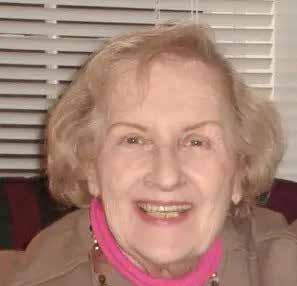
Marilyn is predeceased by her daughter, Bonnie Hurwitz Anderson. Marilyn is survived by her daughters, Jill Peers and Miriam Worth; grandchildren, Megan Murphy (Mark), Eric Worth, and Ryan Worth; and her four great-granddaughters. Arrangements by Dressler’s Jewish Funeral Care, 770-451-4999.


Betty Greenbaum Karp, beloved mother, grandmother, and friend, passed away peacefully on Sept. 20, 2025, in Atlanta, Ga., at the remarkable age of 101.
Born on Aug. 10, 1924, in Atlanta, Betty spent her entire life in the city she cherished. She was the daughter of Edward Greenbaum, who emigrated from Riga, Latvia, at the age of 16, and Mary Levin of Chicago, Ill. Betty’s mother died in 1926 when Betty was just two years old. She was lovingly raised by her father and extended family, who cared for the four Greenbaum children in their homes. Growing up during the Depression and losing her mother so young shaped Betty’s independence, resilience, and strength of character.
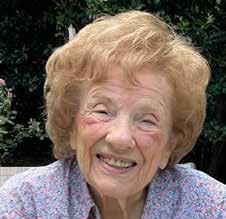
Betty was deeply devoted to her family and proud of her Jewish heritage, raising her children with strong traditions and values. Her home was always a place of welcome — filled with kindness, lively conversation, and wonderful meals. A woman of conviction, she was an unabashed liberal who cared deeply about justice, fairness, and community.
She was preceded in death by her beloved husband, Bernie Karp, who passed away too soon in 1988 at the age of 71, as well as by her brothers, Leonard and Irwin, and sister, Helen. She is survived by her children — Peggy (Maurice) Levitt, Larry (Rocio Rodriguez), Betsy, Ronnie (Ann Dolin) — and her granddaughter, Abigale Reisman (Charles Clements).
Betty’s life was a testament to strength of spirit and the power of love. She celebrated her 101st birthday this past summer, surrounded by family, marking not just the passage of time, but the profound impact she had on all who knew her.
A funeral service was held in Atlanta, Thursday, Sept. 25, 2025, 10 a.m., at Arlington Memorial Park, 201 Mt. Vernon Hwy, Sandy Springs, GA. In lieu of flowers, contributions may be made to the Weinstein Hospice, Jewish Family & Career Services or a charity of choice.
Betty will be remembered for her wisdom, warmth, generosity of spirit, and the legacy of love she leaves behind in the lives she touched across more than a century of living. Arrangements by Dressler’s Jewish Funeral Care, 770-451-4999
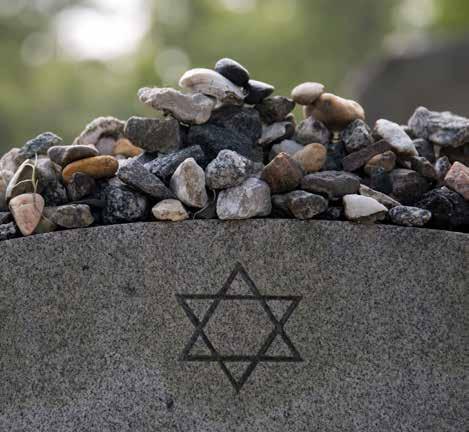
David Levy, 88 years old, of Atlanta, Ga., passed away on Sept. 12, 2025. David grew up in Atlanta and earned his undergraduate and law degrees at Emory University, and his LLM at Georgetown University. David is predeceased by his parents, Elsie and Meyer Levy, and his son, Robert William Levy. He is survived by his wife, Diane Levy, and his children, Jeffrey Levy (Lindsay), Danielle Levy (Andrew Schwartz), Margo Marks (Ben), Mitchell Haber (Lizzie), Cort Haber (Aimee), and daughter-in-law, Pauline Iacono, as well as his 11 beloved grandchildren.

David was passionate about the Atlanta Jewish community and served on several boards and committees, including the MJCCA, Jewish Federation of Greater Atlanta, Jewish HomeLife, and Emory University. David had a long career in the legal field, serving as General Counsel and a member of the Board of National Service Industries. In lieu of flowers, tribute donations may be made to the Marcus Jewish Community Center. The funeral was held at Crest Lawn Memorial Park: 2000 Marietta Blvd NW, Atlanta, GA 30318 on Monday, Sept. 15 at 12 p.m. Arrangements by Dressler’s Jewish Funeral Care, 770-451-4999.

Obituaries in the AJT are written and paid for by the families; contact Editor and Managing Publisher Kaylene Ladinsky at kaylene@atljewishtimes.com or 404-883-2130, ext. 100, for details about submission, rates and payments. Death notices, which provide basic details, are free and run as space is available; send submissions to editor@atljewishtimes.com.






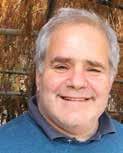
Rabbi Richard Baroff DD
The High Holy Days, which are almost upon us, are at the beginning and end of a 10-day period known as the aseret y’mey teshuvah --the Ten Days of Repentance.
Teshuvah (repentance) derives from the Hebrew root signifying to return, specifically returning to G-d. The Sabbath within this period - -Shabbat Shuvah -- is the special Sabbath of Repentance.
Another special day between the major holidays of Rosh Hashanah (Tishre 1 and 2) and Yom Kippur (Tishre 10) is Tzom Gedaliah -- the Fast of Gedaliah, which occurs usually Tishre 3. We read about the tragic death of Gedaliah in the
Bible, mostly in the Book of Jeremiah, also in 2 Kings.
The Babylonian king, Nebuchadnezzar, had just destroyed the Temple that King Solomon had constructed almost four centuries before. Many Judaeans had been exiled to Babylon; the year was 586 or 587 BCE. Nebuchadnezzar appointed Gedaliah as governor of Judaea, to rule over the population which remained. Those who remained were mostly poor farmers.
One Ishmael, a Jewish officer who had familial connections to the royal line in Jerusalem, conspired to kill Gedaliah with an armed group. The Ishmael group ostensibly came to Gedaliah in peace, but double-crossed the governor, murdering him and his retinue. The assassination of Gedaliah frightened the Judaeans and angered the Babylonian king.
Many Judaeans fled to Egypt to escape the wrath of King Nebuchadnezzar for Gedaliah’s murder, as the fear


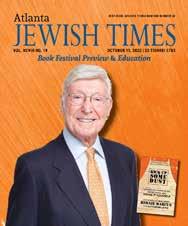


was that the Babylonian monarch would blame the remaining Jewish citizens for starting a rebellion. Indeed, this is what the Chaldean (Babylonian) king thought. In fact, Nebuchadnezzar sent even more hapless Judeans into exile, east to Mesopotamia, that is to Babylonia.
The great prophet Jeremiah warned the people not to escape to Egypt, but rather to stay in Judaea and submit to the Chaldeans, which was the will of G-d. It is ironic that Jeremiah himself eventually went to Egypt, where he died. And thus, our people were scattered to the east, to Babylon (modern Iraq) and west and south to Egypt. The great prophet Ezekiel went to Babylonia with most of the exiles, the equally great prophet Jeremiah into Egypt with many others. Only poor Judeans were left behind in the land.
Many centuries later in the Babylonian Talmud, in Tractate Rosh Hashanah, we read again about the tragic death of the Jewish governor Gedaliah, killed
by another Jew, Ishmael, of the royal line, for working for the Chaldean tyrant Nebuchadnezzar. But Gedaliah took the position on behalf of the Jewish people, and thus, the rabbis thought his murder a grave injustice, and yet another blow at that time to the Children of Israel. This blow, namely the assassination of the royal governor, took place very soon after the destruction of the first Temple in Jerusalem (the second would be razed by the Romans in 70 C.E.), the exile into Babylonia of many Jews, and the flight into Egypt of many more.
On this Tzom Gedalia/Fast of Gedaliah, let us remember how terrible are the results when Jew is set upon Jew, when we turn on each other. In our observance of this day, let us resolve to stay together, and work together, for a better future, as dark as these last two years have often been for the Jewish people.
L’shanah tova t’kateivu. May you all be inscribed in the Book of Life. ì














